#(because some of the original quotes are rather vague sounding in English)
Text
{Taichi Yagami} was someone who treated others {including at the school} without discrimination {unjust hatred or prejudice based on social status and class}. That {outlook} of Taichi's never changed {in that time}, even towards {Koushiro Izumi}.
-Digimon Adventure Novel (Summarized)/(Amended)
If it hadn't been for {Taichi continuing to treat Koushiro that way}, Koushiro {believed} Koushiro {might} have (read as: would not have) ever gone to the summer camp.
{The summer camp where the Chosen Children originally were dragged in to the Digital World, and met their partners.}

#taishiro#taishirou#taichi yagami#yagami taichi#koushiro izumi#izumi koushirou#izumi family#adopted koushiro#koushiro and adoptees discrimination#koushiros class as adoptee#izzyizumi summarizes#(Posting This To Make Points Maybe)#(But also because)#(at this rate I'll probably just have to resummarize the entire novel for people)#(which I'm honestly willing to try and do when I actually have more time {Likely more like next year})#(I was even thinking of recording my own version where I amend the dialogue to include light explanations like this)#(because some of the original quotes are rather vague sounding in English)#(and while yes in JPN there is a certain level of vagueness)#(I've noticed I've had to explain and reexplain these sections to people Ive met and chatted with about the novel over time)#(even just about a character like Taichis canonically described qualities)#(Taichi is CANON DESCRIBED as treating people WITHOUT {Unjust hatred or prejudice} aka discrimination AGAINST OTHER PEOPLE)#({THAT *INCLUDED* KOUSHIRO} KOUSHIRO WHO IS LEGALLY AN ADOPTEE)#(KOUSHIRO WHO IS OF A LOWER SOCIAL CLASS THAN TAICHI and while Taichi may at that canon point have had NO IDEA PERSONALLY)#(The reason Koushiro was drawn to attending the camp was BECAUSE TAICHI TREATED EVEN SOMEONE LIKE KOUSHIRO AS AN EQUAL)#(Even when Koushiro intentionally held back from speaking with most other kids and they likely picked up on that about Koushiro over time)#(IF TAICHI DID pick up on it Taichi may not have known WHY Koushiro was holding back from engaging with classmates)#(INCLUDING TAICHIS OWN SELF but Taichi must have eventually noticed SOMETHING about Koushiros self that got Taichi to invite Koushiro)#(because Taichi was willing to INCLUDE KOUSHIRO and HAD NO REASON TO ACTUALLY INVITE KOUSHIRO but DID)#(AND KOUSHIRO CANONICALLY ACKNOWLEDGES THIS)#(Koushiro RECOGNIZES that Taichi is treating Koushiro equally WITH KOUSHIRO KNOWING KOUSHIRO IS OF A LOWER LEGAL CLASS)
13 notes
·
View notes
Text
On fae/faer pronouns and cultural appropriation
HOW IT STARTED
I had a handful, a very small handful but more than two, responses in the Gender Census feedback box telling me that fae/faer pronouns are appropriative. The reasons didn’t always agree, and the culture that was being appropriated wasn’t always the same, but here’s a selection of quotes:
“Fae pronouns are cultural appropriation and are harmful to use“ - UK, age 11-15
“I’m not a person who practices pagan holidays but, my understanding is that pronouns like fae/faeself are harmful because the fae are real to pagans and is like using Jesus/jesuself as pronouns“ - UK, age 11-15
“I know you've probably heard this a million times, so has everyone on the internet, but the ''mere existence''of the fae pronoun feels really uncomfortable for some of us. I'm personally not against neopronouns like xe/xim, er/em and the like, I am a pagan but apart from the, imo most important, reasoning of that pronoun being immensely disrespectful, I worry as an nb about people who banalize the usage of pronouns ''for fun'', and I'm quoting what some people have told me.“ - Spain, 16-20
“I don't agree with fae/deity pronouns just from a pagan perspective it's very disrespectful to the cultures they come from. Like Fae are a legit thing in many cultures and they hate with a fiery passion mortal humans calling themselves Fae to the point of harming/cursing the people who do it“ - USA, age 16-20
“only celtic people can use far/ faers otherwise it’s cultural appropriation, many celts have said this and told me this“ - USA, age 16-20
So that’s:
❓ Someone who doesn’t say whether they’re pagan or Celtic.
❌ Someone who definitely isn’t pagan.
✅ Someone who is pagan.
❓ Someone who doesn’t say whether they’re pagan or Celtic.
❓ Someone who doesn’t say whether they’re pagan or Celtic.
So, just to disclose some bias up-front, I am English so I’m not Celtic, but I do live in Wales so I am surrounded by Celts. The bit of Wales that I live in is so beautiful in such a way that when my French friend came to visit me she described it as féerique - like an enchanting, magical land, literally “fairylike” or thereabouts. Coincidentally I have also considered myself mostly pagan for over half of my life, and I can’t definitively claim whether or not the Fae are “part of paganism” because paganism is so diverse and pick’n’mix that it just doesn’t work that way.
To me the idea that fae/faer pronouns would be offensive or culturally appropriative sounds absurd. But also, I am powered by curiosity, and have been wrong enough times in my life that I wanted to approach this in a neutral way with an open mind. Perhaps what I find out can be helpful to some people.
So since we only have information from one person who is definitely directly affected by any cultural appropriation that may be happening, the first thing I wanted to do was get some information from ideally a large number of people who are in the cultures being appropriated, and see what they think.
~
WHAT I DID
First of all I put some polls up on Twitter and Mastodon. [Edit: Note that this post has been updated with results from closed polls.]
I specified that I wanted to hear from nonbinary Celts and pagans, just so that the voters would be familiar with fae/faer pronouns. I asked the questions in a neutral way, i.e. “How do you feel about...” with “good/neutral/bad” answer options, instead of something more leading like “Is this a load of rubbish?” or “are you super offended?” with “yes/no” options. I provided a “see results” option, so that the poll results wouldn’t be skewed as much by random people clicking any old answer to see the results. And I invited voters to express their opinions in replies.
Question #1: Nonbinary people of Celtic descent (Ireland, Scotland, Wales, Cornwall, the Isle of Man, and Brittany), how do you feel about non-Celtic people using the neopronoun set fae/faer? [ It's good / No strong feelings/other / It's bad ]
Question #2: Nonbinary pagans, how do you feel about non-pagans using the neopronoun set fae/faer? [ It's good / No strong feelings/other / It's bad ]
The Twitter polls got over 1,100 responses each, and the Mastodon polls got over 140 responses each. With a little bit of spreadsheetery I removed the “N/A” responses to reverse engineer the number of people voting for each option, combined those numbers, and recalculated percentages.
Obviously this approach is not in the least scientific, but thankfully the results were unambiguous enough and the samples were big enough that I feel comfortable drawing conclusions.
Celts on fae/faer pronouns being used by non-Celts (561 voters):
It's good - 42.5%
No strong feelings/other - 44.0%
It's bad - 13.5%
Pagans on fae/faer pronouns being used by non-pagans (468 voters):
It's good - 47.2%
No strong feelings/other - 39.5%
It's bad - 13.3%
Here’s how that looks as a graph:
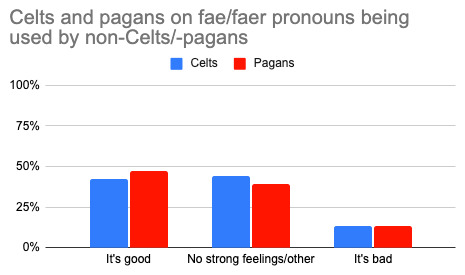
The limitations of polls on these platforms means that we have no way to distinguish between people who have more complicated views (”other”) and people who have “no strong feelings”, so we can’t really draw conclusions there. If we stick to just the pure positive and pure negative:
Celts were over three times as likely to feel positive about non-Celts using fae/faer pronouns than they were to feel negative.
Pagans were over three and a half times as likely to feel positive about non-pagans using fae/faer pronouns than they were to feel negative.
So Celts and pagans are way more likely to feel actively good about someone’s fae/faer pronouns, even when that person is not a Celt/pagan. That’s some strong evidence against the idea that fae/faer pronouns are appropriative, right there.
~
CORRECTIONS
To be clear, I haven’t done any research about the roots of fae/faer or the origins of the Fae and related beings, but my goal here was to get a sense of what Celts and pagans think and feel, rather than what an historian or anthropologist would say.
On the anti side, here were the replies that suggested fae/faer either is or might be inappropriate:
“I only worry that not everyone understands the origin of the word outside of modernized ideas of fairies.“ - pagan
“As a vaguely spiritual Whatever (Ireland), I think a mortal using "fae" as a pronoun/to refer to themselves is asking for a malicious and inventive fairy curse (on them, their families and possibly anyone in their vicinity, going by the traditions). I have not heard of this term before, so this is an immediate reaction from no background bar my cultural knowledge of sidhe/fae/term as culturally appropriate. My general approach is people can identify themselves as they want.“ - Celtic
So we’ve got a pagan who’s wary that people who use fae/faer (and people in general) might not have a fully fleshed out idea of the Fae. And we’ve got a Celt who doesn’t mind people using fae/faer personally, but based on what they know of the Fae they wouldn’t be surprised if the Fae got mad about it. No outright opposition, but a little concern.
There were not a lot of replies on the pro side, but not because people weren’t into it, judging by the votes. There were a lot of “it’s more complicated than that” replies, many of which repeated others, so quotes won’t really work. Here’s a summary of the Celtic bits:
“Fae” is not a Celtic word, and Celts don’t use it. It is French, or Anglo-French.
“Fae” can refer to any number of stories/legends from a wide variety of cultures in Europe, not one cohesive concept.
There are many legends about fairy-like beings in Celtic mythologies, and there are many, many different names for them.
The Celts are not a monolith, they’re a broad selection of cultures with various languages and various mythologies.
And the pagan bits:
Paganism is not closed or exclusive in any way. It might actually be more open than anything else, as “pagan” is a sort of umbrella term for non-mainstream religions in some contexts. A closed culture would be a prerequisite for something to be considered “appropriated” from paganism.
From my own experience, pagans may or may not believe in the Fae, and within that group believers may or may not consider the Fae to be sacred and/or worthy of great respect. (I’ve certainly never met a pagan who worshipped the Fae, though I don’t doubt that some do.)
And then we get into the accusations. 🍿
“this issue wasn’t started by Celtic groups or by people who know much about Celtic fae. It was started primarily by anti-neopronoun exclusionist pagans on TikTok.“
“[I’m] literally Scottish [...] and it’s not appropriative in the least and honestly to suggest as such is massively invalidating towards actual acts of cultural appropriation and is therefore racist. Feel like if this was actually brought up it was either by some people who seriously got their wires crossed or people who are just concern trolling and trying to make fun of both neo-pronouns and of the concept of cultural appropriation and stir the pot in the process.“
“It wouldn't be the first time bigots falsly claim “it's appropriative from X marginalized group" to harass people they don't like, like they did with aspec people when they claimed "aspec" was stolen from autistic language (which was false, as many autistics said)“
“It's been a discussion in pagan circles recently ... People were very quick to use the discussion as an excuse to shit on nonbinary people.“
“I think it would be apropos to note that the word "faerie/fairy" has been a synonym for various queer identities for decades, too. The Radical Faeries are a good example.“ (So if anyone has the right to [re]claim it...)
A little healthy skepticism is often wise in online LGBTQ+ “discourse”, and some of these people are making some very strong claims, for which I’d love to see some evidence/sources/context. Some of it certainly sounds plausible.
~
HOW DID IT START?
I had a look on Twitter and the earliest claim I can find that fae/faer pronouns are cultural appropriation is from 18th February 2020, almost exactly one year ago today. Again, tweets are not the best medium for this, there was very little in the way of nuance or context. If anyone can find an older claim from Twitter or Tumblr or anywhere else online, please do send it my way.
I have no idea how to navigate TikTok because I’m a nonbinosaur. (I’m 34.) I did find some videos of teens and young adults apparently earnestly asserting that they were Celtic or pagan and the use of fae/faer pronouns was offensive, but the videos were very brief and provided nothing in the way of nuance or context. For example:
This one from October 2020 with 29k ❤️s, by someone who I assume is USian based on the word “mom”?
This one from December 2020, that says “I am pagan and i find it rather disrespectful. It’s like using god/godr or jesus/jesusr.” That’s probably what inspired the feedback box comment above that refers to hypothetical jesus/jesusr pronouns.
If anyone is able to find a particularly old or influential TikTok video about fae/faer pronouns being appropriative I’d really appreciate it, especially if it’s from a different age group or from not-the-USA, to give us a feel for how universal this is.
For context, fae pronouns were mentioned in the very first Gender Census back in May 2013, though you’ll have to take my word for it as the individual responses are not currently public. The word “fae” was mentioned in the pronoun question’s “other” textbox, and no other forms in the set were entered so we have no way of knowing for sure what that person’s full pronoun set actually is. This means the set may have been around for longer. The Nonbinary Wiki says that the pronoun set was created in October 2013, as “fae/vaer”, later than the first entry in the Gender Census, so I’ll be editing that wiki page later! If anyone has any examples of fae/faer pronouns in use before 2013 I would also be very interested to see that.
~
IN SUMMARY
Obviously I can’t speak for everyone, as the Twitter polls are not super scientific and they only surveyed a selection of Celts and pagans within a few degrees of separation of the Gender Census Twitter and Mastodon accounts, but I can certainly report on what I found.
For a more conclusive result, we’d need to take into account various demographics such as age, culture, location, religion, race/heritage, etc.
As far as I can tell based on fairly small samples of over 400 people per group, a minority of about 13% of Celtic and/or pagan people felt that use of fae/faer pronouns is appropriative.
A much higher number of people per group felt positive about people who are not Celts or pagans using fae/faer pronouns. The predominant view was:
It can’t be cultural appropriation from Celtic cultures because fairy-like beings are not unique to Celtic cultures and Celtic cultures don’t call them Fae.
It can’t be cultural appropriation from pagan cultures because paganism is not “closed” or exclusive in any way, it’s too broad and open.
~
If your experience of your gender(s) or lack thereof isn’t described or encompassed by the gender binary of “male OR female”, please do click here to take the Gender Census 2021 - it’s international and it closes no earlier than 10th March 2021!
2K notes
·
View notes
Text
On racial stereotyping of the Haans in TMA...
Right so as someone who is ethnically Chinese I have NO FUCKING clue how I didn’t notice this more distinctly in my initial binge of tma (going too fast and not paying closer attention to character names and descriptions, probably) but the Haan family storyline is, all horror elements aside, pretty fucked up in terms of racial representation re: stereotyping. This got long as hell, but please please please take a moment to read through if you’ve got time for it. thanks.
To start off, the Haans are one of the few characters in tma with an explicitly specified race and ethnicity—Chinese—and pretty much the only explicitly Chinese characters in tma, other than the mostly unimportant librarian (Zhang Xiaoling) from Beijing. But like, Haan isn’t even a properly Chinese surname, at least not in the way that it’s spelled in canon (it should be Han, one a. A quick google search tells me that Haan as a surname has...Dutch origins??).
Of course, that could be chalked up to shoddy anglicization processes within family histories, which certainly isn’t uncommon with immigrant families, so I’m not going to dwell on names too much (although I also find it interesting that John Haan’s name is so specifically and weirdly anglicized that he changed his own surname?? Hun Yung to John Haan is a very big leap of a name change and frankly not very believable. ANYWAY, this is not that important. I don’t expect Jonny, a white Englishman, to come up with perfectly unquestionable non-Cho-Chang-like Chinese names, though it certainly would be nice. Moving on).
What really bothers me about the Haans is how they almost exclusively and explicitly play into negative Chinese immigrant stereotypes. I don’t even feel like I need to say it because it’s like...it’s literally Right There, folks. John Haan (in ep 72) owns and operates a sketchy takeout restaurant. They’re all avatars of the Flesh—and John Haan is Specifically horrific and terrifying because he cooked his wife’s human meat and fed it to his unknowing customers. Does that remind you of any stereotypes which accuse Chinese people of consuming societally unacceptable and ethically questionable things like dog/cat/bat meat (which, if it’s not already crystal fucking clear, we don’t. do that.), which in turn characterize us as horrible unfeeling monsters? John Haan’s characterization feeds (haha, badum tss) directly into this harmful stereotype that have caused very real pain for Chinese people and East Asians in general.
And Jonny does nothing to address that from within his writing (and not out of it either). And, speaking on a more meta level, Jonny could’ve easily had these flesh avatars be individuals of any race (like, what’s Jared Hopworth’s ethnicity? Do we know? No? Well then). Conversely, he could’ve easily, easily had a Chinese person be an avatar of any other entity. So why did he have to chose specifically the Flesh?
(This is a rhetorical question. You know why. Racial stereotyping and invoking a fear of the other in an attempt to enhance horror, babey~)
On Tom Haan’s side, Jonny seems weirdly intent on having other characters repeatedly comment on his accent (or rather, lack thereof) in relation to his race. Think about how, in ep 30 (killing floor), the fact that Tom Haan had spoken a line to the statement giver in “perfect English” was an emphasized beat in that statement, and a beat that was supposed to be “chilling” and meant to signify to us that something was, quote-unquote, “not right” with Tom Haan. Implicitly, that’s saying that it was unexpected, not “normal”, and in this case even eerie, for someone who looks Chinese to have spoken in fluid, unbroken English. Mind you, the line itself was perfectly scary on its own (“you cannot stop the slaughter by closing the door”), so why did Jonny feel the need to note the accent in which it was spoken in? Why did Jonny HAVE to have that statement giver note, that he initially “wasn’t even sure how much English [Haan] spoke”?
This happens again in episode 72 with a Chinese man (and again, his ethnicity is Explicitly Noted) who we assume is also Tom Haan. This one is rather ironically funny and kind of painfully self aware, because the statement giver expresses surprise at Haan’s “crisp RP accent” and then immediately “felt bad about making the assumption that he couldn’t speak English,” and subsequently admitted that thought was “low-key racist.” Like, from a writing perspective, this entire passage is roundabout, pointless, and says absolutely nothing helpful to enhance the horror genre experience for listeners (instead it just sounded like some sort of half-assed excuse so Jonny or other listeners could say “look! We’ve addressed the racism!” You didn’t. It just made me vaguely uncomfortable). And again, having other people comment on our accents/lack thereof while assuming we are foreign is a Very Real microaggression that east asians face on the daily. If Jonny needed some filler sentences for pacing he could’ve written about Literally anything else. So why point out, yet again, that the crazy murderous man was foreign and Chinese?
At this point, you might say, right, but yknow, it was just that the statement givers were kind of racist! It happens! Yeah sure, ok, that’s a passable in-universe explanation for descriptions of Tom Haan (though not John Haan, mind you), but the statement givers are fake made up people, and statement’s still written by Jonny, who absolutely has all the power to write overt discrimination out of his stories. And he does! Think about just how many minor (and major!!) characters are so, so carefully written as completely aracial, and do not have their ethnicity implicated at all in whatever horrors they may or may not be committing. Think about how many lgbtq+ characters have given statements, and have been in statements, without having faced direct forms of discrimination, or portrayed as embodying blatant stereotypes in their stories (though lgbtq+ rep in tma certainly has their own issues that I won’t go into here). Jonny can clearly write characters this way, and he can do it well. So why, why, am I being constantly, repeatedly reminded in-text of the fact that the Haans are East Asian, that they’re from China, that they’re Chinese immigrants, that they’re second-generation British Chinese or whatever the fuck, and that they’re also horrifying conduits for blood, gore, and general fucked-up-ness? It’s absolutely not something that is Needed for the stories to be an effective piece of horror; the only thing it does is perpetuate incredibly harmful and hurtful stereotypes.
And listen, I love tma to bits. It’s taken over my blog. I’ve really loved my interactions with the fandom. And I am consistently blown away by Jonny’s writing and how well he’s able to weave foreshadowing and plot into an incredibly complex collection of stories. But I absolutely Cannot stop thinking about the Haans because it’s just. It’s such a blatant display of racial stereotyping in writing. And I’ve certainly seen a few voices talking about it here and there, and I don’t know if I’m just not looking in the right places, but it certainly feels like something that is just straight up not on the radar for a lot of tma fans. And I’m disappointed about that.
Just, I don’t know. Take a look at those episodes again and do some of your own thinking about why these characters had to be specifically Chinese (answer: they didn’t.). And in general, PLEASE for the love of god turn a critical eye on character portrayals and descriptions whenever they are assigned specific races/ethnicities (Some examples that come to mind are Jude Perry, Annabelle Cane, and Diego Molina), because similar issues, to an extent, extend beyond the Haans, though I haven’t covered them here.
You shouldn’t need a POC to do point out these problems for you when they’re so glaringly There. But for those of you who really didn’t know, hope this was informative in some way. I’m tired, man. If some of the only significant Chinese characters you write are violent cannibalistic men with a perverted relationship with meat, just don’t do it. Please don’t do it.
EDIT: Since the making of this post Jonny has acknowledged and apologized for these portrayals on his twitter and in the Rusty Quill Operations Update, which went up September 2020. A long time coming, but better late than never. This of course doesn’t necessarily negate the harm done by Jonny’s writing, and doesn’t make me much less angry about it, but is appreciated nonetheless. For more on this topic there’s a lot of productive discussions happening in my “#tma crit” tag and in the notes of this post
#tma#the magnus archives#magnuspod#tma 30#tma 72#tma crit#racism#sinophobia#racist stereotyping#tw cannibalism#tw violence#long post#tom haan#john haan
3K notes
·
View notes
Text
Digimon Data Squad Dub Comparison Episode 1 - There Are Monsters Among Us!
This is a companion to my commentary on the original Japanese Digimon Savers! Reading my commentary on the original version of this episode (which you can find here) is recommended before reading this dub comparison.
Original name ~ Dubbed name
Masaru Daimon ~ Marcus Damon
Yoshino Fujieda ~ Yoshino “Yoshi” Fujieda
Captain Rentarou Satsuma ~ Commander Richard Sampson
[Since several characters share the same name between the original and the dub, quotes from the dub will always be in italics, while quotes from the original will not, in order to distinguish them.]
First off, can we talk about the characters’ dub names? The dub doesn’t actively draw attention to its setting much (but then again neither does the original, really), but it also does not change the fact that this is taking place in Japan and these characters are actually Japanese, despite that we’re hearing them speak English. Some of them keep their Japanese names, too, even if maybe they have slight shortenings of them to be easier for a Western audience to remember. But then some characters’ names are randomly changed to completely English ones, even though these characters are apparently still meant to be Japanese and living in Japan. It’s just strange – if they’re okay with keeping some of the Japanese names, why not keep all of them?
(Honestly, despite my complaints, I am kind of a little glad that they changed Masaru’s name in the dub, because Marcus comes across somewhat of a different character to Masaru for reasons I will be discussing at length. In that sense, it’s convenient to have different names to differentiate them by.)
Kudamon: “He’s a renegade to begin with. We have no choice but to dispose of him.”
~~~~~
Kudamon: “The target is a renegade. We must catch him before he gets out.”
This is actually more reasonable than what Kudamon says here in the original.
Satsuma: “The only ones who can keep Digimon under control… are Digimon!”
~~~~~
Sampson: “Only a high-level DATS agent can capture a Digimon.”
The original version of this line was already awkwardly expositiony, sure, but this one just doesn’t make as much sense. The point is not that Yoshi is a high level DATS agent, but that she has a Digimon partner.
The dub completely replaces the original’s soundtrack. I did a shoutout to the BGM here in the original, and I also want to do a BGM shoutout here in the dub! This piece here is very different sounding from Provocation Infinity but still gives a similar sort of actiony gung-ho feel appropriate for Marcus and Agumon being fighty dorks, and I like it. It’s used often enough in moments like this such that it’s the only dub theme aside from the evolution theme that I’ve become able to pick out and recognise the melody of, even though this is only my second time watching the dub. Though I don’t know what the dub soundtrack’s titles are (actually, after having a look, it seems like the dub OST was never released, so nobody does), I like to think that this one is probably Marcus’s theme based on the moments its used in, so I’m going to be calling it Probably Marcus’s Theme.
Marcus: “This is my training ground!”
This park is apparently specifically his “training ground”, even though it’s just an ordinary park that anyone can visit. Um, okay? (More on this at the end of this episode.)
Masaru: “I’m the number one street fighter in Japan, Daimon Masaru-sama!”
~~~~~
Marcus: “One day, I’m gonna be a champion ultimate fighter!”
They’ve changed “street fighter” to “ultimate fighter”, which, okay, makes him come across a bit less like a delinquent, fair enough. But a noteworthy difference is that he’s only trying to be the best ultimate fighter. Masaru, on the other hand, feels like he already is Japan’s number one street fighter. This change still sounds fine and in-character enough on the surface, but it’s a meaningful distinction that will become quite relevant further in as we get more into Masaru’s character, so keep this in mind.
Marcus: “Fans all over will chant my name! They’ll say, ‘Marcus Damon is the best!’”
I get that what the dubbers are going for here is something equivalent in spirit to Masaru using -sama on himself. But there’s other, simpler ways to do that – just have him call himself “the great Marcus Damon”, or something like that.
As it is, what they’ve done here is make it seem like, apparently, Marcus has fans, or at least he wants to have fans. Which is not even remotely the point of his fighting thing in the original, nor will it be in the dub, either. He’s not doing this for recognition from others; this is something he’s doing entirely for himself.
Yoshi: “Raptor-1 can talk…?”
This was not a thing implied in the original – that apparently, Yoshi (and presumably therefore everyone else at DATS) hadn’t even heard Agumon talk until now. I guess they’re going for giving more of an explanation as to why DATS treated him like a monster, but I find it difficult to buy that Agumon really wouldn’t have said at least some stuff while trapped at DATS HQ. (“I’m hungry,” if nothing else, right?)
Lalamon: “Yoshi, he’ll destroy the human!”
Oh, boy. This is one of those English dubs that refuses to directly acknowledge the concept of death because apparently the poor kiddies can’t handle that or something. I will attempt to not rag on it every time it does so – only because that’d get really boringly repetitive – but I will be talking about it a lot in future episodes when death becomes quite a story-important thing that is happening.
For now, let’s just point out that it sounds really silly to talk like a human can be “destroyed”. There’s plenty of other ways to get across that Agumon is dangerous without directly referencing death that would sound more natural.
Marcus: “Then I’ll knock you out like I did these guys!”
Masaru did not mention the fact that he was responsible for beating up all the dudes this early on. I guess here in the dub, Yoshi just isn’t paying proper attention, because she’s going to continue to assume it was Agumon who hurt all the students.
Kudamon: “He’s too dangerous.”
~~~~~
Kudamon: “We cannot let this escalate.”
I am sad that the dub lost the fun “who’s too dangerous?” double meaning of Kudamon’s original line.
Yoshino: “Hey, you! Get away from him! You’ll only lose if you fight him!”
Masaru: “Huh? This isn’t about win or lose! This is about fighting man-to-man!”
~~~~~
Yoshi: “You can’t fight that creature! He’s too dangerous!”
Marcus: “Huh? Look, toots, I’m the dangerous fighter here! And I don’t need any babysitter to hold my hand!”
We really, really did not need Marcus being vaguely misogynistic by calling Yoshi “toots”, or by implying that she’s nothing but a babysitter. We really didn’t.
This also replaces Masaru’s original line that has that fun aspect of him not even caring about winning and just wanting to have a good challenging fight with a worthy opponent, so we lose that, too.
(Though, ignoring the misogyny, I do enjoy Marcus responding to “he’s too dangerous!” with “hey, I’m dangerous”.)
Agumon: “Yeah! It’s man-to-man!”
~~~~~
Agumon: “That’s right! This is between him and me!”
Agumon then also isn’t able to agree about this being man-to-man, and this just becomes a less interestingly nuanced “stay out of our fight”, rather than really about the kind of fight they want to have.
Masaru: “Got it? Now stay out of this!”
~~~~~
Marcus: “This is a fight between men, so stay out of it!”
Having removed Masaru’s reference to men a few lines earlier, the dub does something which is going to be extremely rare by its standards and actually adds in a reference to men here. …Unfortunately, because they’d also added in Marcus’s random misogynistic lines earlier, this comes across much more like it’s about gender, and he’s just essentially saying “we don’t want any girls in our fight”. Which, no. Masaru talking about manliness is never actually that much about gender at all, despite the word he uses.
Masaru: “I see you’re pretty brave.”
~~~~~
Marcus: “I dunno what you are, but you’re goin’ down!”
We lose the sense of Masaru having respect for Agumon challenging him in place of some basic I’m-better-than-you trash talk. And this also adds in Marcus calling Agumon a what, rather than a who, indicating that apparently Marcus is paying some attention to Agumon’s species and is seeing him, at least a little, as not quite worthy of the same respect as a human.
After their big cross-counter…
Agumon: “I wasn’t ready. But you won’t get me this time!”
~~~~~
Agumon: “Hey! I wasn’t ready! I was waitin’ for you to say, ‘One, two, three, go!’”
The dubbers completely missed the point of the original, “I wasn’t ready.” Original-Agumon’s line comes across as “I wasn’t expecting you to be that strong, but now I’ve got the measure of you”, like he’s gained more respect for Masaru’s strength. Meanwhile dub-Agumon is just whining and acting like Marcus totally cheated rather than acknowledging his unexpected strength.
Agumon kicking Marcus in the crotch is cut, replaced with a rather cheesy-looking comic book POW sort of effect across the whole screen.
There’s a cute acoustic guitar BGM here for their bonding moment that I like, especially after recognising its melody and realising that this is a variation on Probably Marcus’s Theme! That seems very appropriate.
Agumon: “You’re… pretty good… for a human.”
Geez, what a backhanded compliment. Apparently dub-Agumon still sees Marcus as below him simply because he’s human, rather than fully acknowledging his strength regardless of species.
Agumon: “Let’s call it a draw.”
This line fills a silence, stating something that was already perfectly well implied in the first place by the fact that they’re no longer fighting and yet there’s no clear winner. It shouldn’t need to be said. In fact, it makes it seem a lot more like this fight really was just about winning or losing to both of them, when in the original that was never the point.
Rather than “Aniki”, which, okay, works fine in subs but can’t really be kept in a proper official English dub, Agumon calls Marcus “Boss”. I guess this is acceptable, but I feel like it would have been better for them to lean into the “big brother” meaning of aniki, rather than the “boss” one, for reasons I will be grumbling about a lot.
Masaru: “Aniki?”
Agumon: “Yeah. You’re the first person to acknowledge me as a full-fledged individual, Aniki.”
~~~~~
Marcus: “Boss?”
Agumon: “Yeah. Y’see, you’re the only guy who’s ever matched me blow-for-blow in a fight before.”
So, in this version, Agumon gaining respect for Marcus has absolutely nothing to do with Marcus treating him like a person. It’s just because of his strength, nothing else. Way to lose that really fun little bit of nuance and character depth on both sides.
(Also, what does Agumon even mean, “before”? It’s not like he’d have been able to have proper fights that weren’t just defending himself while trying to escape until now.)
Agumon: “That’s why, from now on, I’ll be your follower!”
~~~~~
Agumon: “That makes you the boss. From now on, you give the orders and I’ll faithfully follow!”
Matching Agumon in a fight shouldn’t really suddenly make Marcus the boss who gets to order him around, should it? Plus, here’s Agumon explicitly saying Marcus can give him orders, which was not at all part of the arrangement originally. This whole thing has such a different tone to “you treated me like a person when nobody else did, so now I look up to you and will be loyal to you.”
Marcus: “I never thought one day that I’d have an employee that’s as funny-lookin’ as you are.”
Oh, boy. Meanwhile, instead of “follower”, we have… employee. That is even more completely missing the point of the aniki-and-follower relationship of the original. If they didn’t like the gang connotations of “boss”, maybe they should have gone for “big bro” instead, perhaps? But no, they just doubled down on the “boss” in a totally different and inappropriate direction. Marcus has apparently just started up a small business.
The heartwarming BGM gets a record scratch as Yoshi reminds them she’s still there. I admit, it made me chuckle.
Yoshi: “So, are you gonna come quietly, or do I have to use force?”
Marcus: “Who’s she talkin’ to, you or me?”
I do enjoy this – a little implication that Marcus has some experience with being treated in a similar way, perhaps by the regular police.
Masaru: “It’s the aniki’s job to look after his follower. I’m not handing him over to you!”
~~~~~
Marcus: “I’ve never had an employee before, and I’m not turning my only one over to you!”
Instead of Masaru doing this out of feeling like it’s an aniki’s responsibility, Marcus is making it about himself. He doesn’t want to lose his new and only employee. Like Agumon’s just a possession of his now. Nothing about how this is something that should be expected of him as a boss.
Later, at the tower, as Agumon asks Marcus to help him evade DATS:
Marcus: “What am I getting myself into this time?”
I enjoy this too. More implications that Marcus is used to getting himself into all sorts of Trouble.
Agumon: “I’m starved!”
Marcus: “Well, suck it up and act like a real man!”
Again with the dub adding in references to manliness that weren’t there originally, as if Marcus actually has a concept of manliness that will continue to be a running theme. Haha, I wish. Get ready for me complaining about the exact opposite of this in basically every other dub episode.
Agumon: “I’m a growing boy!”
How does Agumon even know this phrase? This is an entirely human concept. Dub Agumon will be doing a lot of this, awkwardly invoking human ideas that he shouldn’t have any conception of.
Yoshi: “Yum. I love chocolate pudding – it reminds me of being a little kid again!”
Yoshino’s coffee jelly gets localised into chocolate pudding, because I guess coffee jelly is more of a Japanese thing that Westerners might be unfamiliar with? I enjoy the added detail that it reminds her of being a kid and that’s why she likes it.
Masaru: “I don’t know anyone by that name!”
~~~~~
Marcus: “I have no idea who this ‘Raptor-1’ is!”
Marcus’s line loses the technically-not-lying and respecting-Agumon’s-identity of the original line. He does know who this “Raptor-1” that Yoshi’s talking about is, even if that isn’t actually his name.
Masaru: “How’d you know my name?”
Yoshino: “You yelled it out earlier for everyone to hear.”
~~~~~
Marcus: “How do you know my name, anyway?”
Yoshi: “I know everything about you.”
No pointing out that he yelled it out earlier like a huge dork. Instead, she just really leans into the DATS-are-creepily-authoritative vibe that she already had a little of in the original.
Yoshi: “Born April 2nd in Tokyo, blood type B, Ootori middle school eighth grade.”
Him being born in Tokyo was not a detail mentioned in the original. And also probably not true in the original, since the series is set in Yokohama and there’s no indication that his family moved here. The dub is presumably still set in Yokohama even though it’s never mentioned, just because the scenery is that of Yokohama, so I guess they’ve just established some dub-only canon that the Damon family moved home at some point. This will actually come up briefly later. I am shocked that I’m saying this.
At least, props to the dub for mentioning Tokyo and making it pretty overt that, yes, this is set in Japan. (You know, with this Japanese guy called Marcus.)
Yoshi also does not explicitly specify Marcus’s age, only that he’s in eighth grade. Which (I’m pretty sure, though I’m unfamiliar with American school grades and may be wrong) would make him fourteen anyway, at least assuming he hasn’t been held back at any point. Keep this in mind, because this will also come up later.
Yoshi: “…and you now live with your mother Sarah and your little sister Kristy, who looks up to you even though you generally act like a jerk.”
First of all, how the hell does DATS have so much information that they even know how his sister feels about him?
Second of all, more importantly, way to just tell us that, hey, did you know, Marcus is A Jerk, hey, guys, you’re supposed to think he’s a jerk, because… he fights things, I guess?
The reality? Masaru is not a jerk. Not even slightly. He’s reckless and hot-headed and will fight anything that poses a challenge, but that is not even remotely the same thing as being a jerk to people.
But apparently the dub doesn’t understand this, and they seem to think that being a jerk is somehow meant to be one of his most noticeable character traits. And I guess they’re trying to present the idea that he’s going to slowly grow into being a nicer person through the power of Digimon and friendship? Which is not at all any kind of arc that Masaru is going to have, because he is not actually a jerk in the first place.
If it was just this one line that seemed to think this, I wouldn’t be that annoyed. But one of the biggest things I’m going to be complaining about with the dub is the fact that they actually do change Marcus’s character significantly to make him noticeably more of a jerk than Masaru ever was. We’ve already seen a little bit of this sort of thing going on so far in this episode, with how they’ve removed focus from the bits with Masaru treating Agumon like a person and instead made it all about fighting, and specifically winning those fights. But, oh boy, there’s going to be a lot more, to an extent that it has to be deliberate.
And aside from me just finding this very frustrating as someone who deeply loves Masaru’s character to see him distorted like this, I also can’t help but boggle at why they would ever want to do this at all. Why would you deliberately adapt a character – the main character – to be less likeable than in the original version of the work? How does it not occur to you that this is only going to make your new audience enjoy the work less? I do not get it.
Lines like this one here are even worse, because they blatantly violate “show don’t tell”. Along with making Marcus act like a jerk and showing us that, the dub’s narrative is also telling us that he’s a jerk and insisting we should think that about him instead of letting us make up our own minds. It’s so lazy and heavy-handed. There will be more like this and I do not like it one bit.
Yoshi: “I’m with the Digimon Data Squad.”
I guess the Data Squad really is its full name in the dub. Even though the acronym is still DATS. Don’t ask me how that’s meant to work.
Marcus: “That’s a great story, dollface, but what’s it gotta do with me?”
Can we not with the Marcus being casually misogynistic? Can we not? (Thankfully, this isn’t going to be a recurring thing. Other ways in which Marcus is being made less likeable will be, but at least not this.)
Marcus does not say anything about assuming Agumon was just a frog. Since Masaru having thought that is going to be relevant again later in the series, this is a loss of not just a moment of amusing dorkiness but something actually meaningful.
(One thing that is very clear about the dub is that, with a few exceptions, they do not appear to have watched ahead to see the whole series first and are just dubbing episode-by-episode. For a series like this with quite a strong overarching plot and lots of little things like this that get callbacks, that means that a lot of this overarching sense of cohesiveness will be lost, simply by accident, because they didn’t realise there was something important there worth keeping around. This is another thing I will be talking about a lot.)
Yoshino: “As long as you keep running from DATS, Raptor-1 will only starve to death.”
~~~~~
Yoshi: “If you don’t return Raptor-1 to us, he’ll starve to death!”
This is a little different. Yoshino was only trying to get Masaru to come to DATS, supposedly to pick up some Digimon food. Yoshi, meanwhile, wants Marcus to bring Agumon to DATS. Which on the one hand is a more helpful strategy for what she’s trying to achieve. But on the other hand, he doesn’t bring Agumon, because obviously the dub can’t change the episode that much, so instead we’re just left with that awkwardly not being what happens despite it being brought up.
Yoshino: “You…”
~~~~~
Yoshi: “Thank you.”
The hint that Yoshino is gaining a new respect for Masaru from his desire to help Agumon gets lost here, in favour of simply a thanks-for-finally-co-operating. Might partly be just lip-flap’s fault – the Japanese “you” is two syllables – but still, Yoshi’s tone of voice could at least have done some of the work to imply the same as the original, and it doesn’t really.
Kudamon: “This is the boy that put Raptor-1 under control? He doesn’t appear to have any special power, at any rate.”
~~~~~
Kudamon: “Interesting that this is the boy who fought Raptor-1, because nothing about him indicates that he’s able to fight at that level.”
We lose any implication that Satsuma might have been telling Kudamon things about Masaru offscreen, and instead here’s dub-Kudamon simply refusing to believe the evidence of his own eyes. You literally watched him fight Agumon on your screen. He very evidently can fight at that level.
Kamemon: “Enjoy.”
Marcus: “I’m not thirsty.”
Kamemon: “Suit yourself.”
Kamemon actually says words in the dub as he brings Marcus tea! This was very bizarre to me when I’m used to original-Kamemon, who almost never speaks at all.
Masaru: “Just hand over what I came for.”
~~~~~
Marcus: “Just say what ya have to say and stop wasting my time!”
Apparently the dub has forgotten that Marcus only came here to pick up Digimon food for Agumon, and suddenly he expects to be receiving a speech here when he shouldn’t.
Masaru: “Renegades?”
Kudamon: “Yes. Raptor-1 has already entered the human world and injured humans. He cannot be allowed to go free.”
~~~~~
Marcus: “Why are you calling him a renegade?”
Kudamon: “Because Raptor-1 has already entered the human world and made contact with human beings, so he can no longer be allowed to go free.”
I would complain that it’s a bit much that Agumon’s getting in so much trouble simply for meeting humans in the dub, and not specifically injuring them like they were assuming in the original. But, as it turns out, the original is also going to call Digimon simply meeting humans a “crime” in the next episode, possibly as part of its early weirdness. So, eh, this isn’t really the dub being any sillier than the original here.
Satsuma: “Daimon Masaru, you should work with us to create a bright future for both humans and Digimon!”
~~~~~
Sampson: “Please co-operate. The future relationship between humans and Digimon depends on you returning Raptor-1 to us.”
Also, apparently Sampson isn’t actually trying to recruit Masaru to join DATS with this speech. I can understand the logic behind changing that, since Satsuma was going about that whole thing weirdly vaguely.
That said, saying that the entire relationship between the two species hinges on this one Digimon being returned doesn’t make any sense. So I get the feeling that the implication of what Satsuma really wanted in the original line just went completely over the dubbers’ heads, and they simply thought they were translating his intent directly and made it sound rather silly as a result.
Masaru: “What the hell is this? Stop pestering without even listening to what I have to say first!”
~~~~~
Marcus: “Why not? Because I don’t owe you people a single thing!”
We lose the fun subtle Masaru-y nuance of him caring about being given a chance to express how he feels here. Though I suppose it’s also relevant and illustrative that Marcus is implying he would help them if he felt like he owed them, showing a sense of responsibility there.
Masaru: “…but have you even considered why he suddenly showed up in this world? He admired this place! He admired this wide world, filled with things moving around that he’d never seen before.”
~~~~~
Marcus: “Have you thought about why he came to the human world in the first place? What if he didn’t have a choice? Maybe things were bad for him back in the Digital World!”
This would be Marcus being sweet and thinking about how Agumon feels… if it wasn’t for the fact that Agumon told him he doesn’t know about anything except the institution, and therefore clearly didn’t deliberately try and run away from something bad in the Digital World. Pay attention to your foll – uh, employee, Marcus. Masaru’s line there had somewhat forgotten or misinterpreted what Agumon had told him, but Marcus’s is doing so to a much greater extent.
Masaru: “But if he starts rampaging, then I’ll be responsible.”
~~~~~
Marcus: “And if he gets into any sort of trouble, I’ll claim full responsibility for his actions.”
This sounds like a perfectly reasonable translation, but the dub version of the sentence does not work nearly as well to foreshadow the thing that the original line is foreshadowing and this makes me sad.
Marcus: “But only if you give me some food for him!”
…This is immediately following the previous line. So I guess, since they never give him any food, Marcus doesn’t end up obligated to take any responsibility for Agumon getting into trouble. (Even though that’s still what he is going to do when they think Agumon’s attacking the hamburger shop. But this makes him come across like someone who’s less willing to do so no matter what and has less of a strong sense of responsibility.)
Kudamon: “It looks like you’ll have to take responsibility sooner than you thought.”
~~~~~
Kudamon: “Do you now see how hiding him has created a security breach for all of us?”
This change makes a fair amount of sense, since original-Kudamon was being unreasonable by insisting Masaru should take responsibility for Agumon’s hunger when that was really Yoshino’s fault. And it also fits with the fact that Marcus never actually promised to take responsibility since he wasn’t given any food.
Yoshino: “So this is where you were hiding him. Since he’s nowhere to be seen, it must be him who attacked the hamburger shop.”
~~~~~
Yoshi: “So this is where you were hiding Raptor-1. A lot of good it did you, since we confirmed it was definitely him who attacked the hamburger stand.”
No, you didn’t! How did you confirm a thing that isn’t true? If this is Yoshi lying, that’s just a dick move; she doesn’t even have anything to gain from it. It feels more like this was the dubbers not paying attention and missing the original’s meaning, which is very obviously that Yoshino was assuming based simply on the fact that Agumon went missing. But he didn’t actually attack the hamburger stand! Did they not even watch ahead to the rest of this episode to realise that?
Marcus: “Why’d you attack a hamburger stand?”
Marcus asks this of Agumon after finding him with his head dorkily stuck in a trashcan, not really all that close to the explosions and flames. Way to jump to freaking conclusions after basically just finding proof that Agumon isn’t the culprit, geez! …Though I suppose that can be partly blamed on Yoshi inexplicably insisting he definitely was.
Agumon: “Huh? I didn’t attack anything, but a hamburger sure sounds good!”
Agumon should not know what a hamburger is. Again with his dub version knowing more human things than he should.
Kudamon: “He hasn’t been tamed. I don’t understand why he’s fighting alongside human beings.”
This just makes no sense. What the hell does “tamed” even mean? Doesn’t it just mean “has become willing to work with humans”? Because if so, he evidently has been tamed, actually. Just sounds frustratingly like Kudamon trying to insist he Knows Better than this nobody kid, and I don’t think that’s meant to be his character.
Agumon: “Aniki! He’s really strong…!”
Masaru: “Doesn’t that just fire you up!?”
Agumon: “Y… yeah!”
~~~~~
Marcus: “No! Agumon!”
Agumon: “Boss! I’m fine, but could you lend a hand?”
Marcus: “Ha! How about I lend a couple of fists!?”
The dub’s version of this exchange is kinda still cute, but it loses that fun nuance that Masaru loves how strong their opponent is, and that Agumon is learning to agree with that idea thanks to him.
Yoshi: “That thing will tear you to pieces!”
See, here’s a way to avoid directly using the word “die” or “kill” while still making it clear that’s what she’s referring to, without awkwardly acting like humans can be “destroyed”.
Masaru: “When you’re in a man’s fight, you’re already risking your life! The moment you get scared of dying is the moment you’ve lost the fight!”
~~~~~
Marcus: “Besides, the ultimate fighter is always willing to make the ultimate sacrifice!”
This significantly changes the meaning here, and instead Marcus is apparently consciously willing to get himself killed if necessary, even though the kinds of fights he’s been in before really aren’t something that’s actually worth dying for at all. Masaru’s philosophy of acknowledging but then choosing to brush aside the potential risk in order to fight better makes more sense, because he’s not actually intending to die for anything.
The dub’s changed version of this line will also not work for the callback that the original line is going to get later in the series. I’d talk a lot more about why not, but, spoilers, so I’ll save that for then.
There’s a brief snippet of music here during the Anime Sads that appears to be a sad piano variation of Probably Marcus’s Theme, which feels appropriate. I don’t remember it from my one previous dub watch-through, but I hope it gets used in some of the future much more substantial moments of Marcus being sad about things.
Masaru: “You… How dare you hurt my follower!”
~~~~~
Marcus: “It’s… It’s fightin’ time!”
We also lose another future callback here. But on the other hand, “it’s fightin’ time!” is going to become Marcus’s catchphrase that he uses basically every time he fights (a dub-only catchphrase that Masaru has no equivalent of, and that I’m really pretty happy with), and this moment when he’s avenging Agumon getting hurt is definitely an appropriate moment for it to start being a thing.
The dub’s term for Digisoul is, instead, DNA. Luckily for the biologist in me, who would otherwise be tearing my hair out over this, this stands for something entirely different from deoxyribonucleic acid, because boy would it being that kind of DNA make absolutely zero sense. It’s still pretty awkward that it happens to be the same acronym as a commonly-known thing that it could easily be mistaken for, mind you.
I don’t know why they couldn’t just keep the term Digisoul, though. It’s a perfectly good term! It can’t even be that the dubbers have some kind of oh-no-religious-references objection to using the word “soul”, because that word is also in the dub’s opening song that we’ll be hearing every episode.
Old man: “By mastering this technique, your Digimon can Digivolve.”
Um, sure. The technique of waving your glowing hand over the Digivice is definitely something that needs to be “mastered”.
Marcus also yells “DNA Charge!” out of nowhere for the first time. But in his case, the old man never actually mentioned the word “charge” when telling him what to do here, so it’s even less clear how he knew that was what he was supposed to say.
Alas, the English dub does not dub the original evolution songs in Digimon. The evolution music instead is an instrumental version of the dub’s opening song, which, though I prefer Believer, is an acceptable replacement in terms of creating a similarly triumphant mood.
Marcus: “That’ll teach ya! Don’t mess with my employee!”
Oh my god, wow, way to completely unintentionally mood-whiplash the triumphant moment by reminding us that this huge powerful dinosaur is actually just your subordinate in the new small business you’ve set up here, Marcus. A small business of punching everything.
Agumon: “Aniki! I’m hungry!”
Masaru: “What the hell… That’s so anti-climactic…”
~~~~~
Agumon: “Boss! I’m hungry.”
Marcus: “What else is new? I’m just glad you’re safe.”
This addition is cute. Originally Masaru’s just referring to the anticlimax of Agumon devolving so fast.
Masaru: “How about going for a hamburger?”
Agumon: “Does that taste good?”
~~~~~
Marcus: “How about a nice hamburger?”
Agumon: “Ooh! With cheese, too?”
On the one hand, at least the dub remembered the fact that this Agumon somehow already knows what a hamburger is. On the other, this raises even more questions in terms of how he also knows that they can come with cheese.
Yoshino: “But that one’s already injured 13 students!”
~~~~~
Yoshi: “But Agumon still injured fifteen men!”
Remember how the original tried to calculate fifteen minus one and got thirteen? Well, the dub tried it and got fifteen. Somehow each of them managed to get this very simple sum wrong in a different way.
(And yes, the dub did also specifically have Lalamon sense fifteen humans at the park in the beginning. Actually, it flashes back here to a part where Yoshi was then relaying to HQ that there are fifteen victims, but that was before she saw that Marcus was still standing. I guess it’s plausible to assume that Yoshi herself forgot to subtract Marcus after that and this is her mistake rather than the writers. Not convinced that’s the case, though.)
Also, told you the dub would forget about the part in the beginning where Marcus yelled out within Yoshi’s earshot that he beat up the dudes.
Marcus: “Those were some punks claiming to be ultimate fighters who wanted to train in my area, so I fought them for it, and guess what, I won!”
This begs the question: how the hell is that park supposed to be Marcus’s training ground? Surely, it’d make most sense as a training ground if it was where people regularly come to challenge him to fights? Instead, he only fought the dudes there because he wanted to drive them away from his training ground, so that he can continue to train there, alone, in a perfectly ordinary park that isn’t a gym or anything like that. How is he supposed to train there without opponents? Does he just, like… punch the trees?
I understand if the dub wants to make Marcus have slightly less of a teenage delinquent vibe, but the resulting implications they have here instead are just amusingly nonsensical. It does not seem like they actually thought about this very hard at all.
Overall differences
Overall, the dub of this episode shows a pattern of things generally making a bit less sense and having a bit less nuance, and Marcus in particular being just a bit less interesting and distinctive than Masaru. This is going to be such a regular pattern for every single dub episode that I probably won’t even bother to remark on it in most of these summaries going forward.
In terms of more specific effect on how this episode comes across, I think the most noticeable shift is that the sense of Marcus’s empathy towards Agumon despite his species is watered down slightly. Perhaps most notably, Agumon did not become loyal to Marcus because Marcus treated him like a person, but instead just because he matched him in a fight, which is less meaningful.
The terms “boss” and “employee” also give something of a different vibe to their relationship than in the original. Obviously the dub had to localise “aniki” to something, but I don’t think this was the best choice. This’ll be a thing in every episode, of course, but I’m bringing it up here because this is where it starts.
Then there’s the part where one of Yoshi’s lines casually established that Agumon had never spoken before. As much as this doesn’t make any sense to be a thing – why would he not have spoken while being held in DATS? – I guess it makes it slightly more reasonable that DATS then sees him as just a monster? Though they should also be changing their tune quite quickly when they realise he can speak, which of course they don’t. I guess this could have been an attempt to justify the original’s issues with DATS’s attitude towards Agumon… but not a very effective one.
12 notes
·
View notes
Text
Kobayashi’s Maid Dragon S2 Episode 2 Notes
Here’s some notes for episode two, too, if you’d care to join me.
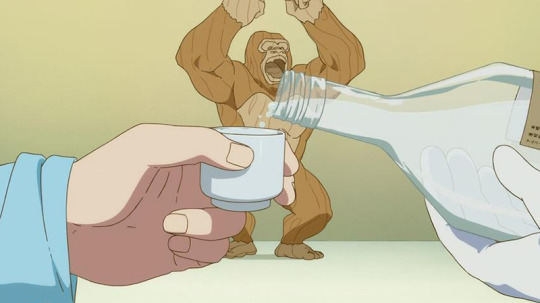
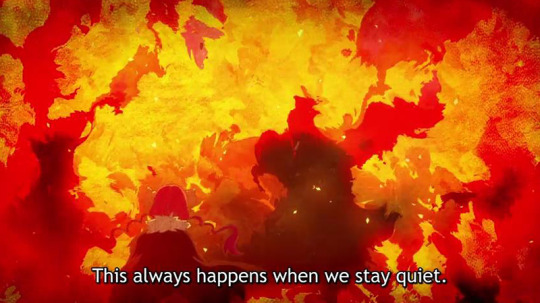
The “stay quiet” here is 大人し[い] otonashii, which takes the word for “adult” and adjectivizes it. It’s a common word with a variety of meanings, such as when something is “behaving” properly and not raising a fuss (from children to computer code to a chronic disease to political forces, all sorts of things) or when something comes across as “mature” (like a clothing design or a young person).
In this case the idea is that the dragons had chosen to “behave” and mind their own business, which (they seem to assume) led the humans into underestimating them and deciding to attack. (”Stay quiet” probably does a pretty good job of getting that across, but just to fill it out.)
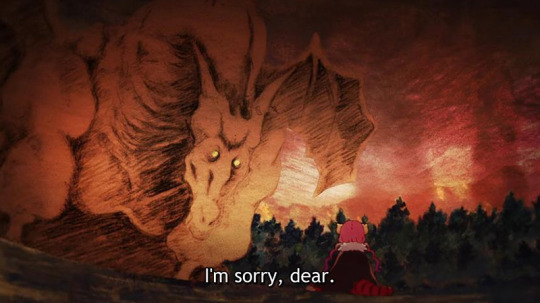
This is 残念ながら zannen nagara, or “unfortunately...”.
The reason I bring it up here, is that it’s not a particularly intimate way of speaking and leans somewhat formal—potentially implying Ilulu has no more close relatives left to give her this news (and/or maybe her family’s social position is one where other dragons had to treat them with respect).
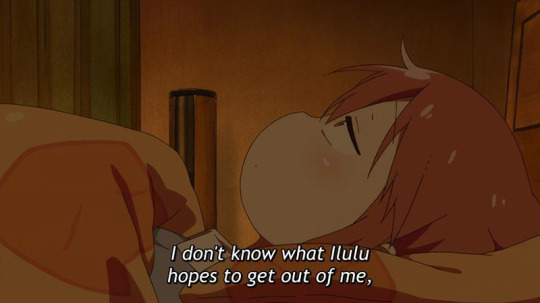
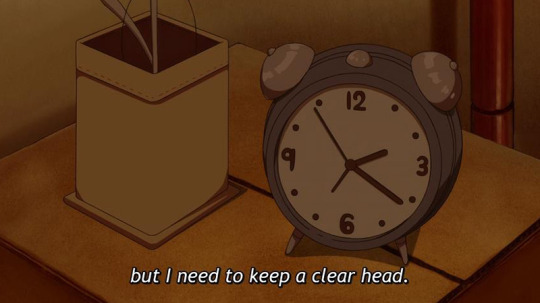
The second line here is 平常心を保つよ、私は, which is a fairly strong declaration of intent. I kind of feel like “I need to keep a clear head” sounds less confident, like convincing herself “ok bad situation, but if I just do this I’m fine.” In contrast, the Japanese imo is more of a “[Ilulu can do what she may,] but it won’t get it to me either way.” Just a mild point of characterization I suppose.
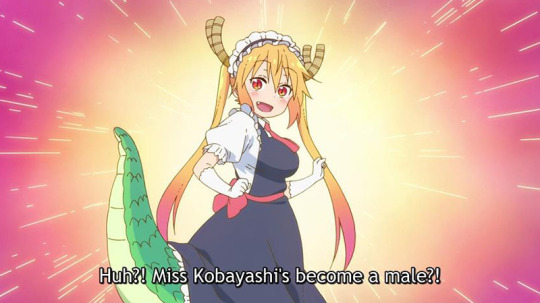
Just for clarity, she does use the word 雄 osu here, which is the more biological term for “in a sexually reproducing species, the one that produces sperm,” rather than a more gender-based term.
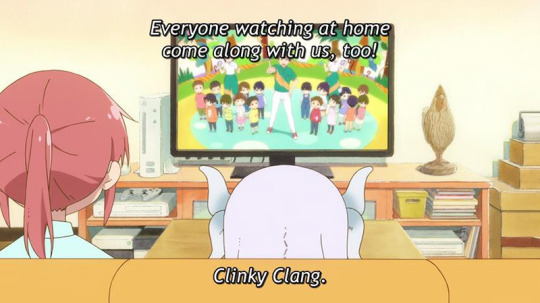
The TV show, シャシャシャシャキーン Sha-sha-sha-shakiin, is a combo reference to irl Saturday-morning kids’ variety show じゃじゃじゃじゃ~ン Ja-ja-ja-jaaN and weekday-morning シャキーン! Shakiin!.
The former’s name comes from the Japanese equivalent of ta-dah!, while the latter’s comes from the ”sound” for becoming alert, going from relaxed/sleepy/bored/etc. to “wide awake let’s go.” (though not necessarily sleep/wake related)
If you’ve seen these two emoji:
(´・ω・`) (`・ω・´)
The one on the right is the “シャキーン” one, and is the contrast to the gloomy one on the left (ショボーン shobon). Or these, going from asleep to awake:
( ˘ω˘ )スヤァ… (`・ω・´) シャキーン
In manga and stuff you’ll also see it used for e.g. someone drawing/brandishing a sword, striking a cool poses with a lens flare, things like that.
I think it gets translated to metallic-y sounds in English fairly often in those cases (like drawing a katana, or a mecha pose), hence the translation above.
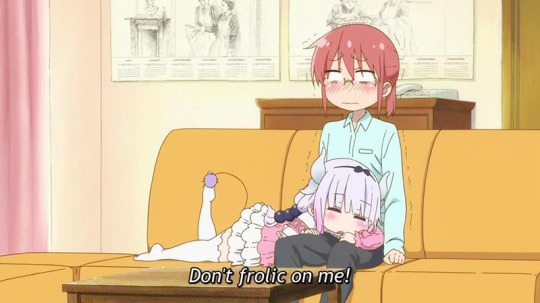
The verb for “frolic” here is じゃれる jareru (no relation to jajaan above), which is like to play/mess around, typically in a physical sense. For example it’s used in the compound word じゃれ合う jareau, which is often used in the same way English might say “playful wrestling” about kids or animals.
Though the word Kobayashi uses is actually a different じゃれる compound, じゃれつく jaretsuku, which is like playfully/affectionately grabbing/cuddling up/etc., (also primarily regarding kids or animals). There’s a bit of overlap with some of the uses of あまえる amaeru mentioned in the last episode’s notes.
Assuming I had the visuals, I’d probably just write this as “Please not on my lap...” or similar. (Kobayashi also uses a different verb conjugation for Tohru vs. Kanna in this scene, ~つくな vs. ~つかないで; Kanna’s being more plead-y compared to Tohru’s more “cut it out!” feel, hence the “please.”)
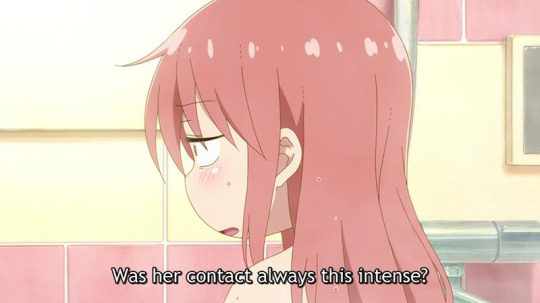
“Contact” here is “skin-ship,” a portmanteau-esque combination of skin and kinship or relationship. It’s primarily a Japanese word (you won’t find it in English dictionaries typically), but it was apparently coined by an American speaker at an international WHO seminar in 1953 (from which a Japanese attendee brought it back to Japan and it was later popularized).
The original use of the word was in reference specifically to parent-child physical intimacy, but as it became more widespread in usage the meaning extended to all sorts of relationships, from the platonic to the romantic.
One reason, presumably, that the term caught on so powerfully in Japan is that it has historically been a very touch-adverse culture (at least compared to say the US), and this extends even to parents with their children after the first few years. You’d see (and still see) psychologists recommend “more skinship” to people, for example.
The relative lack of skinship may partially explain the head pat thing mentioned in last episode’s notes (e.g. when you want to touch your kid, but hugs aren’t on the menu) and things like the old “hand-holding is lewd” meme. (Note this isn’t just me getting all orientalist here; there’s been a good bit of research on the skinship gap, and how it may be shrinking, by Japanese scholars.)
This line is also a bit of foreshadowing that Tohru has realized Kobayashi’s... situation already.
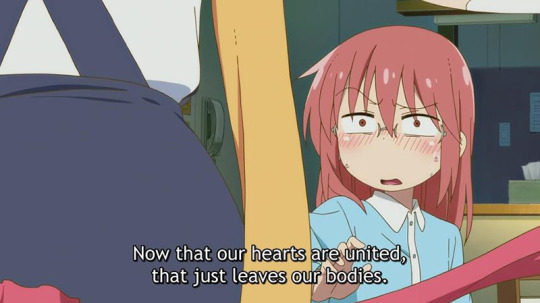
The Japanese here is 心と心でつながった後は体ですよ, which I only really mention because I kinda felt like the English’s “Now...” implied she was saying they only recently ‘connected their hearts,’ which I don’t feel from the Japanese wording and would say is probably not how Tohru thinks. E.g. more of a “Our hearts are already connected; now it’s time for our bodies!” kinda thing.

This 3/3 is March 3rd, which “equals” ♀ because that’s the date of Hinamatsuri, sometimes also referred to as Girl’s Day. The third day of the third month was originally a holiday brought over with the Chinese calendar, and it morphed from a more spring/peaches holiday into it’s more girl-oriented version at some point in the Edo period.
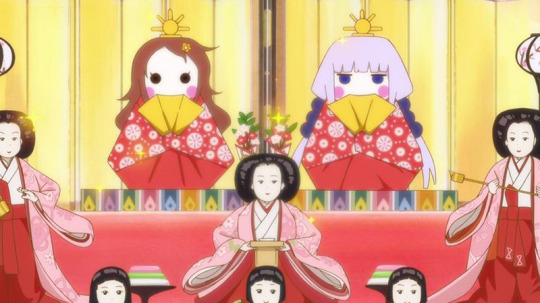
One of the highlights of Hinamatsuri is the doll displays, as pictured in this short bit with the Saikawa sisters. There are various types of displays, but this sort of staircase arrangement is the most common I believe. Each level has a certain type of doll that goes on it, with the top level having an “emperor” and an “empress” doll—which is the pair Riko replaces with dolls of herself and Kanna.
There’s some similarities between these doll displays and stereotypical Christmas trees: a family is likely to have a set of ornaments/dolls they mostly reuse each year, you put them up some time in advance of the actual holiday, then get lazy and leave them up too long put them away for a year after it’s over. A lot of businesses and such will put up displays as well.
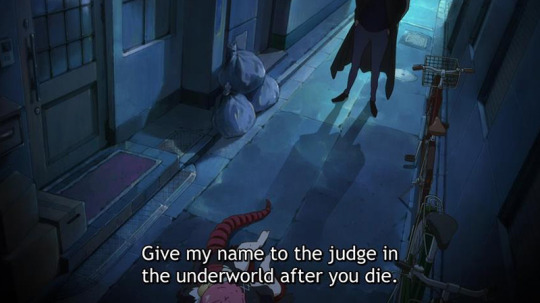
“The judge in the underworld” is left vague here and isn’t a specific reference to anything, but is generally in line with the typical “image” of what happens after you die (setting aside actual religious beliefs) in Japan.
Please see the documentary series Hoozuki no Reitetsu for more info.
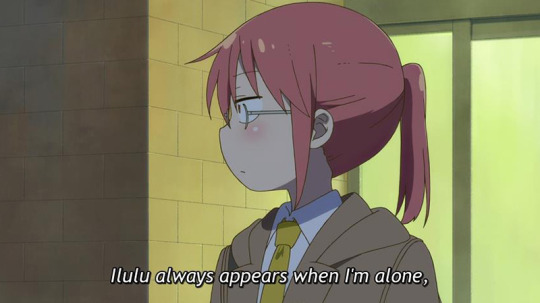
As of right now in the anime, Ilulu has only shown up twice, and only once of those when Kobayashi was alone. The implication seems to be that there have been other Ilulu encounters that we haven’t seen.
Also, for clarity, the Japanese is 私が一人の時にいつもイルルは来るから, which is more of a “whenever I’m alone Ilulu shows up” than a “she only shows up when I’m alone.” (The English could sorta be read either way I think?)
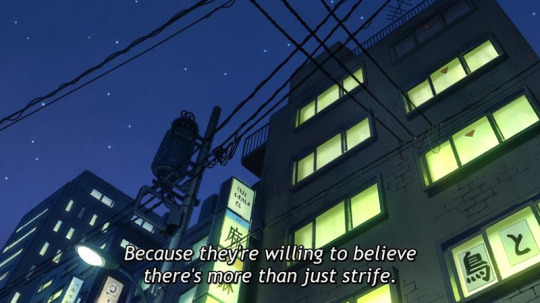
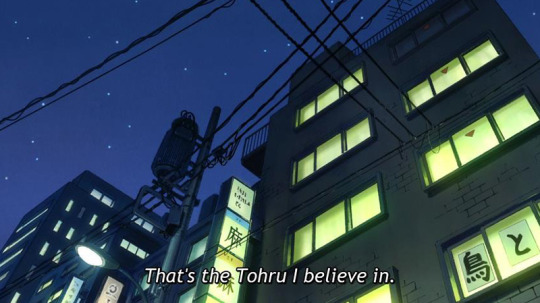
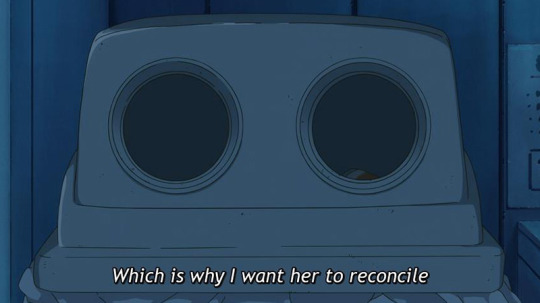
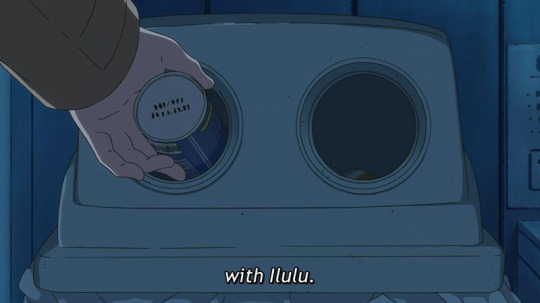
This bit is それだけじゃないって、争い以外もあると思ってくれているからだ。私はそんなトールを信じているから… だからその為にイルルと和解したい
The main point of contention I have with this English is that it implies Kobayashi wants Tohru and Ilulu to make up. However, I’d say this is more Kobayashi wanting to come to terms with Ilulu herself (and just by extension Tohru/the other dragons/maybe other humans).
That is, by making peace between herself the human and the “hostile” dragon Ilulu, she’d be helping prove Tohru’s belief correct—and she has faith in Tohru that it is (see also last season finale).
(Notably while Tohru is Chaos faction herself, there’s not really been another Chaos dragon yet to be convinced like this. Kanna is no-faction, Fafnir is technically no-faction even if Chaos-ish, Quetzalcoatl is an observer, Elma is Harmony, and Tohru’s father is an exception on multiple levels.)
Without getting too deep into the “why,” one quick thing I’ll point out is that she says 和解したい wakai shitai, not してほしい shite hoshii or させたい sasetai etc., meaning it’s something she wants to do herself, not want/make someone else do. Generally speaking you can’t use the ~たい “want to” form for anyone but yourself (you don’t know what anyone else is thinking, after all), unless quoting them, asking, or in the ~がる “seems to want to” form.
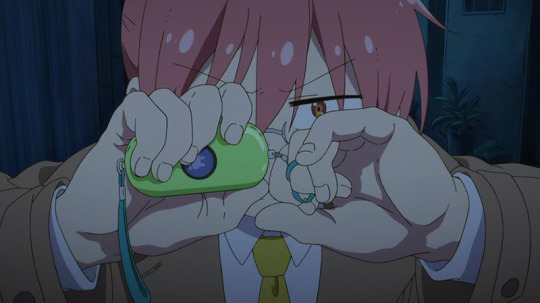
This is a 防犯ブザー bouhan buzaa, a crime-prevention buzzer, also known as a personal or self-defense alarm. They emit a very loud sound when activated. The idea is you, well, use it like she does here, when someone is trying to do a crime to you.
Since most Japanese children walk to school, it’s extremely common for these devices to given to students (either by parents or a gov’t body). It’s technically recommended for adults to carry them too, though the advent of the mobile phone has driven down carry rates.
This particular one was probably purchased in episode four of season one, if you want to rewatch and see why!
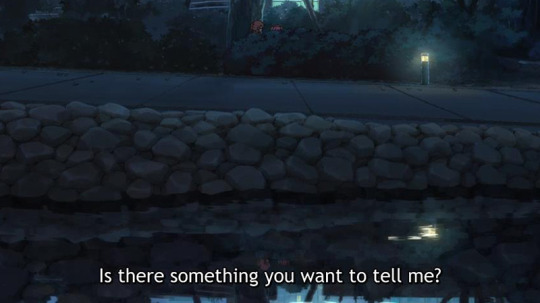
This is 私にぶつけたい気持ちでもあるの?in the Japanese.
The verb for “tell” is ぶつける butsukeru, an evocative word meaning ~to slam against (somewhat similar to “vent” in English when used with emotions/feelings).
The “something” is 気持ち kimochi, ~emotion/feeling/thought.
So the Japanese here feels a lot more expressive than "something you want to tell me,” I would say (that could just as easily be a translation of 話したいこと). That said it’s not an easy thing to express in English within the confines of the format here, especially if you want to keep the “target = ‘me’” part.
It might feel somewhat like “You got something bottled up you wanna hit me with?”, though I doubt if I’d use that either.
As a side note, the manga has Kobayashi say an extra line after this, about being the “main tank” to take her “hate” (Japanese for “aggro” in MMOs).
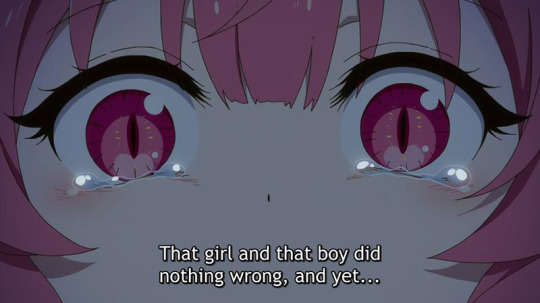
A small note that “that girl and that boy” is あの子とあの子 ano ko to ano ko, so no gender specification in the Japanese (it’s a good language for talking about people without specifying a gender!).
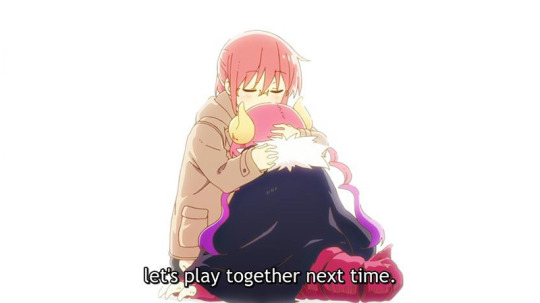
“Next time” here is 今度 kondo, which is an interesting word because you can situationally use it for “recently,” “this time,” “next time,” or “soon.”
The reason I bring it up here is the English “next time,” personally, leaves me thinking “Was there a previous time? What ‘next’ do you mean?”—just a heads up that that’s not really an issue in the original line.
Also: this whole extended scene with Kobayashi saving Ilulu is one of the “many senses” mentioned in the episode title. (see also episode one notes re ikemen)
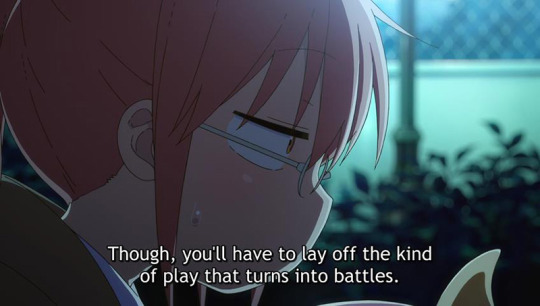
As an aside, this "play” is じゃれ合い jareai, the noun form of the jareau that was mentioned in the above “frolic” note.
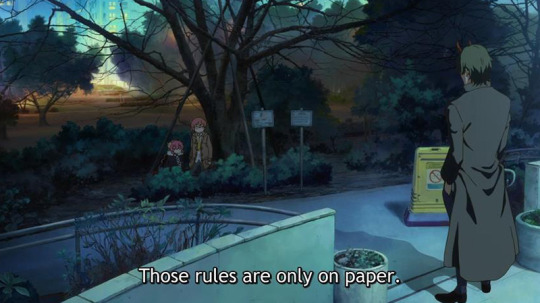
If you were wondering: “Do dragons use paper?”, the word here is 形骸化 keigai-ka, (almost) lit. ~reduced to bones, meaning something that once was strong/effective is now basically just a formality. It’s similar to the phrase “dead letter” in reference to old laws that aren’t really enforced anymore.
So two potential points of ~lore relevance~ here: 1) the rules probably used to be enforced, 2) we have no evidence (either way, from this) that they actually have them on paper somewhere.
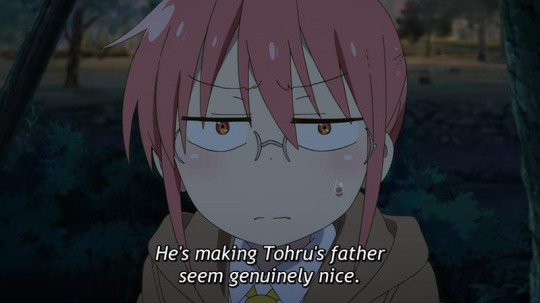
こりゃトールの父ちゃんは本格的に優しかったみたいだな
This might just be me reading too much into the English (again), but one difference in nuance between these two lines is that the English has Kobayashi implying Tohru’s dad “seemed” kind (which implies he’s not really kind, just kind in contrast to this villain), while the Japanese is more taking this as evidence that Tohru’s dad was actually being kind (see also last season finale).
For those wondering if the みたい in that line would imply a “seems”: it sort of does, but it applies across the whole observation here. I.e. “seems Tohru’s father was genuinely nice” vs. “making Tohru’s father seem genuinely nice” (which I’d guess would probably use 優しく見えてくる or something).
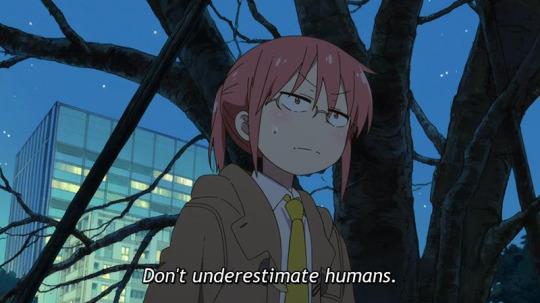
When you see “underestimate” in anime, most of the time it’s なめる nameru. It comes from the verbified archaic adjective 無礼し nameshi, meaning a combination of looking down on, acting rude towards, etc., and uses the same characters as “rude” (though often written in hiragana/katakana).
It also is a homonym of the verb “to lick,” so “Don’t underestimate humans” sounds identical to “Don’t lick humans.”
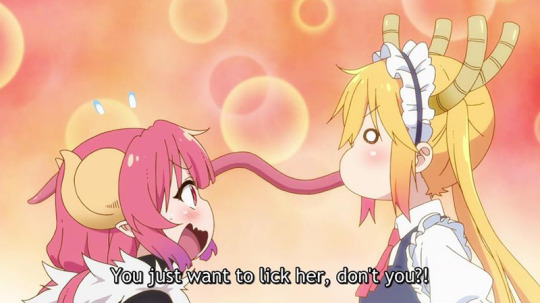
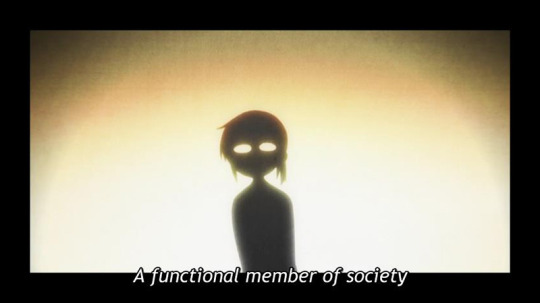
“Functional member of society” is 社会人 shakaijin, ~lit. person of society, which is a very commonly used word to refer to basically anyone who is an active member of society. It includes homemakers, so it’s not strictly “has a job at a company,” but in many contexts it’s used like “people with jobs” versus “students and NEETs.”
(Not that there’s anything wrong with the translation, just some extra context.)
A technique reminiscent of this shadow puppet silhouette style was also used in Hyouka, another Kyoani show and one directed by the late Series Director Takemoto Yasuhiro.
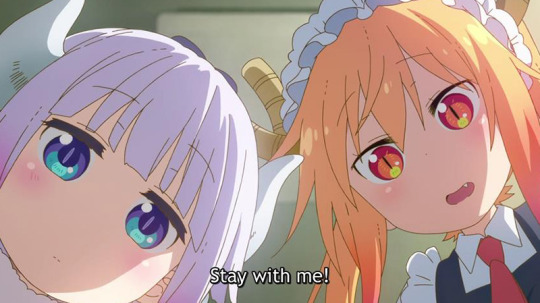
I kind of feel like yelling “Stay with me!” at someone injured is something you do when they’re in danger of fading away, not when they’re waking back up? Maybe that’s just me.
The Japanese is お気を確かに o-ki wo tashika ni, a polite (since Tohru almost always speaks kinda formally to Kobayashi, as part of the maid thing) way of saying “pull/hold it together,” and is used in a variety of situations.
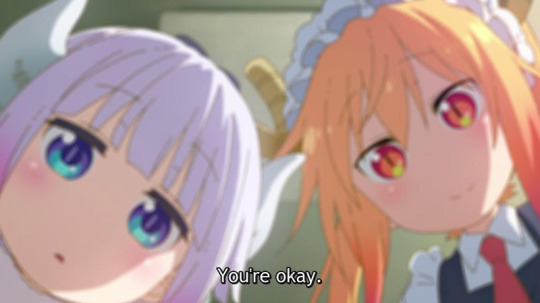
Kanna’s line is a question (e.g. like “are you okay?”) in the Japanese here, whereas the English sounds more like something you say to someone who’s injured to try to reassure them.
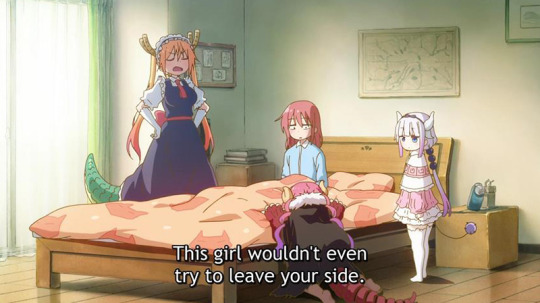
This line is その子離れようとしないんです sono ko hanareyou to shinai n desu.
The English is a pretty literal translation: hanareru is the verb for leaving/separating (in some senses), and the ~you conjugation means “try to ~”. However, that conjugation also has a second use in just indicating intent—especially when used in the negative, like here—so e.g. “She didn’t want to leave your side,” or “She wouldn’t leave your side at all.”

(◎Д◎)
Just in case: this is an emoji for expressing shock.
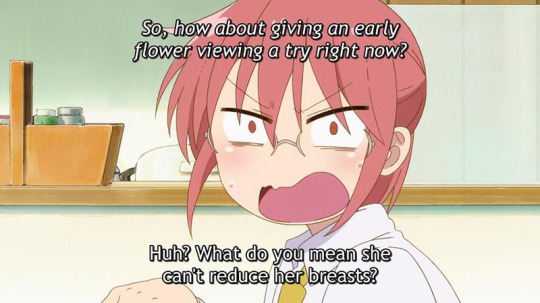
One thing that is left out of the English in this line is the だけ dake, “only.”
So Kobayashi’s not necessarily surprised at this by itself, but in contrast to the fact that Tohru says she probably can hide her claws/tail (so why not this too?).
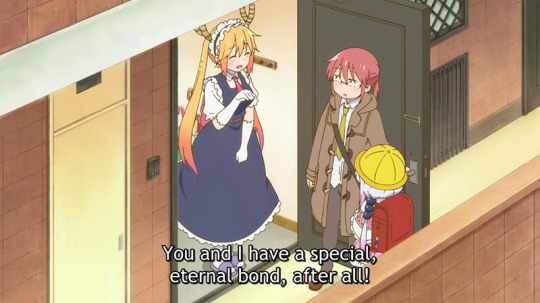
The base phrase Tohru is saying here is 私たちの仲じゃないですか, which roughly means “that’s just our relationship,” and is used commonly when being thanked for doing a favor for someone close. It’s similar in meaning to something like “hey of course, no problem, I know you’d do the same for me.”
Tohru puts a little spin on it by adding the “eternal” to make it 永遠の仲, which is a separate phrase that means probably what you’d think it means.
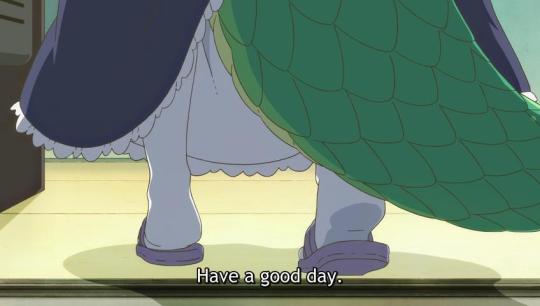
This quick cut to Tohru’s feet and the light “foot pop” motion... I have a hard time believing it’s anything but the director trying to give some subtle “goodbye kiss when leaving for work” vibes, even if they aren’t literally kissing. Just me?
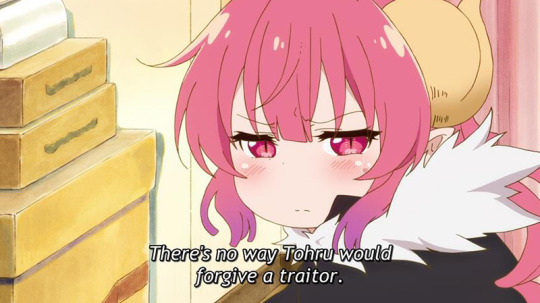
Here she says あのトール ano Tohru, lit. “that Tohru,“ which in this sort of context carries a meaning similar to using an italicized “that” in English: not just any Tohru, but that Tohru, the famous one. The implication is that yes indeed Tohru is well-known among other dragons—and known to be quite strong and merciless.
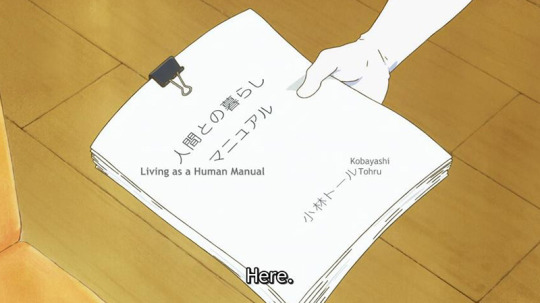
It’s not a particularly big deal, but technically this is 人間と, i.e. Living with.
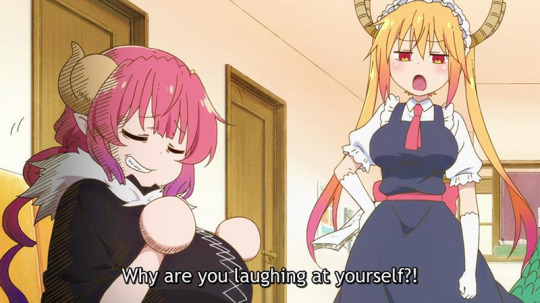
The ball hands thing is generally thought of as “Doraemon hands” in Japan. Doraemon gets the name from the food “dorayaki,” but “Dora” is also how you pronounce the first two syllables in “Dragon” (ドラゴン doragon).
Keep this in mind.
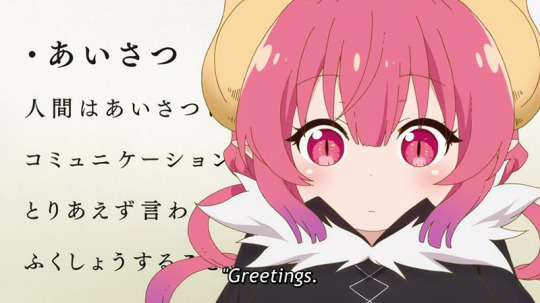
挨拶 (あいさつ) aisatsu, often translated as “greeting(s)”, is a lot bigger of a thing culturally for Japan than it might be for where you live. Though translated as “greetings” it also includes farewells and more. Basically a general term for “in X situation, say Y” style semi-set phrases.
In more traditionally minded companies, for example, employees are often expected to give a rote ohayou gozaimasu when they arrive (even if they think no one is around to hear it), and may get chewed out for not doing so or half-assing it. Then when passing someone in the hallway etc., an otsukare-sama desu, and yet another phrase when leaving for the day. Also the ittekimasu and itterasshai (when leaving home/saying bye to them) or tadaima and okaeri (returning home/welcoming back) that probably many anime-watchers are familiar with. Even itadakimasu is an aisatsu.
Obviously every culture utilizes “greetings” like this, but in Japan they’re pretty heavily ritualized and treated as a cornerstone of human relations, a key part of showing respect for your fellow humans (even people you hate!) and ensuring the smooth working of society. It’s not the thing they chose to have Tohru put first in her “living with humans [in Japan]” notebook for nothing!
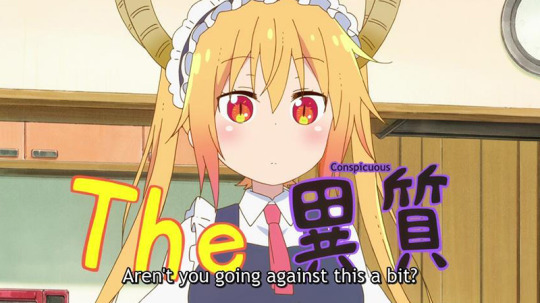
The English “the” is a popular word to use in Japanese as an intensifier, similar to how it’s used in a sentence like “this isn’t just an [example], it’s the [example]!”
It’s usually pronounced “za” and often written that way in katakana (ザ) for this usage. (If you type “za” in a Japanese IME, most will offer up “the” as one of the options to convert the text to, even.)

The word she says here is 喝 katsu, which, in this sense, is a stereotypical thing for a Zen teacher to say to a student as a stand-in for explaining some deep Zen concept that words can’t describe. So here, it’s kinda like “Yes this may seem contradictory, but really it’s just too complicated for you! No more questions!”
Obviously that’s oversimplified and it’s used in other ways too (see Saikawa’s father during the sports festival), but just for the purposes of this joke, there you have it.
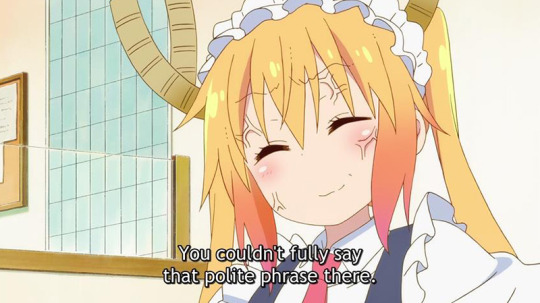
The word used in the Japanese here is 建前 tatemae. If you’ve ever studied any Japanese, you’ve likely heard about honne vs. tatemae, your inner feelings vs. the front you put up for social reasons.
People new to the language are sometimes prone to approaching that distinction with “well why doesn’t everyone just honne all the time, why play games?”, but of course almost everyone splits themselves like this. You probably hate your boss, but you also probably don’t tell them that to their face to avoid getting fired. Or maybe you have some family members you can’t stand, but act nice around anyway because it’s not worth the trouble to start fights.
Japan just put names to the idea, and maybe leans a little more toward encouraging tatemae in more situations.
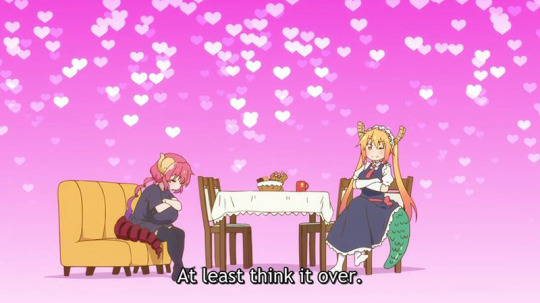
This is せいぜい悩むんですね.
せいぜい seizei as an adverb means doing something to utmost extent one is capable of. You’ve likely heard it from a villain somewhere saying something like “Struggle all you like, wahaha!”.
Though it’s not necessarily down-talky like that, in modern times that is the trend (you can use it for yourself no problem, but if used to talk about someone else’s actions it may come off as belittling). Tohru, as one of the strongest beings in the setting and with the pride to match, uses it a lot.
悩む nayamu is to worry, fret, ruminate over (some difficulty etc.).
The sentence in general is one that is highly context dependent, but here it’s Tohru thinking to herself, somewhat impressed, that Ilulu is actually putting serious thought into the question of what she wants to do with her life.
And, as the background suggests, finding it surprisingly adorable/admirable; up until just a few days ago, Ilulu was known as one of the most extremist Chaos faction dragons obsessed with nothing but destruction, yet look at her now. In a way, Tohru’s taken over an older sister kind of role for her.
(For the curious, if the ね was dropped or swapped to a よ here, that would imply she was directing the comment “at” Ilulu, rather than saying it in observation.)

The word here is 契る chigiru, which usually means to swear/pledge (e.g. swear a pact, pledge your love), but can also be a somewhat fancy word for having sex, especially of a married couple.
I feel like I personally would have used more of a euphemism for the translation.
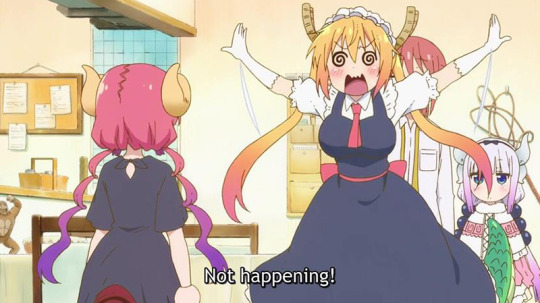
The phrase here is ダメの助 dame-no-suke, where dame is no/bad/can’t do/useless, and (no)suke is a common ending to first names; both actual names and sort of on-the-spot nicknames; someone looking sleepy might be called a 寝坊助 nebou-suke in the same way as “sleepyhead.”
Or, as here, sticking to the end of things for comedic effect or as indication of a panicked/confused thought process.

( ° ρ ° )
Just in case: this one is also expressing shock, but a kind of dumbfounded shock. The ρ is a drooling, slack-jawed mouth.
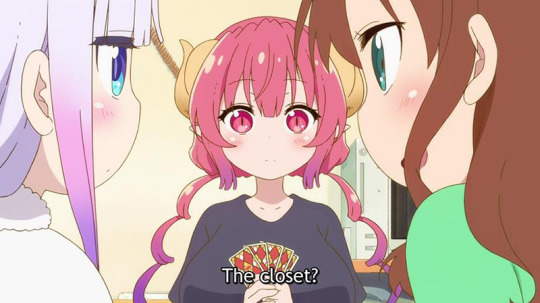
In the next episode preview they talk about where Ilulu will sleep, since they don’t have room for another bed. Ilulu wants to sleep in the closet—or more specifically, the 押し入れ oshi-ire, which is a particular closet layout you’ll find in many Japanese bedrooms.
The typical difference is that an 押し入れ was originally designed for 和室 washitsu, traditional-style Japanese rooms with tatami floors, primarily as storage space for folded-up futon/blankets/pillows, as you would put those away during the day to free up space. Thus they typically are rather wide, mildly deep, and have a waist-height, solid horizontal divider capable of supporting a lot of weight.
They actually are pretty okay for sleeping in if you’re not claustrophobic or tall.
Anyway, I bring this up because you know who else very famously sleeps in one of these? That’s right: Doraemon.
#maidragon#kobayashi's dragon maid#kobayashi-san chi no maid dragon#miss kobayashi's dragon maid#anime#translation notes#season 2
18 notes
·
View notes
Text
Thoughts on Karin’s Magical Girl Story

Another collection of thoughts and reactions, plus analyzing some small changes the NA translation made (similar to the translation comparison I did for Alina’s MGS a while back).
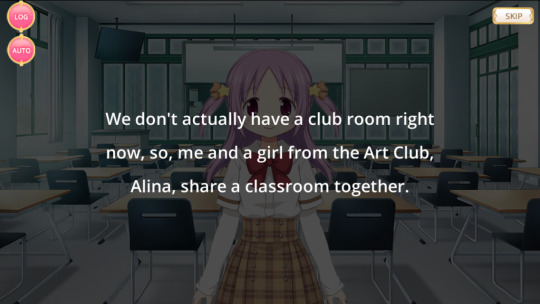
Starting off with not a change, but an interesting note: Karin and Alina’s club situation is rather strange. Alina is the “outsider” from the Art Club, while Karin is part of the Manga Club. The classroom they share, though, doesn’t appear to be the main space for either club. I’d initially assumed that it was the room originally used for the Manga Club, but once Arc 2 updates these backgrounds...

It turns out this actually is an art classroom! I guess the school just has two?
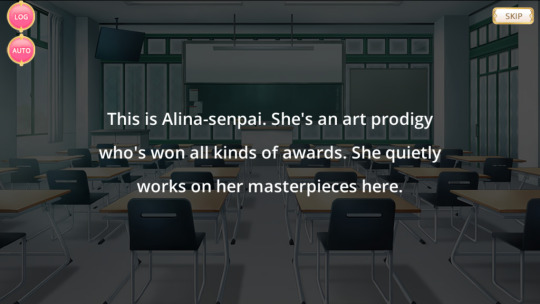
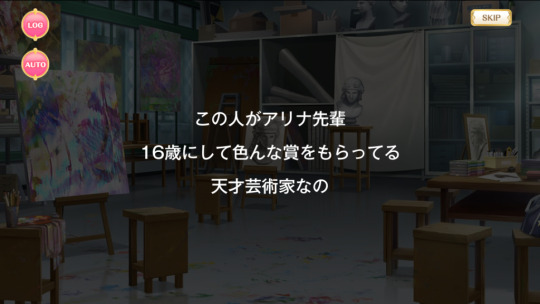
First major change: Just like in Alina’s MGS, they removed direct references to Karin and Alina’s ages. The reference to Karin’s age at the start of the Magical Halloween Theater event was also changed.
(In JP here, Alina was said to have won a lot of different awards “for a 16 year old,” while Karin stated her age as 14 in the MHT event.)
Again, unsure of why the change, but it could be in order to fix the continuity issues. Because good lord, that continuity is snarled...
I think the order that makes the most sense is Karin MGS > Alina MGS > Magius forms > one year passes > MHT > Main Story Ch5 > Holy Alina’s MGS. In theory, then Karin should be 13 and Alina should be 15 in their Magical Girl Stories and then 14 and 16 in the present, but as mentioned that’s contradicted by the start of Karin’s MGS in the original Japanese.
There’s also the weirdness around when/how Karin learned Alina was a magical girl, since Karin seems aware of it in MHT, yet it’s unclear if she knows in Holy Alina’s MGS.
… Anyway, stuff like this is why I gave up on constructing a coherent timeline for Magia Record. There’s just too many continuity tangles. ¯\_(ツ)_/¯
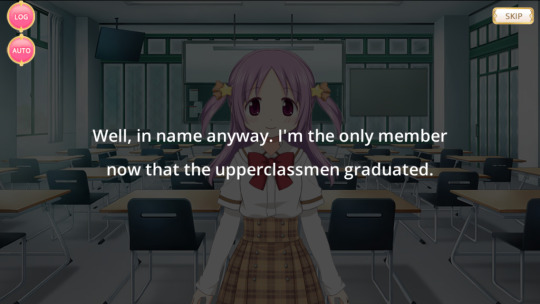

References to Karin being in her second year in middle school and the third years leaving – also changed. Probably because it’s both an uncommon way to refer to grades in English, and also, once again, another continuity issue. (If the third years left, why is Alina still there in one years’ time if she’s at least one grade ahead of Karin?)
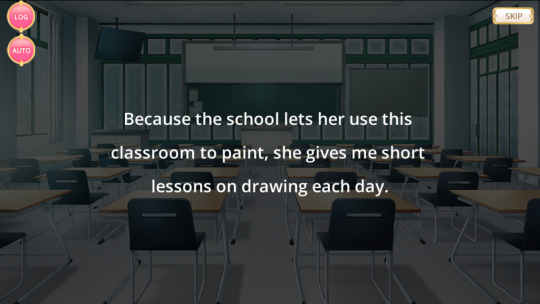

Another change: some specifics in why Karin and Alina are in the same classroom together. In JP, it’s not specified who made the deal to let Alina use the room. If anything it seems like Karin is the one making a deal directly with Alina.
Which actually makes far more sense all around – why does “the school” care that Alina is giving informal lessons to some random kid?
And it makes more sense from Alina’s perspective too, in that it explains why she tolerates Karin constantly bothering her – putting up with Karin is explicitly the price she’s paying to Karin for using the space.

Oh boy, this. Karin having this mindset is why it took me so long to really ship AliKari. Because the dark undertone to “if only I improve, then surely Alina will treat me better” is that Karin is blaming herself when Alina is cruel to her. And that can very easily slide into an abusive relationship - if you don’t consider it one already.
Alina treating Karin decently should not be dependent on Karin’s art skill. Or anything else, for that matter. Full stop.
(Tangent time, including some Arc 2 spoilers)
What ultimately made me come around to AliKari is some of the early Arc 2 stuff, where Karin starts thinking the reason Alina disappeared is because Alina is mad at Karin for not improving. Karin’s explanation is spectacularly wrong, so I’m now more trusting that the game is implying that Karin’s mindset is going to change. That she’ll stop believing she’s at fault for Alina’s actions - and hopefully stand up to Alina too while she’s at it.
The other half of the equation is Alina, who as far as I can tell, is genuinely not interested in bullying Karin. She certainly has every opportunity to do so – especially given how her teacher punishes Karin for Alina’s behavior – but Alina never takes advantage of it. So while she is overly harsh and blunt about expressing her opinions to Karin, I don’t get the sense there is any manipulation underlying it. Indeed, very unusually for Alina, we also never see her enjoying or fantasizing about Karin’s pain or distress. She really, truly, just wants Karin to get better at art already!
Obviously, for any kind of relationship between the two to work, they would both need to undergo significant character development. But that’s the draw of AliKari – while other characters have stagnated (sigh, RikaRen), Alina and Karin are still some of the most dynamic characters in the game. And in general, the direction has been that despite starting out in a bad place (like Karin’s mindset above), they’re growing to become very positive influences on each other.
(End tangent)
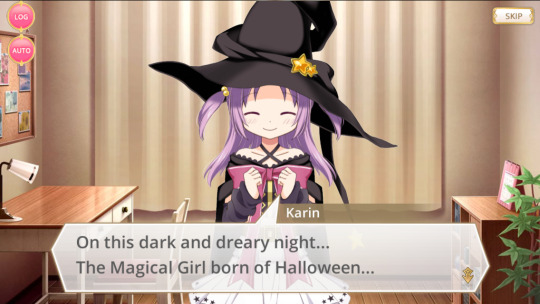

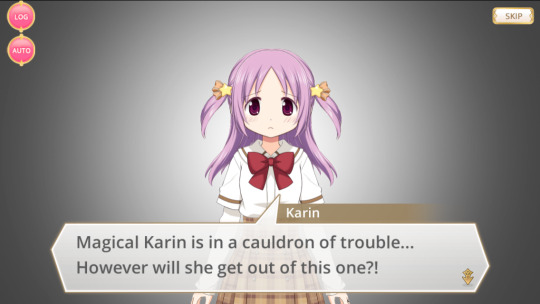
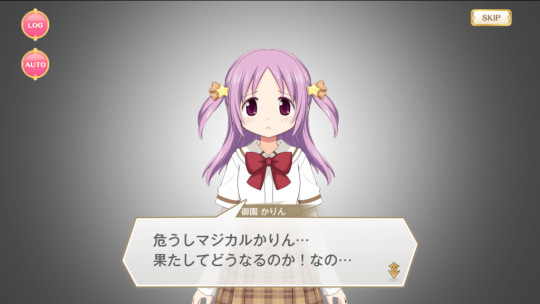
Enjoying the extra cliches thrown in here and there, and in general how they translated Karin’s dramatics by adding additional cheesy and on-theme descriptions. Stuff like “dark and dreary night” or “cauldron of trouble” aren’t in the original Japanese, but they’re wonderfully in-character – honestly probably an improvement over the original!
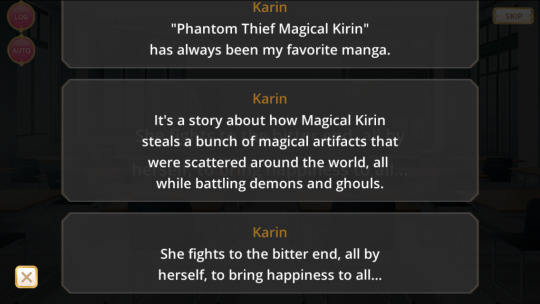
Not a change, but more reminding myself that I really need to read Kamikaze Kaitou Jeanne. I’m like 97% sure that’s what’s being referenced here – the plot description and even the comments Karin makes about “Phantom Thief Kirin” In her later Magic unlock quotes are all a very close match.
Interestingly enough, I’ve heard KKJ mentioned as an earlier dark magical girl series that Madoka Magica rips off. So it’s quite interesting to see it referenced again back in a PMMM property – I wonder which part of the creative team was responsible for this detail?
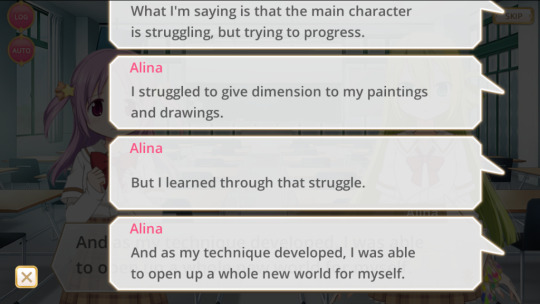
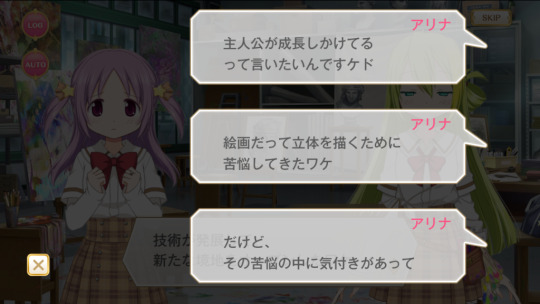
Hm, so, the subject and detail of Karin and Alina’s conversation in the middle differs between translations. In JP, the subject is vague, so the fan translation has Alina going off on an extended metaphor comparing the history of art to the protagonist of Karin’s manga. Meanwhile, in NA she just makes vague comments comparing her own growth as an artist.
I think I prefer the former - Alina usually doesn’t like talking about herself, but she sure loves to ramble about art history.
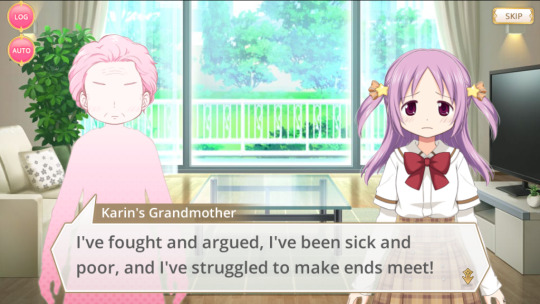

The translation I can find for the metaphor Karin’s grandmother uses here in JP renders it “barely able to keep a business going” - so did Karin’s grandmother possibly own a business herself? That’s a bit more interesting than just “struggled to make ends meet.”
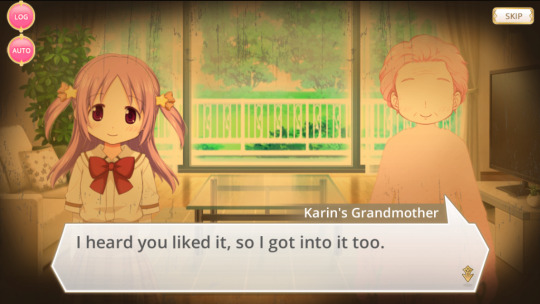
Speaking of Karin’s grandmother, I really like her as a character. Her relationship with Karin is really sweet - I mean, how often do you see a teenage girl and an older woman being fans of something together? It happens in real life plenty of times, but it’s so rare to see this kind of interaction represented in fiction.

And it’s nice to see an example of mental illness being treated as just that – an illness. I especially like that there’s consent to the cure – Grandma outright says she wishes to be cured, rather than Karin deciding as such on her own. (As Karin is often wont to do…)

This is a fun illustration of how Alina has a very strong internal logic to her, but she’s really terrible at communicating it to other people.
Karin, naturally, takes Alina’s comment here as an exceptionally mean thing to say – it sounds like Alina is callously implying the thing Karin worked so hard on was so bad it wasn’t even worth Alina’s time to destroy, so she’s making Karin suffer even more in having to destroy it herself.
And the way Alina elaborates makes it quite clear that yes, she did mean to call Karin’s work garbage. This isn’t Alina having difficulty with Japanese or English.
But while Alina’s sense of taste can be quite sadistic, I don’t think that’s what she was aiming for here. Remember that Alina believes that “only the artist themselves has the right to destroy their work.” So this is actually Alina acknowledging Karin’s work as art, and therefore only Karin has the right to rip it up.
And why rip it up? Because whenever Alina finds her own work unsatisfactory, she destroys it. Hence Alina’s question at the end of this little back-and-forth:
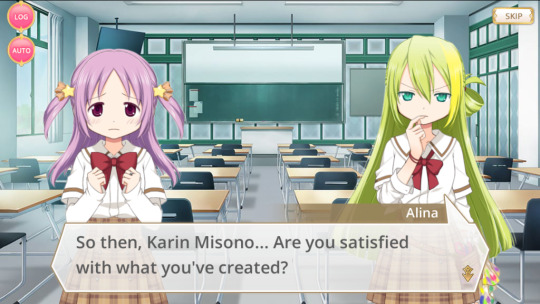
If Karin doesn’t want to rip up her manga, then according to Alina’s logic, that means she must be happy and satisfied with it. But even Alina can tell that Karin is still unsatisfied and lying to herself, hence Alina’s frustration and confusion at Karin not destroying her work.

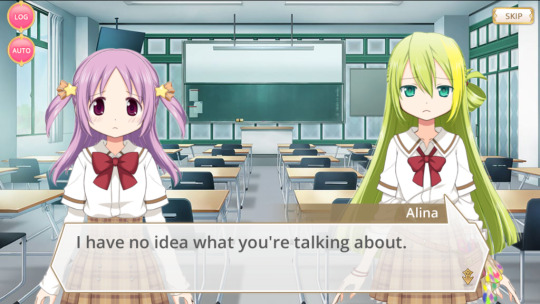
Another timeline note: Alina doesn’t lie, and even if she did, she doesn’t have a ring here. So I think it’s pretty settled that Karin’s MGS takes place before Alina learned about magical girls.
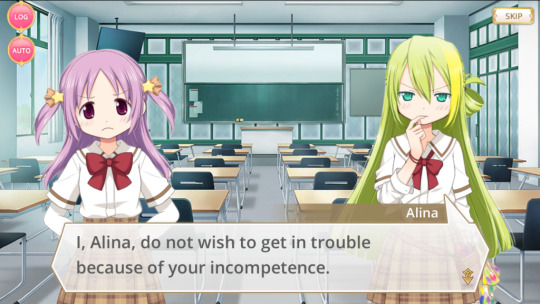
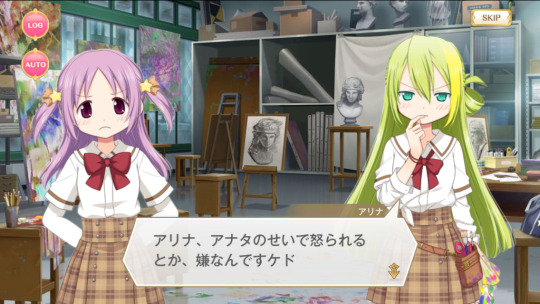
Oh huh. In NA, Alina thinks she’ll be the one in trouble if Karin isn’t ready. In the fan translation I’m used to, it seems like Alina is saying she’d just be mad herself… but I think NA has it right here. (In the original JP, Alina is using the passive form of “get angry” without a subject.)
Both work, but the impression NA gives with both this change and the earlier one is that someone at the school is basically putting Alina in charge of supervising Karin. Which… what the hell, Sakae Academy?

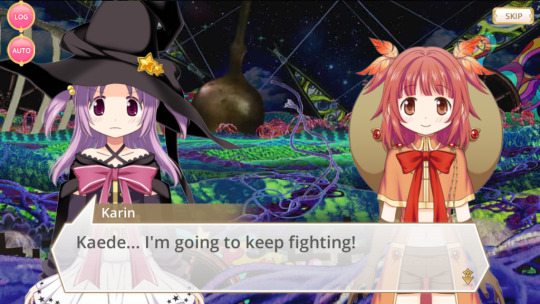
Going back a bit, Alina’s advice and its effect on Karin is interesting. One of Karin’s flaws really is that she makes excuses for herself and only half-commits, so Alina pushing her to think about what she truly wants and work hard to get it was genuinely what Karin needed to hear at the time.
However, Alina is also an obsessive perfectionist that tends to push herself to very clearly unhealthy levels…
So it’s rather fitting that on following Alina’s advice, Karin ends up pushing herself into doing something very dangerous: insisting on fighting a witch alone even though Kaede tries to get her to retreat. Karin is so determined she’s risking her life to fulfill her goal – something Alina would no doubt approve of. But also a great illustration of why Alina and her advice is flawed too.
Which, come to think of it, is part of why Karin and Alina’s MGS actually form a nice pair of complementary short stories. If you read them in chronological(?) / original JP release order, you first get to see how Alina helps Karin to grow as a person, and if you think hard about it, you can kind of see foreshadowing for Alina’s own issues. Then in Alina’s MGS, you get confirmation of that foreshadowing about Alina, and furthermore, the payoff to Karin’s development with her now being the one to give Alina some hard-hitting advice.
#magia record#misono karin#alina gray#alikari#magia record analysis#my ramblings#na translation changes#magia record na#magia record jp#read more
55 notes
·
View notes
Text
Adam Young, to his horror and occasional bleak amusement, had turned out to be extremely good at politics.
When he spoke at public meetings, people came up to him afterwards to shake his hand; when he sent out press releases, people not only read them, but wrote letters to various editors with his name bracketed by phrases like ‘integrity’ and ‘bright future in the party.’ He was single-handedly skewing voter turnout for South East England. Labour had done some assessment polling for a run at MP, and Adam had reduced the poor analyst to tears when he told her he wasn’t interested in being anything more than Councillor, sorry. He’d had to sit there for twenty minutes, awkwardly patting her shoulder as she blew her nose on her spreadsheets and sobbed about response rates.
“It’s your hair,” Brian decided. “Makes you look like an RAF pilot in one of those old movies. People look at someone with hair like that and think, ‘Gosh, I bet he knows what he’s doing.’”
After a period of vague muddling, Brian had somehow found his way to medicine and shocked everyone who knew him by doing rather well at it. He was onto his Foundation training now, though Adam suspected that a steady diet of black coffees and biscuits swiped from the blood donor centre had driven him insane.
“I don’t know what I’m doing, though!” Adam said. “Or at least, only very rarely.”
“Well, of course we know that,” Pepper said with an indulgent smile. Pepper had gone into safeguarding, and while it had not made her insane, it had made her slightly insufferable.
“Maybe you could shave it all off,” Brian said. He was squinting at Adam’s head as though proposing a particularly risky cranial surgery. “Nobody’s bald in films.”
“Bruce Willis is bald,” Pepper said. “And Sean Connery.”
Brian rolled his eyes and sighed. “All right, fine, John McClane and James Bond are bald. But Adam’s not exactly an action hero, is he? If you’re going to bald, you have to carry a gun. Adam, do you honestly want to carry a gun?”
“I really don’t think it’s my hair,” Adam said morosely.*
Pepper would later claim that she had written Wensleydale to see if had an opinion on Adam’s hair, and received a very rambling response in which Wensleydale traced the etymological origins of ‘hair’ and opined at length about the cultural meaning of braids, without ever weighing in on the matter. However, while this definitely sounded like Wensleydale, who was holed up doing research in some archive in Seville, Adam strongly suspected it had actually been a love letter to Pepper. Mostly because she refused to show it to him, and went blushing and defensive whenever he asked.
(In the old days, there might have been a well-meaning scrap about it. But Pepper had expanded upon her general knowledge of violence with krav maga training and jujitsu classes and probably other arcane martial arts; none of the Them would try anything against her now, honestly.)
Despite Adam’s hair and the wild civic adoration it apparently inspired, Adam did not particularly enjoy politics. He had, after all, been offered all the kingdoms of the world and their splendor; once you’d decided against that, being MP of Milton Keynes South lost some its attraction. He probably would have given up the whole thing and gone deep-sea diving, if it weren’t for two things:
First, that the boy who had loved Lower Tadfield into a gold-green summer afternoon in the English countryside had never really gone, just grown up; and second, that Adam Young had once been sentenced to a whole summer assisting Mr. R.P. Tyler, Chairman of the Lower Tadfield’s Residents’ Association, and had accidentally fallen in love.
...not, it should be said, with Mr. Tyler.**
Still, Adam Young had spent a whole summer filing camping permits, examining rummage sale forms, deciding whether to approve Ms. Shaddlebrook’s application to build a shed down by her garden, and referencing and re-reading bylaws. He had, as a consequence and quite inexplicably, fallen in love with the complicated, esoteric game of it all. It wasn’t as though the rules were secret or sacred. You didn’t have to always follow them. But if you wanted to play (if you wanted to win) you had to care, very much, about knowing them. To shape the world the way you wanted meant knowing how it was; you couldn’t break, bend or snap what you didn’t understand. And by the end of that dry, hot, sixteen-year-old summer, even Mr. Tyler had seemed somewhat grudgingly impressed. There weren’t many teenage boys who could quote section, chapter and verse, when questioned about why their loitering outside the corner store was actually an expression of freedom of assembly under the Human Rights Act and by incorporation, the Lower Tadfield Charter. So there.
When he passed, Mr. Tyler had left Adam his annotated copy of the Residents’ Association bylaws, with an inscription: To Mr. Young, a Fiend ‘til the end.
Adam had been deeply touched.
Anyhow, what it meant was: that all these years later, MK Councillor Young was good at administration. He liked spreadsheets, comparative studies, charts, references, citations, and ultimately was very good at what he did. He hosted meetings for the community to talk about new parish initiatives, where there was always coffee and doughnuts since otherwise people wouldn’t show up. He found the dull, dry grind of it all very soothing, since it was hard to imagine anyone getting particularly excited about an Antichrist who enjoyed maintaining the highways register.*** It was better, that way.
Unfortunately, it also meant that by the time the news reached him, it was very likely too late. After all, who would have thought that some minor local councilor, notable for being young-ish, left-ish, generally fine if nothing more exciting, would care about the End of Days?
* It was probably being the Adversary, Destroyer of Kings, Angel of the Bottomless Pit, Great Beast that is called Dragon, Prince of This World, Father of Lies, Spawn of Satan, and Lord of Darkness. That sort of thing generally came with the charisma built in.
** He would be horrified by the mere implication.
*** Not that roadworks were necessarily good—Adam knew what Crowley had got up to with the M25. But when people did bad things with transit construction, it generally fell into the category of ordinary, mundane evil that any human could do if they put their mind to it. Adam found this immensely comforting.
#good omens#no one should read too much into the fact that apparently two weeks after I make a post about administrative pedantic villains#I cast the antichrist in that role#it's..........you know fine probably#this is a thing I made
3K notes
·
View notes
Text
Arden Talks Media Studies: Death of the Author
Intro/Disclaimer
Ok so I do try to keep this blog largely for swtor in specific and star wars in general content, but I’m going to make an exception here because I like to talk. @lilquill brought up some posts about death of the author in a discord server we share and her, another friend who I don’t want to name without their explicit permission, and myself ended up having a conversation about the misconceptions people seem to have around this topic. So because I’m a media studies student I figured I’d make this post about death of the author from my perspective of studying this stuff.
Feel free to reblog this post if there’s anything you want to add or challenge me on! This isn’t meant to be a callout or a vague about any specific person, more a general idea that seems to be spread around. And I could be totally wrong. I’ll link my sources at the end.
So what is Death of the Author?
The original Death of the Author essay was written by an academic named Roland Barthes and later translated into English. It’s not super long so y’all should definitely give it a read if you’re curious about this stuff, but it IS quite dense so I’m going to summarize it here, paragraph by paragraph.
Barthes opens by quoting from the book Sarrasine and asking the question “who is saying this?”. He goes on to say that there is no clear answer whether it is being said by the protagonist, the Author, or the social context the Author is writing in. To Barthes, literature is a place where multiple voices (the Author and the various influences on their life) combine into a whole new voice that can’t be fully attributed to any one of the original factors.
In the next paragraph Barthes talks about how the idea of the Author is a modern, Western, one. The concept of the Author, therefore, is one that hyper focuses on an individual, and (usually) his personality and thoughts due to the the importance of individualism in our society. “The author still rules in manuals of literary history, in biographies of writers, in magazine interviews, and even in the awareness of literary men, anxious to unite, by their private journals, their person and their work”. The fiction produced by an individual, under “author-culture” (because we don’t already have enough [x]culture going around) is therefore seen as a both direct insight into the mind of the Author AND a direct expression of his ‘voice’.
The next paragraph talks about a few previous criticism of Author-culture. A bunch of different writers have argued that language, systems, symbols, and codes are the lens a work should be viewed by rather than tools of the Author. Surrealism directly opposed the idea of an authors intentions via automatic writing. And the school of linguistics talks about how the Author isn’t any sort of dramatic figure, but simply a person who writes.
Barthes goes on from this to speak about how the death or absence of the Author™ changes the modern text. First of all, rather than the Author being a ‘before’ state and the text being an ‘after’ state where the Author can be viewed as the ‘parent’ of the text, instead the writer exists simultaneously with the text. “In grammar the person or thing we speak about is called the subject. What we say about the subject is called the predicate”, and to Barthes the text is no longer the predicate of the Author. It therefore directly counters the idea of the tortured genius Author whose hand is slower than his mind.
To Barthes, the text is not just the words being written with one meaning coming directly from the Author, but a “tissue of citations, resulting from the thousand sources of culture”. The writer is therefore an imitator not a creator, with their role being to combine and contrast already existing ideas and concepts into a new form. The words used by an Author largely already exist, and only have meaning in relation to other words that also already exist.
The Author™ and the Critic™ therefore have a symbiotic relationship. The Author provides the text with one set meaning, and the Critic therefore uncovers the meaning by explaining the Author. The death of the Author also becomes the death of the Critic. “The space of the writing is to be traversed, not penetrated: writing ceaselessly posits meaning but always in order to evaporate it: it proceeds to a systematic exemption of meaning”. Barthes believes that death of the author liberates writing from needing to have a final meaning.
Writing is therefore the domain of the reader or the spectator. Barthes provides the example of a Greek tragedy, where the text of full of words with double meanings. Within the text each character only understands one of the meanings, creating the tragic misunderstanding. However the reader understands not only the double meanings of each word, but also the limited understanding of the characters. Texts are a dialogue between cultures and writings, which the reader combines through the act of reading. “The reader is a man without history, without biography, without psychology; he is only that someone who holds gathered into a single field all the paths of which the text is constituted”.
Barthes concludes by explaining that classical criticism is centered around the Author, not the reader and that therefore “The birth of the reader must be ransomed by the death of the Author”.
Context of the original text.
Welcome to the bit of this already longass post where I death of the author the ‘death of the author’ text itself. As in, to fully understand this text we need to look at the context it was written in.
Roland Barthes was a French linguist who lived in the 21st century. If you’re like me and have done any media studies classes at all, you’ve probably already heard of him as being “that sign guy”. As in, he wrote a LOT on semiotics. Semiotics is the study of signs, and to discuss it in detail would be a WHOLE other post, but it is quite important so here goes:
The main concepts within semiotics are the sign, and signification. A sign is a word, image, sound, act, object, etc which has no intrinsic meaning, but has been given meaning. It is made up of the signifier, a written or spoken word, and the signified, a concept. The relationship between the signifier and the signified is signification. For example, a cat is a sign as it consists of the word “cat” (signifier) and the physical animal (signified).
Barthes also talked about mythologies, and not as in the Greek sense. Basically, denotation is the literal meaning of a sign, while connotation is a deeper or cultural meaning. Rose denotes rose; rose connotes romantic love. Myth in this sense is when those two words are combined and the connotation BECOMES a denotation.
He was also heavily involved in structuralism. There’s a lot of types of structuralism because a lot of different disciplines use it in various ways, but in Barthes context it involved looking at the cultural and social structures that determine human behaviour, and using this in the context of literature.
And this isn’t as off topic as it might seem, because Barthes Death of the Author text can therefore be looked at through these lenses. As in, Barthes is the guy who literally wrote a whole essay collection called “Mythologies” to analyse the societal connotations of new signifieds to ordinary objects as signifiers. And by ordinary stuff I literally mean wrestling, wine, and plastic among others. So to Barthes, the Author is a sign, and the text written by the Author is another sign.
Conclusion
The most important thing to remember about Death of the Author is that it’s a particular concept, that discusses a particular idea (the Author™) in a particular context (structuralism, and a critique of individualism and the Culture of the Time). So therefore, even when used correctly, there’s still no requirement to AGREE with this particular theory. Thanks for reading!
Sources
Roland Barthes - Death of the Author
Predicate and Subject
No source for the semiotics stuff because it was all written class notes :(
Structuralism
Further Reading
Roland Barthes - Mythologies (1957)
#arden talks about media studies#media#media studies#death of the author#wow this is a lot of writing lmaooooo#but i REALLY wanted to make this post
11 notes
·
View notes
Text
I wanted to take some time out of our irregularly scheduled content to talk about something near and dear to my heart: Komaeda’s voice. Specifically, two of his character songs which I have been more eager to dissect than you know.
A couple of points before we begin:
These songs were not written by the same people who designed, scripted or even localised Komaeda, but rather his Japanese VA, Megumi Ogata. It has, however, been sanctioned as canon material, even released under the Danganronpa brand. Therefore, I will treat it with the same consideration that I do explicitly canon material.
The songs are, of course, in Japanese. I do not speak this language, so I’ll be going off the translations available on the DR wiki. If you do speak Japanese and you realise I’ve missed or misinterpreted something due to the language barrier, please let me know. Otherwise, as an English speaker, I’ll do my best with what I have.
My goal here is to reconcile his musical characterisation with his canon characterisation, as well as extrapolate whatever new things we can learn from these songs about our beloved boy. And if you’re reading this crazy long post and thinking, “wow, she’s reading way too into this,” ... yeah. That’s sort of the fun of it. My goal isn’t to challenge anybody, or shame anyone’s headcanons. This is just a weird niche hobby of mine.
Apologies for the lack of a cut. This much text, I felt, might be a little hard on some peoples’ eyes on my theme. It is tagged though.
Okay, onto the good stuff.
Zettai Kibou Birthday is, according to Megumi, a song about how Nagito feels on the “outside”. It contains a literal narrative and a metanarrative which is a word I like to use to sound smart, but in this case, just refers to an overarching interpretation that isn’t necessarily verbatim, but rather is represented, or is provided a structure, or is given meaning by the actual text.
In this case, the literal narrative is this: Nagito meets somebody on campus he was “born to meet”, and they have some sort of steamy rendezvous, and in amongst all the smooshing, there are several references to absolute hope. However, the song isn’t supposed to be a literal recount of events, but rather an expression of Nagito’s feelings; about hope, love, intimacy and connection. This is the metanarrative. The plot, if you will, is simply a presentation of that message.
While the song functions on a conceptual level and not a physical one, it interests me that sex is the medium through which he allegorises hope, intimacy and interpersonal connection. I think it’s also interesting that hope and intimacy are grouped together, as if to find one is to find the other. To quote Nagito himself, “Now that I’m on the verge of death, I’ve finally realised what I wanted all along: somebody’s love.”
Again, the song isn’t literal. It captures a feeling, likening that exhilaration and comfort of making a deep and impossible connection to the feeling of finding Ultimate Hope. And for someone who has been so lonely for so long, it makes sense he would find that hope in another person. Someone who isn’t afraid to be close to him in every possible sense of the word.
Now let me get it out there - I don’t expect a song like this to have explicit depictions of sex or anything. There is a fine line to walk when using the topic in media lest you be branded with a hard “lewd” rating, but there’s still no shortage of ways to use it without being explicit. Take, for instance, Carla Gugino & Oscar Isaac’s cover of Love Is The Drug. (Why the cover and not the original? Because I actually liked Sucker Punch, fight me.)
Late that night I park my car / Stake my place in the singles' bar / Face to face, toe to toe / Heart to heart as we hit the floor
Lumber up, limbo down / The locked embrace, the stumble round / I say go, (and I say yes) / Dim the lights, you can guess the rest
The words describe literally what is going on, while still invoking the right mood and the emotions the characters in the song were feeling. It’s very well-balanced lyrically, especially with what Oscar and Carla’s performance brings to it. Contrast, if you will, with:
So lock up, mix up, cut up… key up, sex up, wrap up / I'll let you mess me up and indulge
That's it, break up, use up, end up… hook up—because we're connected / The omen of hope after the worst disaster
If you look close, you can definitely see what’s happening in the actual narrative of the song. However, the details are more or less obfuscated under this layer of words that don’t really mean anything on their own. It’s more like a flurry of different sensations rather than one, tangible experience. These feelings he’s having during these experience are, in the next breath, directly correlated with connection, and then hope.
Nagito is a guy who works on the conceptual and the philosophical more than the literal. Even in canon, he’s heavily into symbolism. He likes to carry around Go stones because of what the colours represent to him. So this use of intimacy and word play to describe a significant bond between two people is remarkably fitting. What’s literally happening isn’t half as important as what is going on beneath the surface, and the way it makes him feel.
Like I said, it’s interesting that, of all the ways he could express hope and connection, this is the one he went with. I do believe that this also expresses an underlying attitude towards intimacy; that it’s something he only wishes to share with someone truly special. In many fan circles he is portrayed as a highly sexualised character, even though in the canon media, he is quite chaste, never taking any sexual interest in a situation that isn’t sexual; for instance, any of the many times Mikan falls over herself and winds up in a suggestive pose. (And nor should he, let me stress.)
And I can already foresee the counterargument that Nagito is gay, so of course he won’t enjoy seeing a girl’s underwear; and to that, I have two points. One is that, personally, I disagree. This doesn’t have to matter, but I headcanon him as bi or pan, possibly even demi. Either way, I don’t believe gender plays a major role in who he is attracted to. There’s no canon evidence to say who is “right” here (as right as anyone can be regarding fiction), but I don’t judge. If that’s your interpretation, you do you. The second is that, even towards the characters he is shown to be attracted to (namely, Hajime) his expressions of interest tend to be pure, for lack of a better word. Yes, there’s the joke about stripping naked on the beach, but I’m pretty sure that’s just a joke. He does tend to play a lot, after all.
And let me be clear -- there is nothing wrong with being a sexual person, or expressing one’s desire’s healthily. And certainly, Nagito has that side to him. He absolutely has sexual interest, urges and whatnot. It’s just not a highly key component to his characterisation. The point I want to make is: this song was a really good method to explore his feelings towards intimacy in a natural way, as well as provide more depth and context to attitudes he expressed in canon but couldn’t be explored to their fullest because, you know, it’s a story about murder, not Nagito’s feelings. The way he groups hope, love and sex as this euphoric thing, a singular whirlwind of emotions rather than separate happenings, is telling toward this desire he has for these things, the way he sees them as interconnected, and, with the way the song is so upbeat and uplifting, his hope that he can achieve it.
Nagito is someone who strongly believes in the idea that people are born a certain way, either hopeful or hopeless, talented or untalented. In short, destiny. And in this song, he speaks directly to the person he believes he’s destined for.
In the school campus at midnight, my heart throbs as I continue waiting
"I was born for the sake of meeting you" I’II think at the moment
This song puts a tangible goal on this “Absolute Hope”, rather than the vague “overcoming Despair” thing he talks about all the time. Nagito really, truly wants to believe - and seems to believe - that his soulmate is out there, and it isn’t too late to make a deep and meaningful connection with somebody; someone who will be just as eager to reciprocate. Someone he can be unafraid with, captivated with, and with whom, he can experience that Ultimate Hope. It’s even in the title - the moment he meets such a person, is the moment true Hope itself is born. Something far stronger than what already exists in the world.
Zansakura, the companion piece to ZKB, is worlds apart in many ways.
It is, according to Megumi, how Nagito feels on the “inside”, the other side of the proverbial coin to ZKB being how he feels on the “outside”. Likely, this means that part deep within him he doesn’t let others see. This is present in the overall tone alone. While ZKB embodied in it that uplifting way which Nagito talks about Ultimate Hope, Zansakura is much more somber. ZKB echoes the Nagito we see through Hajime’s eyes; while Zansakura is more congruent with those fleeting moments we experience the game from his perspective, wherein he is even more down on himself. As we play through the Final Dead Room with him, we see that the excessive way which he berates himself out loud is nothing compared to the second-guessing and self-debasement that goes through his mind. It truly is a dark and melancholy place, which shows through in the slow, sad melody of Zansakura.
This one takes the imagery to a whole other level, relying primarily on the cultural and symbolic relevancy of cherry blossoms. I’ve written about all this before, so for the sake of those who have been around this blog a while, I’ll try to summarise as best as I can.
In Japan, Cherry Blossoms are symbolic of the ephemeral nature of life -- in other words, the fleetingness and impermanence of it all. In no small degree, the connection between the symbolism of Cherry Blossoms and life and death comes from the influence of Buddhist culture, and is embodied specifically in the concept of mono no aware. This can be translated a number of ways that all pretty much come back to the same idea of existing for only a short period of time. It’s used to describe the awareness of impermanence, the transience of things, and a sadness or wistfulness as their passing; and a deeper sadness about this being the reality of things. I know this seems boring and irrelevant, but please keep especially this last bit in mind, as it’s very important to the meaning behind this song.
The most popular variety of Cherry Blossom in Japan are the Somei Yoshino, which are almost pure white and tinged with pale pink near the stem. Although this song was written after the fact, I have to wonder if this was always intended to be part of the character’s aesthetic, because these colours are reflected in Nagito’s character design - specifically, his hair. Anyway, the Somei Yoshino typically bloom and fall within a week. Winter Sakura or Fuyuzakura begin blooming in autumn and continue sporadically throughout winter alone.
Though Cherry Blossoms are an important, and even iconic image for the country, most people are surprised to learn they don’t last for very long. For Nagito to compare himself to these flowers is to admit that he, too, is here to bloom for a short period of time. It’s also worth noting that Cherry Blossoms are considered their most beautiful, not as they bloom, but rather as they wither and fall. And all of a sudden, I’m reminded of all the times Nagito talks about attaining hope through despair, and how his life has only found meaning as he inches closer to death.
Yeah, I don’t like remembering this detail because it’s profoundly sad, but our marshmallow boy doesn’t exactly have long to live. He was given a year, at most, before starting at Hope’s Peak - and, at the end of the series, is presumably in his early-to-mid 20s. He’s beaten his own life expectancy, but not his illnesses.
The song starts in the most typical Nagito way I can think of:
“We can see again tomorrow", I laughed, short-lived cherry blossoms within my heart
As he always does, he laughs and is cheerful with others, even though deep down, he’s tremendously sad.
The song then takes us through this most beautiful and haunting imagery, of cherry blossoms in bloom after surviving a storm*, preparing to wither and fall; until at last they do, and as the flowers are carried away by the wind and water, a lonely, broken branch is left behind, wanting to bloom again.
(*The actual word used is ‘struggle’, however further down, the survival of a storm is mentioned, along with the flowers (aka hope) which will bloom after. The whole thing is a metaphor for his hope/luck cycle, is what I’m saying.)
He talks about this imagery as someone observing it (The storm of flowers, the sudden wind / I halt and open my eyes); again, with this idea of a metanarrative lurking beneath a literal one. He does, however, break the narrative to address (presumably) that same elusive “you” from Zettai Kibou Birthday:
To live an ordinary life, and die together with you / Oh, if that could come true
This seems so disconnected from the Nagito we know, who seems to have no interest in ‘ordinary’ things, and chases only hope. But as we’ve established, the place he most desires to seek hope is in another person. As he spends more time with Hajime during Island Mode, we know already that he admits to seeing hope in himself, and that he doesn’t necessarily take it as good news. But this line, right here, I feel embodies what this song is about, and what Nagito is all about.
Nagito is a very lonely person, desperate by his own admission for love and understanding. He knows he has little time left, and his prospects are...dim. Everyone he’s ever loved has either died or suffered at the hands of his luck, a force far beyond his control. And those who remain - namely, his classmates - either don’t like or don’t understand him. In ZKB - again, how Nagito feels on the “outside” - he expresses a hopefulness that there’s still someone he can love, who can love him, who he can experience that Absolute Hope with. But Zansakura has far more pessimistic expectations.
By breaking the metaphor to be straightforward and honest for a line, we get Nagito’s most core desire: to live a life with somebody; to love and be loved. Which, yeah, he’s already admitted to. For someone who’s been through so much, that probably seems like the most unattainable thing. Every time he gets comfortable, something invariably rips all that out from under him. And of that, he is painfully aware. Oh, if only that could come true - in other words, he knows it won’t.
Once again, do recall the concept of mono no aware. It’s not just an awareness of transience and impermanence, but also an intense, wistful sadness in the face of it. He knows he’s dying, and he knows he’s dying alone. But he’s not frustrated or angry, or even defiant. He’s not trying to fight it. As much as Nagito wants to hope for the best, deep down, he just can’t. He knows this is the reality, and he doesn’t have it in him to fight back. He’s just completely, deeply, helplessly sad.
In this song, Nagito’s life is represented as the petals that bloom for a short time, then fall; while he is the broken branch left behind; forgotten, wounded and unappealing; yearning for more time. Deep down, this is how he feels about himself. He is boring and unextraordinary, and yet (perhaps selfishly) he wishes that brief taste he has of being alive would last if only a little longer. He’s not quite ready to die yet, not until “the day this ordinary life is devoted”.
#meta;#( holy damn this went on#but i have been meaning to do this forever )#zansakura#zettai kibou birthday#long post/#( 2775 WORDS YO )
150 notes
·
View notes
Text
TRC Translation Notes Volume 19 (Chapter 141 - 149)
We’re catching up now! Here are the translation notes for Volume 19 by @giniroangou.
Highlights Include: judgement from Kurogane, Lava Lamp’s vague goal, Kurogane’s love advice, Sakura is the full package!, future sight clarifications, setting Lava Lamp free, oops Eagle Vision is still a bit of a dick, interesting Fai choices, the changing future, and clarity on the power level thing!
Chapter 141
Cover page - The official translation is actually correct on this one. Perhaps “The Short-Lived Fugitive” would sound a little better?
p.9 - For some reason they translated it differently, but when Fai quotes Kurogane he is repeating the same line that we saw spoken previously. Funnily though, this was a sentence that Fai started himself, so while he ends up quoting Kurogane as having said, “Sakura-chan is wavering,” the first part of the line was actually his own contribution (hence “Sakura-chan” instead of “The Princess.”)
p.13 - I’d like to point out that the word translated as “wish” is not the same word we tend to see used during Yuuko’s deals. Yuuko grants wishes (“negai”/願い) but Sakura and Fai are talking about desires (“nozomi”/望み). The difference in nuance is subtle enough that “nozomi” can be translated as “wish,” but it doesn’t have as strong a connection to the many other wishes we’ve seen in this series.
p.14 - Mokona is back to saying “Syaoran” with quotation marks when she talks about Lava Lamp. She speculates that he’s fallen asleep right away because he has so many things to worry about. I would interpret her lines at the bottom of the page as a reference to Lava Lamp’s worries rather than Sakura’s, though of course they apply to the entire group.
p.15 - You can remove the “I guess” from Kurogane’s line here - there’s no uncertainty in anything he says on this page.
p.17 - As with all the previous instances regarding Lava Lamp and his goal of protection, there is no pronoun in his original line. He says he’ll protect, and from the context we can guess he’s talking about Sakura, but there’s no clue in the line itself as to who or what he’s talking about.
p.21 - In case you didn’t catch this, Kurogane’s line here is the same one he says back in Acid Tokyo when he’s commenting on Fai and Syaoran both lying. What he actually says in Japanese is “doitsumo koitsumo.” It’s a difficult sentiment to fully capture in English, but it basically indicates that you’re negatively judging a group of people.
Chapter 142
p.25 - The opponent on this page specifically uses the term “good luck” rather than “pure luck,” so Fai is repeating his direct words.
p.32 - Geo doesn’t describe Eagle as the chairman of the tournament, but rather the head of the family that sponsors the tournament. ...which ultimately may amount to the same thing of course.
p.33 - The sound effect beside Kurogane (“piku”/ピク) indicates a twitching movement, implying that he registers Sakura’s response as something surprising or suspicious. While we get twin reaction shots of his face and Fai’s, their reactions end up feeling notably different because of the inclusion of that sound effect.
P.35 - “Jerks” is a bit strong, I’d say. Kurogane says “yatsu,” a rough word usually (but not always) used by men to refer to men. Its tone varies depending on the context - it can be derogatory, neutral, or even affectionate. Here, Kurogane uses the singular form rather than the plural. You could translate his line to specifically relate to Syaoran and Sakura’s situation, as follows: “There’s no way she’s going to know the true feelings of a guy who never says anything no matter how much time passes.” Alternatively, you could translate it in a more general sense as, “There’s no way to know the true feelings of a guy who never says anything no matter how much time passes.”
p.36 - Kurogane continues to use rough language, but it’s not as openly hostile as it is in the translation. I feel like they just took all the subtext of these lines and pulled it out into the open. His original line is more like, “Don’t just assume that if you keep silent no one will know something’s going on.” This helps explain why Lava Lamp seems relatively unfazed, and also gives a different nuance to Fai’s reaction.
p.37 - Eagle tells Sakura, “Your manners are perfect too.” SHE IS THE FULL PACKAGE.
p.38 - That “piku” sound effect comes back on this page, this time for Sakura - again, it’s a way to show sudden increased attention or surprise without a major physical reaction. Here it’s in response to Eagle mentioning that Sakura comes from another dimension.
Chapter 143
p.43 - When Yuuko asks if Sakura is serious, it’s more of a confirmation than a question. Then what’s been translated as Sakura saying she wants to go alone was originally, “I’m going alone.”
p.45 - What Clow told Sakura was not about responsibility but about possibility - “You can choose your future,” or in a more general sense, “Futures can be chosen.”
p.46 - Again, Yuuko isn’t fully questioning here. It’s more like she’s saying, “So you had that power too.” You could go either way on whether this is new information to her or not, but if it is something she didn’t know, it doesn’t appear to be unexpected. She also doesn’t say anything about dreams in the original text - she just refers to Sakura’s ability as “the power to see the future.”
Sakura says that Yukito can see important events that will affect the future, not that he sees everything.
p.47 - Sakura’s last lines here were mistranslated. She says, “If it’s going to turn out like that future I caught a glimpse of, I’ll part from them.” (The last word on the page is “wakaremasu”/“to part from” not “wakarimasu”/“I know”)
p.48 - I interpreted Sakura’s line a bit differently, to be, “I’ll find him… and I’ll choose a different future than the one I saw back then.” It’s a question of whether “at that moment” refers to the future that she saw or to finding Syaoran, and its placement in the sentence could connect it to either, but she says “ano toki” rather than “sono toki” which distances it from the first part of the sentence so… I’m thinking this is what it’s supposed to be. Of course, this still implies that finding him is a key to choosing a different future, it’s just not necessarily the deciding key.
p.50 - This is a bit more clear in the Japanese wording, but Eagle is basically saying that he doesn’t need Sakura to tell him anything because it’s in the nature of secrets to leak out, so he assumes he’ll get the answer eventually anyway.
p.59 - This line is a lot more open to interpretation in its original form. You could read it as a full sentence, “From now on, be free…” or as the start of a sentence, “From now on, freely…” This could be a request for Lava Lamp to stop feeling bound to her or it could be a request that he allow Sakura her freedom. The context points heavily towards the former though.
Chapter 144
p.64 - Instead of just “From now on,” Sakura says, “This very moment, and from now on.” She wants to make sure Fai knows her request starts RIGHT NOW.
p.70 - This lines come off a bit weird in the translation, like Sakura is talking about Syaoran as someone Lava Lamp doesn’t know anything about, and then a second later treating him and Lava Lamp as the same person. This was not originally the case. I would change “one” in Sakura’s first line to “the one” or “the person,” and then when she says that she’s caused pain and hardship, she starts by saying, “For you too.”
This scene also marks the first time we see Sakura use casual language when speaking to Lava Lamp.
p.75 - Eagle’s lines are a little different here. They were originally, “Those weapons aren’t what you’ve always used, are they? Why don’t you fight with the weapon you’re most skilled at? I’ll permit you to use magic or whatever too.”
p.81 - “Automata” is written with the kanji for “mechanical human” (機械人間) but the reading is given in katakana as “automata.” I would actually interpret Eagle’s line as, “Didn’t you have any of these in your world?” I feel like it’s still meant to come off as kind of condescending though.
Chapter 145
p.99 - Yuuko tells Sakura the price would be too high for her to visit any world she’s been to before: “For example, Clow Kingdom or any of the worlds you’ve passed through.” Clow is the only one she names because it was Sakura’s starting point rather than a world she passed through, but it’s certainly not the only world with a steep return price.
p.101 - A little adjustment in nuance: Yuuko says that for Sakura who hasn’t yet retrieved all of her memories, her luck is practically the only weapon she has to defend herself, so if she offers that up as a price she will have nothing left to protect her in the next world.
p.102 - The difference between “alone” and “isolation” is expressed in the Japanese text through the kanji. Both times Yuuko uses the word “hitori” but the first time the kanji is 一人, representing “one person,” and the second time it’s 独り, meaning “alone.”
Chapter 146
p.106 - Yuuko’s use of “we” here was a weird translation thing. There are no pronouns in her sentence, but it can be assumed she’s just speaking for herself.
p.110 - I am mystified by the little movement(?) arrow in the bottom right panel - it’s definitely not in the version I have.
p.119 - A small correction to Fai’s lines - he’d thought it would be all right earlier, but now there’s no time left anymore.
p.120 - Fai’s original line wasn’t about staying in Celes, but about staying in the same world for too long in general: “If I keep staying in the same world and end up meeting the awoken Ashura-ou, I’ll…” He’s thinking about his impending potential fate rather than one he’s already avoided. With these adjustments to the last couple pages, I would guess that Fai was ready to start running again under his own power and Kurogane sensed it so he grabbed Fai’s arm to keep him there.
Chapter 148
p.144-145 - You can’t tell from the translated version, but Sakura and Lava Lamp are operating at totally different emotional levels here (at least outwardly.) Sakura’s lines don’t have any punctuation at all (no exclamation points!) and her first line starts with an ellipsis (“.... Let go”).
p.152 - Big correction to this page: “But one day, if someone appears before you who surpasses the reason why the two of you were restrained in separate places all this time, that enormous magical power, you will…”
p.153 - Ashura’s line could be interpreted as a reference to multiple worlds, but on a more human level it means, “I’ve come for you, because there’s more to the world than this place.”
Chapter 149
p.168 - I believe Yuuko is describing Chii and Freya as resonating with each other rather than the feathers. Yuuko then explains that the the two feathers together contain enough magical power to surpass Fai’s halved power.
p.169 - I would put Yuuko’s line here in present tense: “The chances are one in two.” It’s not over yet!
p.174-175 - Again, there are no exclamation points on any of Sakura’s lines on these pages (or on the last page of this chapter for that matter.) There’s emphasis using bold or larger text, but I feel like the nuance is quite different. Also, her final line is, “Don’t forget, from now on the future can be changed.” That “from now on” is “kore kara mo,” indicating that she’s already succeeded in changing the future, and it’s something they can continue to do.
#The feather portal finally makes sense!#This is a GIFT#giniroangou#who is the actual best#liveblogging the reservoir chronicle#tsubasa#vol 141#vol 142#vol 143#vol 144#vol 145#vol 146#vol 147#vol 148#vol 149
22 notes
·
View notes
Text
The Cringe Wave - the YGO edition
Finally feeling up for tackling this meme! I was tagged by @sunkenscruffycat~
Tagging any and all writers/artists that follow me, if you feel up for it! Please tag me in it, so I’ll definitely see it - I’m curious :>
Rules:
1. Post a quote or short excerpt from your early days of writing/ARTING. (I’m talking old fanfics/ART, slash fics/ART, original fic/ART, etc., that are barely edited and have a ton of technical errors and misspelled words.) This is the cringe part. Don’t edit anything! Let it be horrendous. Don’t Panic.
2. Post a quote or short excerpt from one of your most recent works/WIPs. Something that you’re proud of. Something that you’ve written/ARTED that makes you smile when you read it.
3. Tag a writer/artist you admire, anyone who you think is amazing, new friends, followers, writeblrs, anyone who you’d like to know more about. If you think someone is a great writer/artist and you want to see how they’ve developed their skills, tag them! Everyone started somewhere.
*
So I’ve had this meme sitting around for a while being very indecisive about which fics to choose, until I realized this is an excellent opportunity to compare my old and my more recent YGO fics! :D
The Cringe Section:
This is a part of a drabble from my earlier years of writing in English (2011, to be precise). Weirdly enough, I wrote better fics with better English back then, too - it was sort of hit or miss, depending on subject and form of the day.
I’m a bit surprised actually that I can read most of my English fic without actively cringing despite their mistakes and flaws! Most cringy fics I wrote back then are cringy due to their subject matter which I often tackled in rather ignorant, superficial ways, but being uncomfortable with a fic content-wise probably does not fit this meme.
So I opted for something harmless: the Kaiba brothers adopting a kitten. Which is... awkwardly written, to say the least. And the OOCness actively hurts me sdfklfkf
Seto raised an eyebrow when Mokuba looked at the cat that was tugging at the sleeve of his striped pullover.
“He thought I might like her because she has so strange eyes”, he said, grinning at his own explanation, as if it was a joke that Seto just didn’t get.
“What is with its eyes?”, the CEO asked, impatiently. “They are-…”
“Noah said she looks like you.” Mokuba was beaming at him. “You know, we could call her ‘Seto’”.
Now Seto was completely convinced that Noah had planned to work his last nerve with that ridiculous idea. Seto felt the urge to yell at Mokuba for daring to call a female kitten by his name, but the younger one already saw his expression and looked down at the floor.
“… I knew you’d think this is stupid. I’ll give her back, okay?”
Seto felt a sudden rush of guilt, which he surely didn’t feel very often. Only Mokuba could make him feel this miserable.
“No, it’s yours”, he said immediately. “You can do with it whatever you want. I don’t care.”
Mokuba let the kitten jump to the floor and hugged his brother tightly around his waist.
“Thank you, Nii-sama!”
Seto sighed, as he awkwardly patted his little brother’s head.
Perhaps it was better this way. Now Mokuba had something to occupy him and it would surely make him happy for a while.
And if this was the case, Seto would be able to ignore the fact that he was compared to this little fuzzy ball of flees.
“As long as it stays out of my room and my bureau…”, he concluded aloud.
But to get to the really cringey stuff, I have to dig out my old German fics that I wrote in 2005 - so here’s a little snippet from my very first fanfic that I posted online, featuring a Yugioh Mary Sue (who crushes on Yami Yugi, of course) and my impeccable sense of humor :,D
Set after a very dramatic moment in which Yami Yugi and the Sue bond over almost killing Seto...
Schließlich sagte Yami leise: "Danke."
"Also hör endlich auf, Trübsal zu blasen!" Ich stand auf, packte ihn an den Schultern und schüttelte ihn kräftig. "Dein Selbstmitleid ist ja nicht zum Aushalten!"
Yami musste lachen: "Schon-gut-mi-na-ko-du-kannst-auf-hö-ren-mich-zu-schüt-teln."
Ich lachte und lies ihn los.
"Danke!" Er grinste. "Du solltest später Milchshaker werden."
"Scherzkeks!", erwiderte ich lachend. Da fiel mir etwas ein: "He, ich weiß ja gar nicht, wie ich dich nennen soll!"
"Du kannst mich ruhig Yugi nennen, dass macht mir nichts aus."
"Das geht doch nicht. Mit zwei Yugis komme ich völlig durcheinander!"
"Meinen richtigen Namen weiß ich leider nicht, aber wenn du darauf bestehst, könntest du mich Yami nennen."
"Yami? Ok, einverstanden." Ich probierte den Namen noch mal aus: "Yami. Weißt du, das klingt irgendwie geheimnisvoll... Oder du schreibst es wie ,yummy' , dann heißt es ,lecker'!"
Bei dem Gedanken fing ich an zu kichern. "YUMMY!"
Yami versuchte, beleidigt auszusehen, doch das brachte mich nur noch mehr zum Lachen.
Ahhh, simpler times :,D But I was obviously having a great time, so go you, past!me, live your teen dreams~
Something I’m Proud Of:
I feel the most appropriate comparison would be some of my more recent YGO fics - and one I’m especially proud of, writing-wise, is Relic, an Atem-centric fic I wrote a year ago.
Because hey, I finally learned to create an atmosphere and to describe things, instead of stumbling through dialogues with little grounding! :D
Maybe this was why he remembered the little things above all.
He remembered the gravity in Isis’ voice when she predicted the paths of fate, even when they were favourable, as if she was always concerned for the future, and especially for his.
He remembered Mahado’s steadfast presence at his side when they entered the quiet, thick air of a temple sanctuary, the sound of their steps aligned on the stone tiles, and how his calm, low voice would ease Atem’s nervousness and doubt.
He remembered Seth’s challenging, impetuous attitude and how it stood in such contrast to the earnestness with which he performed his duties. Somehow, Atem remembered his provoking smile as vividly as the diligent care in the way his hands would undress and reverently tend to the divine stone-carved body of the god he had sworn his service to.
Something tugged at Atem’s heart, then, like an old ache, and it was to him as if the air about him was heavy with incense and the smell of anointing oil. And there were words, spoken softly, intimately, reciting spells to protect and to guide, as those firm, warm hands carefully wrapped his body in white linen with the same utmost care.
It was not a memory, not quite. It couldn’t be – his body had died and withered long ago even though his soul had lingered on. But with his name he had not only regained the memories of his past self, but also of the body he had once resided in, and as his soul had remained bound to this world, the remnants of his heart, preserved for eternity inside his corpse, connected him to his body still.
In a way, Atem had always been aware of it, distant and vague.
Unconsciously, Atem pressed a hand to his left side, tracing a cut that was not there, and the heavy smell of incense mingled with the tangy scent of resin. With his hand on his stomach, he barely felt anything beneath his touch. All inside him was entirely still and quiet, if it weren’t for Yugi’s heartbeat faintly resonating in his chest. But as his fingers brushed over what should have been the swell of his ribs, the cavern of his chest felt strangely full, like it had been lovingly carved out and very carefully filled up again, and the distant smell of resin, herbs and spices did no longer alarm him.
As unsettling as it was to be so aware of his own corpse, there was comfort in it, too, wrapping itself around him like linen bandages, tight, but tender and protecting.
Instead of fear, a weariness pulled at the core of him, as old and ageless as his soul.
19 notes
·
View notes
Text
The Inner Voice
by Philip Jaekl
‘I think, therefore I am,’ the 17th-century philosopher René Descartes proclaimed as a first truth. That truth was rediscovered in 1887 by Helen Keller, a deaf and blind girl, then seven years of age: ‘I did not know that I am. I lived in a world that was a no world … When I learned the meaning of “I” and “me” and found that I was something,’ she later explained, ‘I began to think. Then consciousness first existed for me.’ As both these pioneers knew, a fundamental part of conscious experience is ‘inner speech’ – the experience of verbal thought, expressed in one’s ‘inner voice’. Your inner voice is you.
That voice isn’t the sound of anything. It’s not even physical – we can’t observe it or measure it in any direct way. If it’s not physical, then we can arguably only attempt to study it by contemplation or introspection; students of the inner voice are ‘thinking about thinking’, an act that feels vague. William James, the 19th-century philosopher who is often touted as the originator of American psychology, compared the act to ‘trying to turn up the gas quickly enough to see how the darkness looks’.
Yet through new methods of experimentation in the last few decades, the nature of inner speech is finally being revealed. In one set of studies, scans are allowing researchers to study the brain regions linked with inner speech. In other studies, researchers are investigating links between internal and external speech – that which we say aloud.
The roots of the new work trace back to the 1920s and the Russian developmental psychologist Lev Vygotsky, who said the human mind was shaped by social activity and culture, beginning in childhood. The self, he hypothesised, was forged in what he called the ‘zone of proximal development’, the cognitive territory just beyond reach and impossible to tackle without some help. Children build learning partnerships with adults to master a skill in the zone, said Vygotsky, then go off on their own, speaking aloud to replace the voice of the adult, now gone from the scene. As mastery increases, this ‘self-talk’ becomes internalised and then increasingly muted until it is mostly silent – still part of the ongoing dialogue with oneself, but more intimate and no longer pronounced to the world. This voice – at first uttered aloud but finally only internal – was, from Vygotsky’s perspective, the engine of development and consciousness itself.
Vygotsky’s theory of childhood development contrasted sharply with those of his Western counterparts. William James had a complete disdain for the study of inner speech, because, to him, it was a ghost: impossible to observe. The French developmental psychologist Jean Piaget insisted that private speech signified simple inability – it was the babble of a child without capacity for social communication with no relation to cognitive functioning at all. Through much of the 20th century, Piaget seized the reigns of child development, insisting that children had to reach a developmental stage before learning could occur. Which came first: the chicken or the egg? Vygotsky said that learning occurred, then the brain developed. Piaget said the brain developed, then learning occurred.
Over years of meticulous experiment behind the Iron Curtain, Vygotsky continued to make his case. One thing he did was study children in the zone of proximal development as they worked with adults to accomplish tasks. In the experiments, the child would be presented with a challenge and a tool for overcoming it. In the zone, Vygotsky observed what he called ‘private speech’ – self-talk that children between the ages of two and eight often engage in. This intermediate stage, he held, was connected on one end to a prior period when we had no thread of memory (and no inner voice) and on the other end to true inner speech so crucial to self-reflection, narrative memory, and development of cognitive skills.
Within the newly forming Soviet Union, Vygotsky’s research was stigmatised, in large part because it used intelligence testing to validate some concepts; IQ testing itself had been banned as a challenge to Marxist principles of equality. Despite the roadblocks, in 1934 (the year of his death) Vygotsky finally published his opus on inner speech and childhood development, Thought and Language. It was a potent challenge to Piaget but, shrouded by the Stalinist censor, his ideas remained under wraps.
Meanwhile, in the West, newer work in developmental psychology began to chip away at the acceptance of Piaget. When Thought and Language was finally rediscovered and published in English by MIT Press in 1962, it was the perfect moment. The book provided a rational, alternative way to conceive the development of the mind. And further translations of Vygotsky’s writings led to a plethora of hypotheses ripe for testing.
By 1970, the push to validate Vygotsky’s ideas had picked up steam. A leader of that era was the American psychologist Laura Berk, professor emeritus at Illinois State University, an expert on childhood play. Berk observed children engage in imaginative, ‘make-believe’ play, and demonstrated that the substitution of objects – say a cup for a hat – requires internal thought (and self-talk) rather than impulse. Her studies show that during imaginative play, children’s self-talk helps them guide their own thoughts and behaviour and exert true self-control. She and many other child psychologists demonstrated the importance of the inner voice, beyond a doubt, elevating Vygotsky and burying Piaget for good.
***
With inner speech clearly established as a chisel for the young mind, many more questions remained. Do people in adulthood experience inner speech in the same way as children – or even as each other? Do most of us even have an inner voice – an internal commentator narrating our lives and experiences from one moment to the next?
These were deeply controversial and introspective questions in the 1970s, and they captured the imagination of Russell Hurlburt, an aeronautical engineer-turned-clinical-psychology graduate student at the University of South Dakota. Hurlburt had envisioned a way to accurately sample others’ random inner experiences. Today a professor of psychology at the University of Nevada, Las Vegas, he’s been honing the technique ever since.
Hurlburt calls his methodology Descriptive Experience Sampling (DES), and it works by sampling the inner thoughts of a given interviewee during those moments when a beeper randomly goes off. After extracting the contents of inner experience from countless interviews, Hurlburt has defined an array of phenomena typically shared by humans – auditory and visual imagery, emotion, awareness of real stimuli and a category of thoughts that occur without words, images or symbols of any kind. The main contribution here, though, is actually DES itself. Before its inception, introspective methods had been shunned for decades, if not centuries, as being too highly influenced by bias to be taken seriously. Now, with DES, Hurlburt believes in the possibility of obtaining unbiased, accurate snapshots of inner experience that includes inner speech.
Freed from the mundane confines of a laboratory, the data come from ‘the wild’, as Hurlburt puts it. A participant wears the beeper, which can go off at any moment throughout the day. They go about their daily activities and are likely to forget its presence. When the beeper does go off, the participant makes a careful note of exactly what their inner experience was immediately beforehand. Subsequently, they are questioned by Hurlburt about that experience in a thorough but open-ended interview.
The interview process itself requires an exacting, friendly yet trial-like probe of what occurred. In one unedited transcript in Hurlburt’s book Exploring Inner Experience (2006), a participant named Sandy is quoted following a beep: ‘I was reading. I was starting with the word “life”… and I had an image in my head – it was a black and white image, by the way – of… OK, I was staring at the word “life” and I had said to myself “life” in my own tone of voice.’
Sandy was referring to inner speech using the word ‘life’. For the next six minutes Hurlburt probed her about this experience. His questions eventually helped Sandy divulge that as she was inwardly speaking the word ‘life’ she simultaneously ‘saw an image of that word in an old-courier like font – black on a white background’ and a moving image of ‘sand pouring’ from a hand of unknown agency below her face.
In a sample of bulimic participants, Hurlburt found the propensity for multiple inner voices at the same time
DES requires careful skill to capture these kinds of experiences accurately – what Hurlburt terms, ‘high-fidelity, pristine’ inner speech as it naturally occurs. He takes care not to bias the participant in any way. ‘There are a lot of people who believe that you talk to yourself all of the time, so that’s a form of external pressure to say you were inner speaking when maybe you weren’t,’ he notes. For example, noted consciousness researcher Bernard Baars has asserted that ‘overt speech takes up perhaps a tenth of the waking day; but inner speech goes on all the time’. Hurlburt’s research shows this isn’t true; he finds that inner speech consumes about 25 per cent of an average person’s day, and thus, he is careful to not communicate any assumption about what type of inner experience a DES interviewee may have had at the time of the beep.
Thanks to the accuracy of DES, Hurlburt has found thought patterns associated with various clinical populations, including those with schizophrenia, bulimia nervosa, and autism. In a sample of bulimic participants, for instance, he’s found the propensity for multiple inner voices experienced at the same time. Take ‘Jessica’, a patient watching television when the DES beep occurred. In the front of her head, Hurlburt explains, she was inwardly saying ‘blond’, ‘skinny’, ‘guys’, and ‘stare’ in what was her own, unspoken voice. At the same time, in the back part of her head, she was saying, in another, quieter inner voice, still her own: ‘Why is it that movies and TV shows always have ‘girls for’, ‘to’, and ‘at’? Importantly, such experiences are not often perceived by the experiencers themselves, let alone revealed to anyone else.
Hurlburt has found that we typically self-talk in voices we regard as our own and, though silent, we attribute to these voices sonic characteristics such as tone, pitch and pacing. We invest them with emotional qualities similar to external speech. Finally, inner speech mostly occurs in complete sentences and is nearly always actively produced rather than passively experienced.
Recently, Hurlburt teamed up with Charles Fernyhough, a leading researcher of inner speech and auditory hallucination at Durham University in the United Kingdom. To conduct their collaboration, they put DES participants into brain scanners using functional Magnetic Resonance Imaging (fMRI), which detects metabolic changes in the brain. Like other participants, these subjects were asked to record inner speech and experience occurring just prior to a beep – but this time, brains would be scanned. These scans were compared with others that were captured when participants inwardly repeated words that they read on a screen – a method for investigating inner speech that had been used in many previous studies. The researchers found that activity increased in a brain region called Heschl’s gyrus during spontaneous inner speech, but not when the self-talk is prompted – indicating that the neural nature of pristine self-talk is unique, indeed.
***
Picking up where Vygotsky and researchers like Berk left off, Fernyhough has been investigating the role that inner speech plays in developing, evolving minds. After the private speech of childhood has finally been internalised, suggests Fernyhough, inner speech emerges in a multiplicity of ways – each comparable to speech spoken out loud.
Fernyhough calls the most familiar level of inner speech ‘expanded’ because it is basically the same as external speech – grammatical and fully formed, but not vocal. He believes this kind of inner speech is most likely engaged when we are under stress or cognitive pressure. Imagine, for example, while travelling, that you are making an important phone call regarding a lost passport. While on hold there’s a good chance that you’ll mentally rehearse exactly what you are about to say to the official on the other end – your story about how your passport went missing – in language that is full and complete.
To date, Fernyhough and colleagues have devised clever ways of exploring expanded speech through its tight connection with out-loud speech. For example, they’ve shown that external speech can interfere with inner speech when it is required for memorisation. If participants try to silently memorise a list of items – a task that requires inner speech – while they recite out loud the days of the week, they can’t do it. Speaking aloud effectively annihilates the role that expanded inner speech would otherwise play.
In another study, Fernyhough and his colleague Simon McCarthy-Jones captured fMRI images of brain activity linked with a form of expanded speech labelled ‘dialogic’ because it involves envisioning a dialogue with another. To do the experiment, the researchers had participants imagine themselves in a variety of scenarios, like going to their old school or meeting the Prime Minister. In these imaginary scenarios, they inwardly conversed with their old teacher or interviewed the Prime Minister, while the scanner recorded the active areas in their brains. These scans revealed that, in a manner similar to real communication, inner dialogues can also recruit neural regions such as the posterior temporal cortex, involved in what’s called ‘theory of mind’ – the ability to attribute mental states to others that are different from one’s own. This happens even if the dialogue is solely within the mind of the self.
The second broad category of inner speech defined by Fernyhough is considerably more mysterious and enigmatic. He calls it ‘condensed’ inner speech, borne out of Vygotsky’s belief that as speech becomes internalised it can undergo profound transformations that set it distinctly apart from the expanded version. Condensed inner speech is defined as a highly abbreviated and ungrammatical version of regular speech. Although possibly linguistic – comprised of words – it is not intended to be communicated or even understood by others. For example, as a habit in the winter since my younger days, I often think to myself, ‘passlockmoney’ before heading out the door to go snowboarding. For you to understand what I mean, I’m required to expand this term: Remember your ticket or pass if it is still valid, your snowboard lock, and cash or credit card for getting lunch (and après beer).
Sometimes there are holes in your inner speech; sometimes all words are missing and yet you still experience yourself speaking
The variety of ‘condensed’ experiences people have are remarkably unique because we already know the meanings of the contents of our own thoughts – there’s simply no need for a brain to slog out a rich, grammatical format of inner thought that can be understood by others, when thinking to ourselves. Thus, beyond the abbreviation of ‘passlockmoney’, the condensation of inner speech can result in ‘thinking in pure meanings’ as originally stated by Vygotsky. Condensed inner speech can even have most of its auditory qualities stripped away, such that ‘there isn’t much speechy about it’, say Fernyhough.
Hurlburt says inner speech can indeed involve elimination of words entirely, while the linguistic experience remains intact. ‘Sometimes there are words that are missing – “holes” in your inner speech. Sometimes the whole thing [all words] are missing and yet you still experience yourself speaking,’ he states. In this case, the person reports the experience of speaking, including its production, sense of loudness, pace etc, and senses what is being said but does not experience any words in their usual sense.
He has also posited a passive form of inner speech that he calls ‘inner hearing’. ‘It’s possible to inner “hear” your own voice rather than speak your own voice,’ he tells me. Here, people listen to their own voice in their heads, perceiving the same sonic characteristics as expanded speech, but without the agency. Such experiences have been recalled by participants as their voice ‘just happening’, as ‘coming out of its own accord’, as ‘taking place’ rather than ‘being uttered’.
Some people passively experience inner speech in voices not their own – essentially as auditory hallucinations that they cannot control. Founding member of the Beach Boys Brian Wilson described the experience to Larry King in an interview on CNN in 2004: ‘I’m going to kill you. I’m going to hurt you’, an inner voice had continually repeated to him since his initial experiences with LSD in the 1960s. The value of understanding such hallucinations is self-evident: they are a hallmark of schizophrenia, a condition that affects almost 24 million people worldwide.
Of great fascination, Fernyhough has concluded that a small but significant part of the general population also experience auditory hallucinations – a phenomenon the researchers call ‘voice hearing’ to distinguish it from schizophrenia. Such voices have been reported by noted individuals throughout history, says Fernyhough. The Greek philosopher Socrates described what he called a ‘daemonic sign’, an inner voice warning him that he was about to make a mistake. Joan of Arc described hearing divine voices since childhood – the same ones that influenced her motivation to help in the siege of Orleans. The 15th-century mystic and autobiographer Margery Kempe wrote about inner conversations with God. Sigmund Freud was not immune: ‘During the days when I was living alone in a foreign city … I quite often heard my name suddenly called by an unmistakable and beloved voice.’
All this leads to another, confounding question: are verbal thoughts reaching awareness just the tip of a mental iceberg, offering only a glimpse of the unconscious mind? The possibility was posed by Vygotsky, but Fernyhough doesn’t like going there: ‘When we are talking about thinking, we are talking about conscious processes.’
Whatever we ultimately find, the work pioneered by Vygotsky in human development promises to illuminate more secrets of selfhood and consciousness over time. Today, the new science of inner speech is turning up the gas so fast it is lighting the dark.
1 note
·
View note
Text
Wesley Watches And Rates All The Faust Operas
You thought I was kidding, but here we are:
*I am not an expert, and my advice should never be followed. I am but a humble nerd with a passion, dragging you along on my youtube-tour. You probably shouldn’t quote me, but using this as a starting point and guide to this particular musical and literary phenomenon is encouraged! The information below was gleaned largely from wikipedia, vague memories of my BA degree, and my own assessment of the source materials.
My ratings are based on my subjective enjoyment, and a few preferential criterion such as:
1) Was Mephistopheles fuckable, 2) Did I get to see an orgy of witches, 3)Does Marguerite pass the Sexy Lampshade Test, and 4) Was Faust Dragged to Hell.
Preliminary Notes: originally, the legend of Doctor Faust came from the sixteenth century and was inspired by one man (or possibly two who were later conflated), Johann SpidersGeorg Faust, who was your average practitioner of Renaissance Magic. He was not an especially savory individual; he had racked up quite a criminal record and been boastful enough of his “christlike” abilities to heal the sick and perform miracles that he’d seriously annoyed the church. He was denied entry into a city due to accusations of Necromancy and Sodomy. Being an alchemist, Faust got up to some particularly adventurous chemistry experiments, the last of which failed so spectacularly that his lab exploded and the doctor was reduced to his component parts. His remains after death were so gruesome that his colleagues came to the obvious conclusion: He’d been personally dragged to Hell by Satan himself. AND THUS WAS A LEGEND BORN.
The story of Faust was told and disseminated in sixteenth century chapbooks (early printing-press zines, if you will) as a dramatic morality tale. It is from the chapbooks we originally get the character of Mephistopheles, the pact exchanging 24 years of service for the soul, the famulus named Wagner, the wild adventures through various courts, and the conjuration of Helen of Troy. Aside from in the chapbooks, there is one version of Chrisopher Marlowe’s play Doctor Faustus, where the titular character is torn asunder by demons as he is dragged to hell-- but unfortunately for me, a known B-movie horror enthusiast-- this ending appears in no subsequent retellings of the Faust legend. Cowards.
Goethe’s play Faust is obviously the most famous adaptation of the legend, and through it the legend turns from a cautionary tale to a story of hubris, love, faith, and philosophy. If you’re not already familiar with Faust, you might take a moment to read it or at least check out the act summaries. You’ll understand everything that references it a lot better if you do, even if you just read Part I (the second part gets a bit tedious unless you have a fetish for Herodotus and metaphysics-- but there’s a cute homunculus in a bottle! and talking sphinxes and griffons! and kinky rose petals! Angel butts!!!).
Armed with this knowledge, let the opera tour begin:
Faust (1816, Louis Spohr)
--The Libretto with English translation
--Playlist of the whole opera
It’s very pretty! The style and over-all sound reminds me of a Mozart opera, which, I guess, is not too surprising considering they were more or less contemporaries who trained and worked in similar circles. (Louis Spohr! He did collaborations with Beethoven! He invented the violin chinrest! Who knew! Not me! Anyway--) This Faust is not based on either Marlowe or Goethe’s Faust, but rather some miscellaneous adventures from the early Faust legends and chapbook pamphlets. In this version Faust ensnares a devil named Mephistopheles to his service, vowing to use his powers for the good of mankind. Great plan! That always goes well!
There’s a love potion, a flying cape, a duel with an outraged rival-- all the usual necessities for a Faust story, only now there’s not one but TWO young women screwed over by Faust’s philandering! (His first love, Röschen, and erstwhile damsel-in-distress, Kunilingus. ....*checks notes*, sorry, no, “Kunigunde”). Mephistopheles is cattily insightful, the wronged women team up to avenge themselves against their seducer, and yes, yes indeed, Faust Is Dragged To Hell!
The poetry of the libretto is quite pleasing, it’s got some great dialogue and epic fantasy sequences. Mephistopheles puts on show of infernal pyrotechnics with 17th century stage effects, all of them tremendous fire hazards. Someone gets dragged to Hell by a chorus of dancing goblins before Act 1 even finishes-- O my cup runneth over! We get the witches’ sabbath atop Mt Blocksberg, there’s a guest appearance by Sycorax, everyone gets real horny up there with a love potion, it’s great.
Mephistopheles seems to be on the ladies’ side in the story (as much as he’s on any human’s side), in that he cautions them not to trust Faust, and urges them on when they FREAKING TEAM UP AND GO TO SEEK VENGEANCE. Oh my god it’s so great. Kunigunde attacks Faust and Faust freaks out and tells Mephistopheles to save him and Meph is all “what’s that? I don’t know, suddenly I can’t read”. Meph is also the one doing all the actual rescuing of distressed maidens, at Faust’s behest. He views Faust’s attempts to break the laws of Love and Nature with contempt, knowing that Faust’s soul is on the fast track to Hell. There’s no actual pact here; Meph is the one being held hostage. He makes sure that Faust doesn’t enjoy any of the spoils of his sorcery, so Faust’s ennui and dissatisfaction remain the same as before he began his quest to “Use Hell’s Powers For Good”.
And just quick review of the scoreboard: Faust used his powers to do 1 (one) useful thing with his power before he ruined a bunch of people’s lives in quick succession, murdering Kunigunde’s betrothed and driving Rose to suicide. He still cries about it and the “rich seeds of Good he sowed” but Meph is having none of it and HE. DRAGS. THAT. BOY. TO. HELL!!!!!!! EXEUNT.
Rating: 4/5 Stars. Better than expected! I want a revival of this version! With stabbing! And special effects! Mephistopheles is truly doing the Lord’s work here, no offense to his demonship. Lost some points with me for being so very, very heavy on the pining and lovesick maidens, but won me back when the lovesick maidens picked up daggers.
Faust and Marguerite (1855, Lutz) and Faust up to Date (1888, Lutz)
Straight up can’t find this one! But this early silent film short is apparently based on it? IDK folks, if you have a recording of this you’d like to share with me, I’d be delighted to hear it.
As for the burlesque, I suspect it hasn’t actually been performed since 1888. But the music is pretty cute! The Pas de Quatre, aka “Skirt Dance” seems to be the only track that’s stuck around. Here it is played on an old disc music box.
Rating: ???
La damnation de Faust (1846, Berlioz)
--Libretto in French and English
--La Damnation de Faust with Jonas Kaufmann --I like this one because Faust is super duper cute and this Mephistopheles reminds me of an OC makes yellow work.
--This is the first of what I’m called The Big Three Faust Plays; all modeled after Goethe’s Faust specifically, written within roughly ten years of each other, and which feature the most well-known arias that I’m aware of.
This opera positively reeks of Romanticism; it’s got Byron out the ears, it’s wading through Wordsworth, it’s doing the Grand Tour, it’s gazing mournfully from the top of Mont Blanc, contemplating Nature and the Human Spirit. It’s Berlioz, buckle up.
The beginning is obviously Faust wallowing in ennui. He considers suicide, but is interrupted by a timely reminder of Christianity. Suddenly the devil appears in order to take advantage of a soul precariously teetering on the edge between redemption and damnation. In this version, the devil does not announce himself as the devil, but rather as the ~Spirit of Life~, here to show Faust the joys of the world. (There’s no pact at first, Meph is just “get in bitch we’re going debauching” and Faust’s like “aight” and they’re off.) The devil takes Faust on a fun tour of life’s noteworthy attractions such as “Drunk Student Karaoke”, “Dancing Gnomes”, and “A Nice Forest Nap”.
During his magical nap Faust sees a vision of Marguerite (later we learn she has simultaneously dreamed of Faust) and falls in love. He awakes with the usual boner for this Maiden of Radiant and Humble Virtue who Nature Hath Sheltered In Perfect Simplicity, because that’s always a big turn-on. Meph steers the course of their interactions very carefully, using magic and fairies and wisps to enchant the couple’s surroundings to ensure they are surrounded by romantic atmosphere the whole time. Once they’ve gotten into some heavy necking, he bursts in and tells them that the whole town is coming with pitchforks and also someone’s told the girl’s mother and they’re in big trouble. Faust flees.
Everyone does some quality Pining, Faust sings a sad song about Nature, and then Meph shows up again saying “hey I hope this doesn’t put a damper on our vacation, but Marguerite is in prison for murder and she’s going to be executed BUT QUICK, ACT NOW AND WE CAN SAVE HER for just one quick easy payment of your immortal soul” and Faust is just like “WHAT WHERE WHO WHAT UH FINE YES SURE OKAY SHIT, WOW, LET’S GO” and Meph is >:))) and they jump on their horses and ride off to go save her except OOPS, NO THEY DON’T because actually they are RIDING INTO THE WAITING JAWS OF HELL!!!! NYAK NYAK NYAK NYEEEEEHHHHH!!! Faust burns for eternity, Marguerite goes to heaven, curtain.
Rating: 3.5/5 Look, I’m not saying I’m biased, but Mephistopheles doesn’t even show up until half an hour into the opera, okay? I find this one hard to sit through even though the music is really delightful; and I do mean it is gorgeous music. Between the two famous mocking serenades, “Devant la maison” shoots “Vous quid faites l’endormie” right out of the water; all the chorus pieces are fantastic; the Hungarian March is a great instrumental piece; Faust actually has some decent arias for once (rarer in each subsequent opera), and there is Brander’s wonderfully irreverent Rat Song... I think the reason this doesn’t hold my attention as much as other versions is that the plot is very meandering and the characters don’t have concrete motivations; they’re sad teenagers in love, I guess? And the devil tricks them? This whimsical aspect is 1000% part and parcel of the Romantic Aesthetic I realize, but personally I came for a recognizable story and got mostly pastoral vignettes. We spend half the opera listening to Frolicking Peasants and Men At Arms. Mephistopheles just hops out of the woodwork to play a dirty trick on a random guy getting his Byronic Mope on. There’s no pact, no soul-signing until the very end, and it’s just a plain ol’ tricky trap, not a device to punish hubris or moral crimes. I’m even reluctant to give this its rightful Dragged To Hell points because out of all the Faust scenarios, this is the one where he seems to deserve it the least! He doesn’t actually do anything bad! It’s not satisfying if he’s dragged to Hell for no reason! Pfui. However, points gained back for the made-up Satanic babble sung by infernal chorus at the end.
Faust (1859, Gounod)
--Libretto in French and English
--1995 Adaptation with Samuel Ramey as Mephistopheles You already know I’m a slut for Samuel Ramey playing the devil in any capacity so I’ll spare you my gushing play-by-play of his performance. The quality of this video is.... not great. I apologize. I still love it, but you’re going to want to find a clearer recording of the music if you want to get the most out of this opera.
--2011 Adaptation with Paul Gay as Mephistopheles (Warning: this version is quite lurid and includes some staging choices that I find pretty uncomfortable-- I can’t decide if the director is consciously trying to highlight predatory sexism as a bad thing or if it’s just kind of included to make things seem ~spicy~. Anyway, it’s otherwise a high quality production with an interesting set design, just be warned that there’s some on-stage grossness. Also, a hilariously bad decapitated head prop! --to accompany a truly baffling ending. To its credit, the death of Valentin was genuinely pretty moving and made me feel... er, well, anything about the character. Tassis Christoyannis’s made that aria memorable, which is more than I can say of other productions.
Second of the Big Three!
Gounod introduces a more complete cast of characters borrowed from Goethe’s Faust to flesh out the the story and setting; we meet Wagner the student, a regiment of soldiers including Marguerite’s brother, Valentin, and their young friend Siebel (a pants role-- which immediately endears me to this character because I’m a ~big ol’ queer~). Later we meet Marguerite’s nosy old neighbor, Martha, who is REAL thirsty for Mephistopheles and who I relate to very much.
This opera follows Goethe’s Faust- Part I much more closely than its predecessor, and where it does not follow the original, it diverges in favor of making the story more engaging and streamlined. There is WAY LESS pining into the aether, and more sword fights. The larger cast of named characters makes for more interactions, which in turn makes for more memorable moments on stage, better dialogue, a comprehensible timeline of events, and more concrete motivations for everyone.
A SUMMARY: Faust’s pact in this version has nothing to do with the philosophical wager seen in Goethe, but is simply an exchange of his soul for returned youth. He is old, he’s spent his life studying, he wants to be young and full of passion again. He seals the deal after the devil offers him a vision of Marguerite, whose sight is so inspiring and lovely that Faust is overcome with desire for her alone. They go to find her, encountering on the way a regiment of students and soldiers, one of whom is Marguerite’s brother, Valentin, who is going off to war leaving his sister in the care of young Siebel. Getting Marguerite to stop and talk to Faust proves difficult since she is so pure and virtuous that A) Mephistopheles has no power over her, and B) she’s wary of the compliments of strangers. Faust gets Mephistopheles to bring her a case of jewels to warm her up to him, then Mephistopheles concocts a ruse to distract her nosy neighbor Martha and give them an excuse to meet Marguerite (shenanigans ensue). The ploy works, Marguerite is seduced, and in love with Faust. Cut to some time in the future, when Oh No Everything Has Gone Horribly Wrong; Faust has gone away and left Marguerite pregnant and unmarried, she is shunned by society with the exception of Siebel, meanwhile her brother has come home from the war to find her in a disgrace. Faust and Mephistopheles eventually return, but encounter an enraged Valentin who duels Faust to avenge his sister’s honor. Faust, of course, uses Mephistopheles’s magic to cheat, and Valentin is fatally stabbed. With his dying breaths, he curses his sister and blames her for his death, since he died defending her honor-- the people who witness this are rightfully aghast that he’d use his last moments to denounce his own sister-- and rightly so, because that’s a real dick move. Faust flees, and Marguerite is left on her own with no support and a newborn child to care for. She seeks refuge and forgiveness in the church, but finds she cannot pray, haunted by voices and cursed by Mephistopheles himself, as he whispers in her ear, promising damnation. She faints, and is presumably driven mad. Cut to Faust, who is being treated to a front-row seat of Walpurgisnacht. During the revels he sees another vision of Marguerite, this time of her in chains and awaiting execution for the murder of her child. Mephistopheles grudgingly takes Faust to see her in prison, where he tries to rescue her. In her fevered state she will not leave, wanting Faust to instead stay with her in the cell. During the delay, she sees Mephistopheles and finally puts two and two together, knowing a devil when she sees one, and understanding that Faust is not only responsible for her suffering but also in league with infernal powers. She pushes him aside, rejects him, and throws herself instead on the mercy of God, choosing death and redemption over being rescued by the man whose affections ruined her. Mephistopheles ruefully pronounces her condemned, but a voice from Heaven pronounces her Saved. Faust watches in awe as Marguerite’s soul ascends to Heaven, and he is left alone and presumably damned.
Why is this framing of the story significant? Because it’s about her. Faust is only an instrument; his soul is not especially remarkable, he might have been damned without any devil to encourage him.
But Marguerite’s soul was untouchable to Mephistopheles; he puts a vision of her before Faust for a reason. We don’t waste any time bemoaning Faust’s moral downfall; Faust is not the one seeking redemption at the end of the opera. Faust is a means to an end, and that end is leading an otherwise spotless soul into perdition.
This opera has Mephistopheles at his most sinister, his most manipulative; he is the one driving Marguerite deeper into misfortune, who isolates her, mocks her, whispers condemnation into her ear her until she doubts everything. Desperate, without support and seeing no way forward, no future for herself or her child, Marguerite kills her baby, or is led to do so by Mephistopheles. Without a doubt, this has been the devil’s plan all along, and with Marguerite now branded a murderess, he thinks he’s won. But Faust, despite taking no responsibility for his actions, nevertheless feels pity and remorse at her misfortune, and goes to rescue her--and this gives Marguerite the chance to finally see what he is.
She rejects him; she does not choose love, she does not choose to live or be rescued by the forces that ruined her in the first place. She stays, renews her faith, and thwarts Mephistopheles’s best efforts to damn her. This is not about a man's hubris; it is about Marguerite escaping the devil and saving herself on her own terms. That’s why I find this version to be poignant.
Some musical highlights: “Le veau d’or” (the golden calf)-- if not my favorite of Mephistopheles’s ballads then in the top three, particularly because it lends itself to some flamboyant acting; Marguerite’s “Ballade un roi de Thulé” (the king of Thule) is absolutely haunting; and "Seigneur, daignez permettre", aka The Church Scene is fucking incredible-- the juxtaposition of Marguerite’s pleas and the choir’s Dies Irae, the echoing church organs in the background, Damnation seeming to gain a voice of its own to summon her... it’s some real Eyes-of-Notre-Dame Hellfire shit.
Rating: 5/5! A perfect score! Gounod wins the first place ribbon. Though he beats Boito’s “Mefistofele” (up next) on several key points, I want you to know that my personal bias will probably always be in favor of “Mefistofele” on account of being a ho for the titular character. --But Gounod’s is the better opera, fair and square. “Faust” has the most comprehensive storyline, the most memorable arias, and the best (I think) balance of both humor and poignance. I will give this version the benefit of a Dragged to Hell point even though we don’t actually get to see the final deed. The Walpurgisnacht scene does exist as a ballet, so I’ll still give it the points even though it gets cut out of most productions for length (sometimes the ballet is performed as a stand-alone event). Additionally, he scores most favorably on the Marguerite > Sexy Lampshade scale-- this is a story about her more than it’s about Faust or Mephistopheles, and I’m here for that.
Thank you Mr. Gounod, you may retrieve your Incredibly Prestigious Award from my blog after the ceremony.
Mefistofele (1868, Boito)
--Libretto in Italian and English
--HERE IT IS, MY FAVORITE ONE, MY FAVORITE MEPHISTOPHELES, SAMUEL RAMEY, MOSTLY SHIRTLESS, FLIPPING OFF GOD AND LIGHTING A CIGARETTE ON STAGE IN HIS MATCHING CHERRY-RED TAILCOAT AND VIOLIN CASE 1989 (WHICH IS THE YEAR OF MY BIRTH, NO COINCIDENCE, I THINK)
--Oh, fun fact! The opera scene in Batman Begins is the chorus from the witches sabbath. If you thought it sounded familiar, this might be why.
Anyway. This is the third of the Big Three most-referenced Faust operas!
Unlike its predecessors, Mefistofele covers both part I and part II of Goethe’s Faust, starting with the seduction of Marguerite and moving on to serenading Helen of Troy and finally with Faust’s redemption. The first part of the opera is very similar to Gonoud’s Faust, but first there is a Prologue, which is taken pretty much directly from Goethe.
And oh my god, is the Prologue hilarious. We encounter Mephistopheles, the titular character, on his way to work-- or more just loitering around in the aether as one does when one is bored and immortal and humanity is going on sinning with or without you, when he stops to greet the Lord God in passing, all satirical charm and sarcasm. God, very graciously, does not ask him whether he has anything better to do, but instead inquires if he knows Faust.
“Oh yeah, that guy. Neck beard, likes science, big fan of yours. Sure I’ve heard of him,” says Meph. “Hey, you seem like a betting man--”
“Um,” says God.
Meph continues; “I bet I can tempt him into sinning and thus damn his immortal soul to Hell!”
God agrees-- because God already knows the future and thinks this will be a fun way to build character.
A choir of angels descends and Mephistopheles gets grossed out, sprays them with insect repellent, and leaves. (I am paraphrasing).
The next few scenes are pretty familiar; Faust laments his ennui, a chorus of peasants and students celebrate a festival, Faust is on the cusp of a revelation that Jesus is neat, but is interrupted by the devil. The devil introduces himself, offers Faust his services on earth if Faust agrees to serve him in Hell after death.
Faust, who seconds ago was ready to devote himself to a life of holiness, sayeth “yolo” and they shake on it, with the condition that Mephistopheles can reveal to him one moment of such surpassing joy and beauty that Faust will wish for it to last forever-- thereupon Faust consents to being dragged immediately to Hell. Because pssh, that’s later and who cares about later?? They hop on Mephistopheles’s magic cape, and fly off to have adventures. CUT TO: Faust seducing Marguerite and Mephistopheles distracting her nosy neighbor Martha. THEY KISS, FAUST LEAVES, HE GOES TO A PARTY ON MT. BROCKEN. HE SEES A VISION: MARGUERITE IN PRISON! QUICK, TO THE RESCUE! BUT NO, SHE REJECTS HIM, HER SOUL IS SAVED, SHE DIES-- Wait, what? I hear you ask-- She just got here, she wasn’t even introduced, now we’re skipping to the end? The answer is: yes. Yes, you’re just supposed to know what’s going on already.
To be fair, Faust operas are the Spiderman remakes of the nineteenth century; there’s a new one coming out every ten years or so, Goethe is required reading, everyone is writing Faust fanfiction-- no one is wondering who the girl is or how they met or is wondering if they’ll kiss or not. Everyone knows the plot already, it’s fine.
BUT THIS ISN’T THE END! No indeed! Now we are on a tour of PART II of Goethe’s Faust! You know, the part you skipped! Don’t worry, Boito isn’t making the entire metaphysical play into an opera, just the juicy bits with Helen of Troy. Marguerite is instantly and completely forgotten-- this is now a Helen/Faust one-shot, which Mephistopheles is forced to watch with annoyance.
CUT TO: Faust’s old laboratory from Act 1, where he is on the brink of death, lost in a reverie of all the good times he’s had. Mephistopheles is hovering over him, tapping his wristwatch and reminding Faust of his past loves and glories, incredulous that Faust hasn’t yet found his One True Moment™.
Faust just sighs and says “gee, I guess the REAL happiness was the good I could have done along the way but absolutely didn’t!” and God busts in through the ceiling with a HALLELUJAH and Mephistopheles is like “oh don’t you dare, don’t you fucking-- THINK OF ALL THE GOOD TIMES WE HAD, ALL THE SEXY LADIES I GOT YOU TO MEET! AFTER ALL I’VE DONE FOR YOU AS YOUR WINGMAN--” and Faust faceplants into the bible and goes straight to Heaven. Meph is left spitting in defiance as he sinks into the earth. THE END.
Why this framing is significant: The way Boito has arranged and cropped the scenes makes this story very much center around Mephistopheles. While Berlioz’s Faust was about the suffering of a young man for love, and Gounod’s was about the victory of Marguerite over Hell, Boito’s opera is about the humorous tragedy of Mephistopheles, whose endeavor was rigged to fail from the onset.
Faust doesn't end up in Hell in Goethe's version, and I accept this because Mephistopheles lost his bet on a technicality: the Moment™ Faust wished to prolong was not provided by Mephistopheles, it was caused by his sincere desire to do a last bit of good in the world, coming to the conclusion (after being made blind by the goddess of Care) that benefiting mankind is what brings one happiness, not knowledge or fleeting pleasures. It wasn’t that he suddenly found Christ or gave himself over to God, as the opera implies, but because he finally realized the worth of striving to do good, and fond a source of platonic love within himself, which makes his soul redeemable despite his pact with the devil. So Goethe gives us a humanist, philosophical explanation for Faust's redemption..... BUT MOST IMPORTANTLY-- he has Mephistopheles lose Faust's immortal soul because he's Too Fucking Horny For An Angel Boy’s Ass. (I know when I’m being pandered to.)
Unfortunately, Boito misses the whole philosophical trajectory of Goethe’s Faust and reduces it to a simple morality-play where a sinner is saved on his deathbed merely by acknowledging the hereafter. He doesn’t suffer blindness, he doesn’t actually DO anything good in his last hour, he just repents and decides Heaven is real after all at the last possible second before kicking the bucket. It would be disappointing, IF that were the point of the story. But that’s not where the drama is!
Like Gounod’s Faust, the focus was never really on the doctor at all; his redemption is not what we paid to see. It’s Mephistopheles’s reaction to losing Faust’s soul that makes the ending interesting, not the fact that Faust gets a free pass to Heaven.
Highlights of this version: It’s fucking hilarious, and Mephistopheles is the star of the entire show. His arias are in turns sinister and sardonic, playful and powerful. The dialogue is taken directly from Goethe’s Faust in most cases (translated into Italian obviously), and hey, the dialogue in Goethe is really funny and good and witty! Hard to go wrong!
“Ave Signor” (Hail, Lord!) is such a terrific opener; there will always be something delightful about the idea of the devil conversationally sassing God and daring to make a bet with the Almighty in the spirit of work-place rivalry. “Son Lo Spirito Che Nega Sempre Tutto” (I Am the Spirit That Denieth All Things) is full of dark bravado and rebellion, whistling defiance at the Lord. It’s a great Villain Song and as someone with sympathy for the devil it is completely my jam. “Ecco Il Mondo” (Behold the World) is both teasing and menacing and the staging lends itself to some glorious melodrama. “Ah! Su! Riddiamo, riddiamo” (Turning, turning) gets a prize for being the best infernal chorus and witches’ sabbath scene out of all of them-- it’s frenzied and spooky and satanic and whirling, everything you could want from an orgy of infernal creatures. Ten out of five stars, would exalt Satan to again.
Rating: 4.5 / 5 stars. Second place prize, and Honorable Mention for being the judge’s favorite. It’s not perfect. The story leaves much to be desired-- let’s face it, Part II of “Faust” isn’t especially... dynamic on its own, and especially when condensed to fit into opera format, the events don’t add up into a satisfying narrative.
Boito glosses over some frankly essential elements in the original and just has Faust skip right from his life-ruining adultery to being carried to Heaven on the backs of angels-- just for thinking of all the good he *could* have done if he hadn’t been, you know, a real stinker this whole time. So I’m not giving Boito a pass for omitting Faust’s Hell Dragging. Furthermore, this play is woefully short on Marguerita; she basically just shows up to be seduced and then a second later is Ruined and Saved. Booo.
But hey-- is this play called “Faust”? Is this play called “Faust and Marguerita”? No. This play is called motherfuckin’ “Mefistofele”, because it’s about Mephistopheles. It’s about our suave, under-appreciated servant of Hell working hard for his cut, trying and squeeze just ONE life-altering moment out of this absolute dehydrated turd of a man, and the play is rife with his frustration. He is the one who whistles in defiance of God, and he loses because it is *inevitable* that he loses. God was never going to let him win that bet; Meph was a tool in his ultimate design to shepherd Faust closer to redemption. Mephistopheles is dragged off stage whistling in defiance as a lifetime’s worth of effort is flushed down the drain in a single moment of seemingly undeserved redemption. Not for a *solitary second* did we want this opera to be about Faust. No. This is the devil’s opera, and that’s why it’s so fucking great.
Doktor Faust (1916–25, Busoni)
--Adaptation with Thomas Hampson 2006
--Libretto in German and English
...And now, a German libretto written by an Italian, in contrast with Boito’s Italian libretto translated from German.
God, this is such a modern ass Modern Opera. It does that thing I hate that modern operas do where the composer is like “What? You wanted a ~melody~? What is this, musical theater??” Like obviously they’ve transcended the need for anything so plebeian as a tune I can fucking hum. It’s very Intellectual, very High Art. The plot is full of tortured genius manpain, naval gazing, and I can’t remember a single aria from it. ...Okay, that’s a bit harsh; in the final two scenes Faust gets some lovely melancholy solos that actually stuck out to me. But this is a three hour long opera. So. Maybe skip ahead.
Plot-wise, this is the most existential of the bunch. No Marguerite in this one, just a Duchess with no name. Faust still ruins his lover’s life but in his final act he rejects both God and the Devil and uses his Supreme Human Will to transfer his life-force into his dead child’s body, resurrecting him as a young man with a blossoming frond of some kind. (Symbolism!!!)
--This marks the full 180 turnaround from “Faust is forcibly dragged to hell by Satan himself and his body explodes all over the stage” to “NOT ONLY IS FAUST REDEEMED OF HIS SINS BUT HE TRANSCENDS BOTH HEAVEN AND HELL WITH THE INDOMITABLE FORCE OF HIS HUMAN WILL, GOD IS DEAD, FAUST IS THE ÜBERMENSCH”, and to that I say *ptttttttbbbbbbbb*.
Rating: 1/5 stars. Plot is ponderously philosophical, overweighted with symbolism, and the music, while interesting, is largely forgettable with a few exceptions. Also it is Three Goddamn Hours Long. Points lost for nameless female character who fails the Lampshade Test. Loses further points for a dry and flavorless Mephisopheles, boooo.
The Rake's Progress (1951, Stravinsky)
--1992 production with Jerry Hadley and OH LOOK WHO IT IS IT’S SAMUEL RAMEY AGAIN HUH WELL DON’T MIND IF I DO this production is really, really well acted and funny and the dance portions are especially cool.
--Libretto in English and Italian
Another modern opera, this time by a composer I actually like!
Now, this isn’t technically a Faust opera; its based on a series of delightfully comedic prints by William Hogarth, detailing the decline and fall of a young man who inherits a huge sum of money, spurns his true love, and wastes his inheritance on foolish ventures and hookers, eventually ending up insane in Bedlam (I’m not saying tertiary syphilis, but definitely tertiary syphilis-- Let us take a moment to appreciate both condoms and penicillin.)
In the original paintings there is no deal-making devil, but but luckily he’s been added in by librettist W.H. Auden (who was intermittently friends and lovers with Christopher Isherwood!!!!-- I just wanted to add that because it makes my gay little heart very happy). The names are all vaudevillian puns, such as “Tom Rakewell”, “Anne Trulov”, and “Sellem, the Auctioneer”. Mephistopheles has been exchanged for the slick, modern Nick Shadow.
Highlights of this version: Baba the Turk, the bearded lady that Nick convinces Tom to marry as a demonstration of his free will (???). Listen: I know she’s meant to be comic relief and is an unflattering stereotype, but dang if she didn’t win my heart completely. I like that her marriage with Tom apparently falls apart, not necessarily because she’s a bearded lady, but because she’s just very chatty and overbearing and is much better traveled than Tom, and has had numerous wealthy and important suitors who she won’t shut up about. She’s knows her own worth and conducts herself accordingly, and is very vocal when she knows she’s being treated badly. She’s got Anne’s back when they meet at the auction of all Tom’s property (which she was included in as an object because she was under a spell of silence and immobility-- rude), telling her to watch out for Nick Shadow and generally being very forgiving and understanding about the whole affair; she was hurt that Tom lied about his affections, but she doesn’t blame Anne for it, which is wholesome. Then she announces that she’s going back to her career on the stage because she is BABA and she has had enough of these scrubs. Anyway. I love her. She’s described very beautifully if you happen to like beards, which I do (and so did the author).
“No Word From Tom” reminds me why I love Stravinsky so much (and Dawn Upshaw sings it like a nightingale). “Lanterloo My Lady” is spritely and fun and texturally interesting; besides, “sweet dreams my master, dreams may lie, but dream-- for when you wake you die” is chill-inducing. “How Dark and Dreadful is This Place” plus the whole card game in the cemetery is sad and grim and comical all at the same time; Tom is such a pathetic and naive mess you can’t help but feel sorry for him, even while Nick’s smugness is delicious. Tom’s mad songs are all quite touching and beautiful.
Rating: 4/5 stars. The libretto is really excellent, jazzy, full of great wordplay and aphorisms. Nick is a delightful Mephistopheles; thoroughly modern, witty, sly, arch, fourth-wall breaking. Faust is not dragged to hell, but he is condemned to insanity. Loses points for a female lead whose entire purpose in life is to babysit this asshole through his poor life decisions. Also, while certainly more memorable and melodic than Busoni’s Faust, it still has that sort of shouty modern opera sound that I find a little challenging to listen to; but that said, the music fits the plot, and the plot is fun and absorbing, so while there may be fewer individual arias I’m likely to put on my jogging playlist, it’s engaging to watch as a production from start to finish.
--Okay! That’s it! I know, I know, this isn’t actually a review of every Faust opera to date, but I have to get back to my life, and you already know my feelings on modern and contemporary opera. Thank you for bearing with me for this entire novel-length post that literally no one asked for!! You’re a the real hero here! I love you almost as much as I love Samuel Ramey in tights.
*stage kiss*
Yours in Service Here but in Mine Below,
~Wesley
#Faust Tag#Wesley's Opera Hour#Faust#Mephistopheles#lifeblogging#long post#Phew! This took a million years to write but it's done and I'm happy!
59 notes
·
View notes
Text
Yuri!!! On Stage Event Report!


So today (4/29/2017) I went to the Yuri on Ice Yuri on Stage event. To clarify though, I was not at the actual Tokyo event, rather a live viewing at a local movie theater. Which of course does alter the experience but it’s the next best thing. At first I thought the theater was only doing the afternoon session, but very last minute I ended up being able to attend both!
For starters, the voice actors of most the skaters were there +Nishigori. When everyone came out they more or less came out in order of popularity from lowest to high so it was all like... YURI ON STAGE... Here is Nishigori!!! to start which got a good laugh.
(Georgi just existing always got a good laugh too.)
Characters of voice actors who attended: Yuri, Victor, Yurio, Phichit, Chris, Georgi, Minami Kenjiro, Leo, Guang Hong, Seung Gil, Emil, Nishigori.
Characters of voice actors who did not attend but appeared on video: JJ, Michele, Otobek.
And Kubo-sensei.
Victor’s voice actor cosplayed for both showings. First he was in a suit, and second he was in a black shirt and pants like his the new figure. YES he did the pose. He even dyed his hair. Apparently he kinda killed it dying and redying it though.
Yuri’s voice actor was wearing a necklace that could have possible been interpreted as a silver medal.
After everyone came out and introduced themselves with a key line from their character, we moved into the talk show section. Unfortunately I don’t have that much to say about this part because they just talk so much so fast that I only understand about 70% to begin with and only half of the jokes...
Georgi’s voice actor was the moderator and they split up the characters into different groups.
Afternoon session was....
Teens: Yurio, Emil, Leo, Guang Hong
Kyushu: Yuri, Kenjiro, Nishigori
20-somethings: Victor, Chris, Phichit, Seung Gil
Evening session was...
Not not just cute: Guang Hong, Emil, Chris, Leo?
“My Pace”: Victor, Emil... Phichit? (I might have mixed up some of these... sorry I don’t remember.)
Surprising gap: Yuri, Yurio, Seung Gil, Nishigori
Kubo-sensei was very involved in this section. It was funny because at other events I have been to the voice actors were always like “lol well I think my character would be like this...” but at this event she kept interrupting like the voice of God to be like “Well, ACTUALLY.....”
Chris was only in the “cute” group because of his cute butt.
He put Chris character badges on his butt to show off too.
I think Kubo-sensei said something about when she starts drawing Chris she just starts with a butt.
The “My Pace” group refers to the characters all having a “do whatever I want” attitude. They came out wandering all over the stage. I had no idea how to translate “surprising gap”... it meant like, characters who have two sides to them. Like Yuri with his eros, and Seung Gil when he got really upset after losing.
During the “gap” group Nishigori’s voice actor describes the gap with a very long convoluted story that ended with the birth of the triplets? So they were like Kubo-sensei did you know about this? Apparently she DID write it... then forgot about it.
At one point they were talking about who they look up to as voice actors, and Kenjiro’s said he looked up to Yurio’s voice actor. This was during the Kyushu men segment, so he wasn’t on stage. But they pushed him out and made them sit VERY CLOSE. It was... a moment.
There were a lot of innuendo jokes about how Phichit’s name sounds like “pichitto”, Japanese for “tight” or “snug.” For example: Phichit’s ass is pichitto.
Anyway, next came the world quiz section.
So they separated everyone into four groups. During the afternoon session they drew cards from a box on stage, but for the evening they just did it in advance to save time.
Every group got a table with a buzzer. They really liked the buzzer.
So basically, what they did was they translated an anime scene into another language featured on the show and had a native speaker read it. Then the voice actors had to guess which scene it was.
In the afternoon session the language was Thai and it was basically impossible to guess right away. SO they had JJ’s voice actor, good old Mamoru Miyano, appear on the screen give a clue. He basically just gave us the Thai word for “onsen” then showed a several minutes long JJ montage to the theme of King JJ and then told us to enjoy “JJ On Stage.”
Also during the Thai reading the guys were laughing because a part of the Thai sounded kinda like “chinsuko” which sounds like an Okinawan snack which sounds like “penis.” Anyway.
After two more clues, first “hold back”, and then “internet” I was able to guess the scene and so did Yuri’s voice actor. (It was the Chinese restaurant scene.)
For the evening show however, the puzzle was MUCH easier. Even in the original Russan I could make out “piroshki” and a very heavily Russian-accented “katsudon.” You could tell from their reaction that the voice actors knew it too. But if someone guessed too early we would miss Mamoru Miyano’s clue so everyone stayed silent.
Mamoru Miyano gave us the Russan word for “grandfather.” And at this point somebody (I forget who) said “Well clearly we all know it’s the scene where Yuri and Yurio eat piroshki--” BUT TOO BAD because we were shown the JJ video anyway ahaha.
So at this point everyone knew the answer but to keep the segment going they just decided to fuck around instead by buzzing in and saying random words in Russian. Phichit’s voice actor tried to make “miso soup” sound like a Russian word and the hosts got mad at him when he defined it as “japanese soup made from miso” without any other ingredients. Yuri and Guang Hong’s voice actors were on the same team with Phichit and both were wearing glasses so they were all like “which one is which???” and Phichit’s actor didn’t have glasses so he had to improvise with his hands and this foam thing he found. Victor’s voice actor tried to use the “grandfather” clue to tell long fairy tales “a very long long time ago there was a grandfather....” It’s so hard to describe well but this was so amazing and everyone was just having such a great time.
Oh, and the Russian speaker’s name was Emil so we had a brief WHOS THE REAL EMIL contest. (If they were speaking English surely they would have said “would the real Emil please stand up?”)
So anyway, Kubo-sensei had to chose the winner in the end and she picked Yuri’s team twice in a row. This is interesting because she got to put gold medals on the winners both times. After that the winners also got to eat samples of the katsudon piroshki they are currently selling at Namja Town.
After that they did some script reading of key scenes and it was very artistic and beautiful. While Yuri, Victor, and Yurio were reading on stage they somehow raised a TINY ice skating rink where a woman did Yurio’s Agape in the afternoon and free skate in the evening (or at least as much as she could on a tiny square of ice, no jumps or anything).
And now, what you have all been waiting for... the original drama.
(No, this was not animated. They could not. They just stood and read a script. Quotes are of course translated from memory and probably not 100% accurate.)
It starts off with Victor reading something vague about how unforgettable the previous night was. Yuri is making noises that sound increasingly sexual until we realize... actually he’s throwing up.
Phichit: Green stuff is coming out of Yuri’s mouth... I have to put this on the internet!!
Seung Gil: I have something to say to you.
Yuri: What do you mean, you’re just looking at me with that same unreadable expression as always.
Seung Gil: Put some clothes on.
Yuri: HUAAAAHHHH.
So Yuri is naked with Russian written on his back that Yurio translates to “Overcome Chihoko” and a strange cap on his head which is actually Victor’s underwear. And his body is extremely sore. And he remembers nothing. And Victor is gone.
Yurio: Yuri Stinking Katsuki what did you do with Victor.
Yuri: Don’t say “stinking” like it’s my middle name....
And so, piece by piece we figure out what happened. So the setting is that everyone is in Hasetsu for a “Onsen on Ice Victor With Friends” show and the night before they were all drinking at the Katsuki place. Victor is poking Yuri’s soft belly. But Chris comes into the picture and soon Drunk Yuri starts to get whiny and jealous...
Yuri: Victor... stop looking at Chris... look at me....
Victor: I am looking at you.
Yuri: No you’re not. Victor...... let’s do it......
Victor: ...........................do what
Yuri: Do... what people do when they drink.....
And to be honest I do not know exactly what he said next, but from the next few lines I gathered it was a drinking game where you get naked. So Yuri was like “SO I LOST THEN” but the others explained that.... ACTUALLY, Yuri then ripped Victor’s clothes off to practice a naked Eros routine and then also needed his underwear for a coronation ceremony. I may have missed a couple things but I’m pretty sure this is not supposed to make sense in the first place and Yuri basically wants to die.
SO everyone is blaming Yuri for Victor’s disappearance when detective Minami Kenjiro steps in to solve the case. He mentions Yurio is the only one with a motive since he found a list Yurio made of different names for a show he is planning to take over the Victor With Friends show with. I wish I could remember them all but the only one I remember 100% accurately is Yuri on Tiger. Yurio denies it though. But also apparently Otobek came up with half of them. Also Yurio has no idea who Minami is even though they were “rivals” in junior.
To make everything worse we suddenly find out from Nishigori from the triplets that the skate otaku are flipping out because the Victor With Friends show will not have Victor in it. Somehow they found how he is missing. SOMEBODY uploaded photos to the internet of their get together... PHICHIT!
But this is a blessing in disguise because now they can check the photos. And they find... Seung Gil kissing Nishigori.... AND IN THE BACKGROUND is Victor stretching out Yuri. (”Oh, that’s why I am sore all over,” says Yuri.)
Georgi then comes in to reveal that Victor and Yuri actually had a fight last night (Phichit: YOU... GOT DIVORCED...?!) , but about what he does not remember... he rattles off some words that sound vaguely like “penis” before they realize it’s “Chihoko”! The word on Yuri’s back! So, it’s in Russian, and if Yurio and Georgi didn’t write it, that must mean... VICTOR.
So then Emil comes in, who apparently came to Japan on jet skis or something, and informs them that he knows where Victor is... He’s at Hasetsu Castle... on the roof, naked.
So they all run down there and it’s revealed what really happened.
While they were stretching Victor commented on how Yuri’s belly is soft but his back is rigid. Yuri says of course he can’t compare to Victor, but there is someone more limber than Victor... “Sha... Chihoko...”
Okay so. The joke here is that Victor hears this and thinks it’s the name of Yuri’s ex-lover and gets jealous. But the thing is, I have NO IDEA what Yuri was actually trying to say? It had to mean something because people in the theater were laughing. I know it also sounds vaguely like “penis” but that alone cannot be the joke... HELP.
EDIT: OKAY. I think I got it. It’s a mythical carp which bends backwards. I should have known this because it’s also Nagoya thing. The statues of them are on Nagoya castle too. This ties in with them going to the castle in the end OF COURSE.
(EDITEDIT: Guys I’m sorry but it’s NOT that Yuri was saying Victor was too tense. I know you must think I’m nuts but grammar wise Yuri was comparing Victor to a person or an object. I know that sounds like that could make sense but you’ll just have to believe me. The whole point was that Victor IS flexable... but not as flexible as “Shachihoko”... Yuri even refers to “Chihoko” as “aitsu” as in “that guy” which makes Victor’s blood boil. And once again the castle part completes the joke.)
So Victor writes “Overcome Chihoko” in Russian on Yuri’s back and then goes off to train. There is this whole montage of scenes from the anime as Victor reflects on the fact that Yuri had a past before him but... VICTOR IS HIS NOW.
So, in present time Yuri shows up at the castle to find Victor bending over backwards on the roof:
Victor: IS THIS BETTER THAN CHIHOKO?
Yuri: WHO THE HELL IS CHIHOKO. Nobody is better than you.
In the end he convinces Yuri to strip and do stretching too as the skaters below gaze up at the amazing one in a million sight.
Phichit: MY BEST FRIEND GOT REMARRIED...!!!!
The end.
What followed was a live performance of “You Only Live Once” and a really cool ending ceremony. Everyone came out with laser pointers imitating the fireworks in the ending. Then they showed a slideshow of photos from the event (as in stuff that JUST happened) also to mimic the anime ending, and finally at the very end they showed a time lapse photo revealing that the voice actors were not waving the laser pointers randomly. They were spelling out the words “thank you”....... AWWWWWWWWWGHHHH--
So at the afternoon show the end was the end.
This meant if there was going to be any announcement it would be in the evening show. As it wound down I was skeptical there would even be one because Kubo-sensei actually said something about taking a “season off”... and I was like NO... NOOOO.
But then the display dimmed and we say that one card which said “All new original movie has been decided!” I wish I had more info, but that was it! No key visual or date, just... we’re getting a movie! It’s coming! It’s not a second season, but, I guess they have their reasons.
5K notes
·
View notes
Text
Power Ranger

✗ TECHNICAL DETAILS
FANDOM: Digimon Adventure 01/02/Tri
RATING: General Audiences.
WORDCOUNT: 1 964 words
PAIRING(S): Pre-Taito/Yamachi.
CHARACTER(S): Taichi Kamiya, Yamato Ishida, Genai, and a special appearance from Miyako. Mimi is mentioned in passing.
GENRE: Coffeeshop disaster.
TRIGGER WARNING(S): None, but Taichi may make you feel some second hand embarassment.
SUMMARY: So there’s this guy. He has a Power Rangers shirt, and he’s cute. He’s also a walking catastrophe, but in a cute way.
“I hope your boss doesn’t know you call his clients shitheads,” the guy with a Power Rangers shirt chuckles as the miffed ass stomps out of the door, “you could get in trouble.”
He’s cute, Yamato will give him that, as well as a bonus point for the pun on his shirt, but that doesn’t mean he’s about to take that kind of criticism lying down. Not with the mood he’s in.
“First of all,” he says while he gathers the coffee cups on a nearby table, mostly so he won’t start punching people, “I called him a fucking shithead, which he should take as compliment because it assumes he does get laid. Second, barista doesn’t have ‘act as a punching bag for assholes and bigots’ on the job requirement.’
He wipes at a stain with more force than necessary for several seconds, breathing through his nose until he’s reasonably sure he’s not going to shout his next sentence:
“Third, this is my shop. I get to throw homophobes out if I want to.”
Power Ranger blinks at that, grows very red, and bursts into laughter, loud and uninhibited to the point of borderline obnoxiousness. It’s a hearty sound, though, and the way he throws his head back to get it all out sends heat blooming at the back of Yamato’s neck, so he doesn’t really try to hush the guy.
Yamato does have to keep working, though. His regulars are used to the occasional odd person coming into the shop, but he holds no illusion as to his personality’s power to keep people coming if he stops doing a good job at hosting them.
He’s walking back to the counter with a tray full of dirty dishes when Power Ranger follows him, having apparently forgotten where he is, just to hiss:
“Sorry, I just—fucking shithead. It’s hilarious!”
It’s...really not? At least, Yamato doesn’t think the joke is that good. And it certainly doesn’t compensate for having to deal with an asshole like that, but hey. At least Power Ranger isn’t telling him to be more patient or accept that some people want him dead and that’s just how life is, so there’s that.
He still shoots a look at Mr. Genai over the counter, rolling his eyes and smirking a little when Mr. Genai gives him a ‘people are strange’ kind of shrug. It used to be Mr. Genai would rebuke Yamato’s outbursts at clients, sometimes even though he thought Yamato was in the right.
Nowadays, he’s either changed his stance on how to deal with terminal assholes, or come to the conclusion that Yamato is a good enough owner to keep the shop afloat without having to kiss everyone’s boots. Either way, it’s a show of support that means a lot, considering Mr. Genai is the last vaguely parental figure in Yamato’s life.
He nods at Power Rangers in acknowledgement, and maybe in thanks, too. Just a little. He’s not that starved for positive attention that he’ll admit it out loud but, well. It is a nice change to meet someone who appreciate his sense of, uh. Humor.
Power Ranger doesn’t seem to realize the exchange is over, though: he follows Yamato to the back of the shop, and barely stops in time to avoid a collision with the half-door marked ‘employees only’. Yamato is emptying his tray into the dishwasher, which is finally full enough to run, when Power Ranger calls out over the wood:
“What kind of college-age guy has his own coffee shop though? I mean you’re, what, twenty-five? Ish? I’m not good at white people ages but—”
The tray rattles when Yamato sets it down on the counter top.
“I’m Japanese.”
Technically, he’s a quarter French, but it’s not even like it shows that much outside of the eyes and hair, damn it!
“Oh, cool!” Power Ranger exclaims, the grin audible in his voice. “Do you speak Japanese?”
“Yes.”
Yamato was born in Japan, even. Spent the first eleven years of his life there until his mother’s job as a journalist moved the family to San Francisco. He may have spent more time outside of Tokyo than in, but that doesn’t mean he’s forgotten it, and having to prove he’s Japanese enough to people like Power Rangers who wear their origins on their faces got tiring something like five minutes into the first iteration of that particular conversation.
“That’s nice,” Power Ranger continues, still in Japanese, “because you look really cute and it’s easier to flirt without an audience.”
“Mr. Genai speaks Japanese as well.”
Yamato turns around to get back in the main room just as Power Ranger throws a barely-embarrassed grin toward Mr. Genai, and he almost chuckles at the sight. The guy, if nothing else, doesn’t seem to have a shy bone in his body.
“With all due respect to Mr. Genai, if he’s your employee he can’t tell you off for being seduced on the job.”
“Who says any of what you’re doing is working, here?”
Yamato does not shiver when he brushes past Power Ranger on his way back to the counter—no, really, he doesn’t. He does feel some heat creeping up his neck and into his ears, though.
“No one, but being optimistic doesn’t hurt,” Power Ranger retorts with an even wider grin that does things to Yamato’s insides.
It’s a little embarrassing, but then again, the guy is good looking, cute, somewhat funny in an accidental way, and he’s also not even trying to be subtle about his intentions. There’s no harm in indulging in the charm while it lasts, right?
“Maybe you’ve got it wrong and I’m not queer. I could be keeping homophobes out of my shop for the sake of a friend or family member. Or just as a decent human being.”
“As one of my best friends would say,” Power Ranger quotes with a finger in the air while Yamato wipes down the counters and sets on cleaning the coffee machine, “'the quest for true love was always dependent on taking risks'. Who knows, maybe I’ll get lucky and you’ll catch the gay bug after a while.”
“’Sur un malentendu ça peut marcher’,” Yamato mutters, and Power Ranger’s eyes widen into a look of pleased surprise so intense he all but leans across the pick up station to ask:
“Was that French I heard?”
“Get off my counter, you’ll get me in trouble with the hygiene division. Yes, it was.”
“So, wait, you’re the college-aged owner of a fairly popular shop, a blond Japanese guy and you speak French? The thick plottens! You must explain!”
“Sorry,” Yamato replies, unashamedly quoting Tumblr, “you have to be at least a level three friend before you can unlock my tragic backstory.”
“What if I take you out on a date though? Do I have to be a level three date mate to unlock your backstory or does that come with its own set of rules?”
At the orders station, Mr. Genai tries and fails to cover a laugh under the scrap of his chair on tiled floor, which gives Yamato just enough time to smooth a stupid grin off his face before Power Ranger looks back to him.
“I think Mr. Genai likes me.”
“I think Mr. Genai thinks you’re ridiculous.”
“I think Mr. Genai can do both of these things at the same time,” Mr. Genai says from the counter.
The wind catchers on the door chime at that moment, as if to punctuate the exchange, and Yamato starts on a tall soy latte as soon as he hears Mr. Genai greet Miyako. She’s one of Takeru’s school friends, and she mostly comes to the neighborhood to visit Mimi’s pastry shop, across the street, but considering she swings by for an order almost every time, Yamato isn’t about to complain.
“I’m still at work,” he tells Power Rangers without bothering to put any heat in it, “you need to order something or let me do my job.”
“Do I get your number if I order something?”
Yamato turns around to the sound of Miyako choking on her own laughter, face hidden behind her hands as she stands next to Power Ranger and makes a valiant attempt at pretending she’s not laughing at the both of them. Yamato just sighs and hands her her usual drink, with a reminder for the dinner at his place the next weekend.
“I know you remember but Takeru would kill me if I didn’t make really really sure.”
“No worries. See you Saturday!”
“Please,” Power Ranger all but whines, “tell me Takeru isn’t your boyfriend.”
“He’s my little brother.”
“Oh! Little brother is fine—I’ve got a little sister, if they’re the same age—”
“Will you please go order something?”
Power Ranger dissolves in apologies, words coming out of his mouth at almost superhuman speed for the next ten seconds, before he goes to the counter and asks Mr. Genai for whichever dairy-free cold drink he likes best.
Yamato makes extra sure no one can see him grin like a loon, grateful that he decided to grow his hair out again this year. There’s nothing to be done about his ears, but at least that way Power Ranger can’t see him flush redder than a tomato.
Or, you know, write his number on the paper cup he pours the drink in.
“Thanks,” Power Rangers says with a wide, wide smile when he retrieves his drink.
Then he walks out of the shop like he hasn’t just spent the past half-hour flirting at Yamato like his life depended on it.
“Not to be intrusive,” Mr. Genai remarks in soft Japanese, “but it seemed to me like a rather speedy departure.”
“Yeah,” Yamato agrees, more disappointed than he cares to admit, “that was fast.”
He’s barely finished his sentence when Power Ranger pops back into view, slams the door to the shop open hard enough to make several customers jump in place—Mrs. Izumi even spills her tea—and runs up to the counter, red faced and out of breath:
“I’m so sorry,” he heaves in English, “I’m so stupid, I completely forgot to ask for your number!”
“It’s on the cup,” Yamato replies, too puzzled to to anything more than point at the item in question.
Power Ranger nods, turns around to leave again and, halfway through the shop, swirls back around to say:
“Almost forgot: my name’s Taichi. I’ll talk to you soon!”
This time he opens and closes the door like a normal human being, which is a relief. Yamato might find Taichi’s flustered attitude adorable—flattering, even—but that doesn’t mean it’s very good for his business.
He watches Taichi pause outside the door for a wide fist pump, then realize everyone inside the shop can see him and walk off with his face in his hands...straight into a streetlight.
Yamato may or may not choke in laughter at the sight, and he may or may not still be laughing about it when his phone buzzes.
‘So,’ Taichi’s text reads, ‘I will totally understand if you ask me to delete your number after this truly stunning display of human disastrousness.’
‘Honestly,’ Yamato replies, opting for Japanese just to see if Taichi can read it, ‘I get the feeling this kind of thing is why I will agree to go on a second date.’
It takes a while, but Taichi does reply with a long, long string of relieved, then happy, then dancing emojis.
(He pretends to be offended when Yamato shows the text exchange off on their wedding night four years later, but the way he keeps bragging about seducing Yamato through unabashed weirdness kind of gives the charade away.)
#digiotpweek#Yamato Ishida#taichi kamiya#Yamachi#Digimon#Digimon fic#Fanfiction#If you don't think Taichi 'once vomited in Sora's hat' Kamiya could do this#then we definitely don't see the same character#either that or the French dub fucked up which wouldn't even surprise me#ANYWAYS enjoy the fic#15n#20n#30n
39 notes
·
View notes
Text
Politics and the English Language
George Orwell https://goo.gl/Z0NU7
Most people who bother with the matter at all would admit that the English language is in a bad way, but it is generally assumed that we cannot by conscious action do anything about it. Our civilization is decadent and our language — so the argument runs — must inevitably share in the general collapse. It follows that any struggle against the abuse of language is a sentimental archaism, like preferring candles to electric light or hansom cabs to aeroplanes. Underneath this lies the half-conscious belief that language is a natural growth and not an instrument which we shape for our own purposes.
Now, it is clear that the decline of a language must ultimately have political and economic causes: it is not due simply to the bad influence of this or that individual writer. But an effect can become a cause, reinforcing the original cause and producing the same effect in an intensified form, and so on indefinitely. A man may take to drink because he feels himself to be a failure, and then fail all the more completely because he drinks. It is rather the same thing that is happening to the English language. It becomes ugly and inaccurate because our thoughts are foolish, but the slovenliness of our language makes it easier for us to have foolish thoughts. The point is that the process is reversible. Modern English, especially written English, is full of bad habits which spread by imitation and which can be avoided if one is willing to take the necessary trouble. If one gets rid of these habits one can think more clearly, and to think clearly is a necessary first step toward political regeneration: so that the fight against bad English is not frivolous and is not the exclusive concern of professional writers. I will come back to this presently, and I hope that by that time the meaning of what I have said here will have become clearer. Meanwhile, here are five specimens of the English language as it is now habitually written.
These five passages have not been picked out because they are especially bad — I could have quoted far worse if I had chosen — but because they illustrate various of the mental vices from which we now suffer. They are a little below the average, but are fairly representative examples. I number them so that I can refer back to them when necessary:
1. I am not, indeed, sure whether it is not true to say that the Milton who once seemed not unlike a seventeenth-century Shelley had not become, out of an experience ever more bitter in each year, more alien [sic] to the founder of that Jesuit sect which nothing could induce him to tolerate.
Professor Harold Laski (Essay in Freedom of Expression)
2. Above all, we cannot play ducks and drakes with a native battery of idioms which prescribes egregious collocations of vocables as the Basic put up with for tolerate, or put at a loss for bewilder.
Professor Lancelot Hogben (Interglossia)
3. On the one side we have the free personality: by definition it is not neurotic, for it has neither conflict nor dream. Its desires, such as they are, are transparent, for they are just what institutional approval keeps in the forefront of consciousness; another institutional pattern would alter their number and intensity; there is little in them that is natural, irreducible, or culturally dangerous. But on the other side, the social bond itself is nothing but the mutual reflection of these self-secure integrities. Recall the definition of love. Is not this the very picture of a small academic? Where is there a place in this hall of mirrors for either personality or fraternity?
Essay on psychology in Politics (New York)
4. All the ‘best people’ from the gentlemen's clubs, and all the frantic fascist captains, united in common hatred of Socialism and bestial horror at the rising tide of the mass revolutionary movement, have turned to acts of provocation, to foul incendiarism, to medieval legends of poisoned wells, to legalize their own destruction of proletarian organizations, and rouse the agitated petty-bourgeoise to chauvinistic fervor on behalf of the fight against the revolutionary way out of the crisis.
Communist pamphlet
5. If a new spirit is to be infused into this old country, there is one thorny and contentious reform which must be tackled, and that is the humanization and galvanization of the B.B.C. Timidity here will bespeak canker and atrophy of the soul. The heart of Britain may be sound and of strong beat, for instance, but the British lion's roar at present is like that of Bottom in Shakespeare's A Midsummer Night's Dream — as gentle as any sucking dove. A virile new Britain cannot continue indefinitely to be traduced in the eyes or rather ears, of the world by the effete languors of Langham Place, brazenly masquerading as ‘standard English’. When the Voice of Britain is heard at nine o'clock, better far and infinitely less ludicrous to hear aitches honestly dropped than the present priggish, inflated, inhibited, school-ma'amish arch braying of blameless bashful mewing maidens!
Letter in Tribune
Each of these passages has faults of its own, but, quite apart from avoidable ugliness, two qualities are common to all of them. The first is staleness of imagery; the other is lack of precision. The writer either has a meaning and cannot express it, or he inadvertently says something else, or he is almost indifferent as to whether his words mean anything or not. This mixture of vagueness and sheer incompetence is the most marked characteristic of modern English prose, and especially of any kind of political writing. As soon as certain topics are raised, the concrete melts into the abstract and no one seems able to think of turns of speech that are not hackneyed: prose consists less and less of words chosen for the sake of their meaning, and more and more of phrases tacked together like the sections of a prefabricated hen-house. I list below, with notes and examples, various of the tricks by means of which the work of prose-construction is habitually dodged.
DYING METAPHORS. A newly invented metaphor assists thought by evoking a visual image, while on the other hand a metaphor which is technically ‘dead’ (e. g. iron resolution) has in effect reverted to being an ordinary word and can generally be used without loss of vividness. But in between these two classes there is a huge dump of worn-out metaphors which have lost all evocative power and are merely used because they save people the trouble of inventing phrases for themselves. Examples are: Ring the changes on, take up the cudgel for, toe the line, ride roughshod over, stand shoulder to shoulder with, play into the hands of, no axe to grind, grist to the mill, fishing in troubled waters, on the order of the day, Achilles’ heel, swan song, hotbed. Many of these are used without knowledge of their meaning (what is a ‘rift’, for instance?), and incompatible metaphors are frequently mixed, a sure sign that the writer is not interested in what he is saying. Some metaphors now current have been twisted out of their original meaning without those who use them even being aware of the fact. For example, toe the line is sometimes written as tow the line. Another example is the hammer and the anvil, now always used with the implication that the anvil gets the worst of it. In real life it is always the anvil that breaks the hammer, never the other way about: a writer who stopped to think what he was saying would avoid perverting the original phrase.
OPERATORS OR VERBAL FALSE LIMBS. These save the trouble of picking out appropriate verbs and nouns, and at the same time pad each sentence with extra syllables which give it an appearance of symmetry. Characteristic phrases are render inoperative, militate against, make contact with, be subjected to, give rise to, give grounds for, have the effect of, play a leading part (role) in, make itself felt, take effect, exhibit a tendency to, serve the purpose of, etc., etc. The keynote is the elimination of simple verbs. Instead of being a single word, such as break, stop, spoil, mend, kill, a verb becomes a phrase, made up of a noun or adjective tacked on to some general-purpose verb such as prove, serve, form, play, render. In addition, the passive voice is wherever possible used in preference to the active, and noun constructions are used instead of gerunds (by examination of instead of by examining). The range of verbs is further cut down by means of the -ize and de- formations, and the banal statements are given an appearance of profundity by means of the not un- formation. Simple conjunctions and prepositions are replaced by such phrases as with respect to, having regard to, the fact that, by dint of, in view of, in the interests of, on the hypothesis that; and the ends of sentences are saved by anticlimax by such resounding commonplaces as greatly to be desired, cannot be left out of account, a development to be expected in the near future, deserving of serious consideration, brought to a satisfactory conclusion, and so on and so forth.
PRETENTIOUS DICTION. Words like phenomenon, element, individual (as noun), objective, categorical, effective, virtual, basic, primary, promote, constitute, exhibit, exploit, utilize, eliminate, liquidate, are used to dress up a simple statement and give an air of scientific impartiality to biased judgements. Adjectives like epoch-making, epic, historic, unforgettable, triumphant, age-old, inevitable, inexorable, veritable, are used to dignify the sordid process of international politics, while writing that aims at glorifying war usually takes on an archaic colour, its characteristic words being: realm, throne, chariot, mailed fist, trident, sword, shield, buckler, banner, jackboot, clarion. Foreign words and expressions such as cul de sac, ancien regime, deus ex machina, mutatis mutandis, status quo, gleichschaltung, weltanschauung, are used to give an air of culture and elegance. Except for the useful abbreviations i. e., e. g. and etc., there is no real need for any of the hundreds of foreign phrases now current in the English language. Bad writers, and especially scientific, political, and sociological writers, are nearly always haunted by the notion that Latin or Greek words are grander than Saxon ones, and unnecessary words like expedite, ameliorate, predict, extraneous, deracinated, clandestine, subaqueous, and hundreds of others constantly gain ground from their Anglo-Saxon numbers(1). The jargon peculiar to Marxist writing (hyena, hangman, cannibal, petty bourgeois, these gentry, lackey, flunkey, mad dog, White Guard, etc.) consists largely of words translated from Russian, German, or French; but the normal way of coining a new word is to use Latin or Greek root with the appropriate affix and, where necessary, the size formation. It is often easier to make up words of this kind (deregionalize, impermissible, extramarital, non-fragmentary and so forth) than to think up the English words that will cover one's meaning. The result, in general, is an increase in slovenliness and vagueness.
MEANINGLESS WORDS. In certain kinds of writing, particularly in art criticism and literary criticism, it is normal to come across long passages which are almost completely lacking in meaning(2). Words like romantic, plastic, values, human, dead, sentimental, natural, vitality, as used in art criticism, are strictly meaningless, in the sense that they not only do not point to any discoverable object, but are hardly ever expected to do so by the reader. When one critic writes, ‘The outstanding feature of Mr. X's work is its living quality’, while another writes, ‘The immediately striking thing about Mr. X's work is its peculiar deadness’, the reader accepts this as a simple difference opinion. If words like black and white were involved, instead of the jargon words dead and living, he would see at once that language was being used in an improper way. Many political words are similarly abused. The word Fascism has now no meaning except in so far as it signifies ‘something not desirable’. The words democracy, socialism, freedom, patriotic, realistic, justice have each of them several different meanings which cannot be reconciled with one another. In the case of a word like democracy, not only is there no agreed definition, but the attempt to make one is resisted from all sides. It is almost universally felt that when we call a country democratic we are praising it: consequently the defenders of every kind of regime claim that it is a democracy, and fear that they might have to stop using that word if it were tied down to any one meaning. Words of this kind are often used in a consciously dishonest way. That is, the person who uses them has his own private definition, but allows his hearer to think he means something quite different. Statements like Marshal Petain was a true patriot, The Soviet press is the freest in the world, The Catholic Church is opposed to persecution, are almost always made with intent to deceive. Other words used in variable meanings, in most cases more or less dishonestly, are: class, totalitarian, science, progressive, reactionary, bourgeois, equality.
Now that I have made this catalogue of swindles and perversions, let me give another example of the kind of writing that they lead to. This time it must of its nature be an imaginary one. I am going to translate a passage of good English into modern English of the worst sort. Here is a well-known verse from Ecclesiastes:
I returned and saw under the sun, that the race is not to the swift, nor the battle to the strong, neither yet bread to the wise, nor yet riches to men of understanding, nor yet favour to men of skill; but time and chance happeneth to them all.
Here it is in modern English:
Objective considerations of contemporary phenomena compel the conclusion that success or failure in competitive activities exhibits no tendency to be commensurate with innate capacity, but that a considerable element of the unpredictable must invariably be taken into account.
This is a parody, but not a very gross one. Exhibit (3) above, for instance, contains several patches of the same kind of English. It will be seen that I have not made a full translation. The beginning and ending of the sentence follow the original meaning fairly closely, but in the middle the concrete illustrations — race, battle, bread — dissolve into the vague phrases ‘success or failure in competitive activities’. This had to be so, because no modern writer of the kind I am discussing — no one capable of using phrases like ‘objective considerations of contemporary phenomena’ — would ever tabulate his thoughts in that precise and detailed way. The whole tendency of modern prose is away from concreteness. Now analyze these two sentences a little more closely. The first contains forty-nine words but only sixty syllables, and all its words are those of everyday life. The second contains thirty-eight words of ninety syllables: eighteen of those words are from Latin roots, and one from Greek. The first sentence contains six vivid images, and only one phrase (‘time and chance’) that could be called vague. The second contains not a single fresh, arresting phrase, and in spite of its ninety syllables it gives only a shortened version of the meaning contained in the first. Yet without a doubt it is the second kind of sentence that is gaining ground in modern English. I do not want to exaggerate. This kind of writing is not yet universal, and outcrops of simplicity will occur here and there in the worst-written page. Still, if you or I were told to write a few lines on the uncertainty of human fortunes, we should probably come much nearer to my imaginary sentence than to the one from Ecclesiastes.
As I have tried to show, modern writing at its worst does not consist in picking out words for the sake of their meaning and inventing images in order to make the meaning clearer. It consists in gumming together long strips of words which have already been set in order by someone else, and making the results presentable by sheer humbug. The attraction of this way of writing is that it is easy. It is easier — even quicker, once you have the habit — to say In my opinion it is not an unjustifiable assumption that than to say I think. If you use ready-made phrases, you not only don't have to hunt about for the words; you also don't have to bother with the rhythms of your sentences since these phrases are generally so arranged as to be more or less euphonious. When you are composing in a hurry — when you are dictating to a stenographer, for instance, or making a public speech — it is natural to fall into a pretentious, Latinized style. Tags like a consideration which we should do well to bear in mind or a conclusion to which all of us would readily assent will save many a sentence from coming down with a bump. By using stale metaphors, similes, and idioms, you save much mental effort, at the cost of leaving your meaning vague, not only for your reader but for yourself. This is the significance of mixed metaphors. The sole aim of a metaphor is to call up a visual image. When these images clash — as in The Fascist octopus has sung its swan song, the jackboot is thrown into the melting pot — it can be taken as certain that the writer is not seeing a mental image of the objects he is naming; in other words he is not really thinking. Look again at the examples I gave at the beginning of this essay. Professor Laski (1) uses five negatives in fifty three words. One of these is superfluous, making nonsense of the whole passage, and in addition there is the slip — alien for akin — making further nonsense, and several avoidable pieces of clumsiness which increase the general vagueness. Professor Hogben (2) plays ducks and drakes with a battery which is able to write prescriptions, and, while disapproving of the everyday phrase put up with, is unwilling to look egregious up in the dictionary and see what it means; (3), if one takes an uncharitable attitude towards it, is simply meaningless: probably one could work out its intended meaning by reading the whole of the article in which it occurs. In (4), the writer knows more or less what he wants to say, but an accumulation of stale phrases chokes him like tea leaves blocking a sink. In (5), words and meaning have almost parted company. People who write in this manner usually have a general emotional meaning — they dislike one thing and want to express solidarity with another — but they are not interested in the detail of what they are saying. A scrupulous writer, in every sentence that he writes, will ask himself at least four questions, thus: What am I trying to say? What words will express it? What image or idiom will make it clearer? Is this image fresh enough to have an effect? And he will probably ask himself two more: Could I put it more shortly? Have I said anything that is avoidably ugly? But you are not obliged to go to all this trouble. You can shirk it by simply throwing your mind open and letting the ready-made phrases come crowding in. The will construct your sentences for you — even think your thoughts for you, to a certain extent — and at need they will perform the important service of partially concealing your meaning even from yourself. It is at this point that the special connection between politics and the debasement of language becomes clear.
In our time it is broadly true that political writing is bad writing. Where it is not true, it will generally be found that the writer is some kind of rebel, expressing his private opinions and not a ‘party line’. Orthodoxy, of whatever colour, seems to demand a lifeless, imitative style. The political dialects to be found in pamphlets, leading articles, manifestos, White papers and the speeches of undersecretaries do, of course, vary from party to party, but they are all alike in that one almost never finds in them a fresh, vivid, homemade turn of speech. When one watches some tired hack on the platform mechanically repeating the familiar phrases — bestial, atrocities, iron heel, bloodstained tyranny, free peoples of the world, stand shoulder to shoulder — one often has a curious feeling that one is not watching a live human being but some kind of dummy: a feeling which suddenly becomes stronger at moments when the light catches the speaker's spectacles and turns them into blank discs which seem to have no eyes behind them. And this is not altogether fanciful. A speaker who uses that kind of phraseology has gone some distance toward turning himself into a machine. The appropriate noises are coming out of his larynx, but his brain is not involved, as it would be if he were choosing his words for himself. If the speech he is making is one that he is accustomed to make over and over again, he may be almost unconscious of what he is saying, as one is when one utters the responses in church. And this reduced state of consciousness, if not indispensable, is at any rate favourable to political conformity.
In our time, political speech and writing are largely the defence of the indefensible. Things like the continuance of British rule in India, the Russian purges and deportations, the dropping of the atom bombs on Japan, can indeed be defended, but only by arguments which are too brutal for most people to face, and which do not square with the professed aims of the political parties. Thus political language has to consist largely of euphemism, question-begging and sheer cloudy vagueness. Defenceless villages are bombarded from the air, the inhabitants driven out into the countryside, the cattle machine-gunned, the huts set on fire with incendiary bullets: this is called pacification. Millions of peasants are robbed of their farms and sent trudging along the roads with no more than they can carry: this is called transfer of population or rectification of frontiers. People are imprisoned for years without trial, or shot in the back of the neck or sent to die of scurvy in Arctic lumber camps: this is called elimination of unreliable elements. Such phraseology is needed if one wants to name things without calling up mental pictures of them. Consider for instance some comfortable English professor defending Russian totalitarianism. He cannot say outright, ‘I believe in killing off your opponents when you can get good results by doing so’. Probably, therefore, he will say something like this:
‘While freely conceding that the Soviet regime exhibits certain features which the humanitarian may be inclined to deplore, we must, I think, agree that a certain curtailment of the right to political opposition is an unavoidable concomitant of transitional periods, and that the rigors which the Russian people have been called upon to undergo have been amply justified in the sphere of concrete achievement.’
The inflated style itself is a kind of euphemism. A mass of Latin words falls upon the facts like soft snow, blurring the outline and covering up all the details. The great enemy of clear language is insincerity. When there is a gap between one's real and one's declared aims, one turns as it were instinctively to long words and exhausted idioms, like a cuttlefish spurting out ink. In our age there is no such thing as ‘keeping out of politics’. All issues are political issues, and politics itself is a mass of lies, evasions, folly, hatred, and schizophrenia. When the general atmosphere is bad, language must suffer. I should expect to find — this is a guess which I have not sufficient knowledge to verify — that the German, Russian and Italian languages have all deteriorated in the last ten or fifteen years, as a result of dictatorship.
But if thought corrupts language, language can also corrupt thought. A bad usage can spread by tradition and imitation even among people who should and do know better. The debased language that I have been discussing is in some ways very convenient. Phrases like a not unjustifiable assumption, leaves much to be desired, would serve no good purpose, a consideration which we should do well to bear in mind, are a continuous temptation, a packet of aspirins always at one's elbow. Look back through this essay, and for certain you will find that I have again and again committed the very faults I am protesting against. By this morning's post I have received a pamphlet dealing with conditions in Germany. The author tells me that he ‘felt impelled’ to write it. I open it at random, and here is almost the first sentence I see: ‘[The Allies] have an opportunity not only of achieving a radical transformation of Germany's social and political structure in such a way as to avoid a nationalistic reaction in Germany itself, but at the same time of laying the foundations of a co-operative and unified Europe.’ You see, he ‘feels impelled’ to write — feels, presumably, that he has something new to say — and yet his words, like cavalry horses answering the bugle, group themselves automatically into the familiar dreary pattern. This invasion of one's mind by ready-made phrases (lay the foundations, achieve a radical transformation) can only be prevented if one is constantly on guard against them, and every such phrase anaesthetizes a portion of one's brain.
I said earlier that the decadence of our language is probably curable. Those who deny this would argue, if they produced an argument at all, that language merely reflects existing social conditions, and that we cannot influence its development by any direct tinkering with words and constructions. So far as the general tone or spirit of a language goes, this may be true, but it is not true in detail. Silly words and expressions have often disappeared, not through any evolutionary process but owing to the conscious action of a minority. Two recent examples were explore every avenue and leave no stone unturned, which were killed by the jeers of a few journalists. There is a long list of flyblown metaphors which could similarly be got rid of if enough people would interest themselves in the job; and it should also be possible to laugh the not un- formation out of existence(3), to reduce the amount of Latin and Greek in the average sentence, to drive out foreign phrases and strayed scientific words, and, in general, to make pretentiousness unfashionable. But all these are minor points. The defence of the English language implies more than this, and perhaps it is best to start by saying what it does not imply.
To begin with it has nothing to do with archaism, with the salvaging of obsolete words and turns of speech, or with the setting up of a ‘standard English’ which must never be departed from. On the contrary, it is especially concerned with the scrapping of every word or idiom which has outworn its usefulness. It has nothing to do with correct grammar and syntax, which are of no importance so long as one makes one's meaning clear, or with the avoidance of Americanisms, or with having what is called a ‘good prose style’. On the other hand, it is not concerned with fake simplicity and the attempt to make written English colloquial. Nor does it even imply in every case preferring the Saxon word to the Latin one, though it does imply using the fewest and shortest words that will cover one's meaning. What is above all needed is to let the meaning choose the word, and not the other way around. In prose, the worst thing one can do with words is surrender to them. When you think of a concrete object, you think wordlessly, and then, if you want to describe the thing you have been visualising you probably hunt about until you find the exact words that seem to fit it. When you think of something abstract you are more inclined to use words from the start, and unless you make a conscious effort to prevent it, the existing dialect will come rushing in and do the job for you, at the expense of blurring or even changing your meaning. Probably it is better to put off using words as long as possible and get one's meaning as clear as one can through pictures and sensations. Afterward one can choose — not simply accept — the phrases that will best cover the meaning, and then switch round and decide what impressions one's words are likely to make on another person. This last effort of the mind cuts out all stale or mixed images, all prefabricated phrases, needless repetitions, and humbug and vagueness generally. But one can often be in doubt about the effect of a word or a phrase, and one needs rules that one can rely on when instinct fails. I think the following rules will cover most cases:
Never use a metaphor, simile, or other figure of speech which you are used to seeing in print.
Never use a long word where a short one will do.
If it is possible to cut a word out, always cut it out.
Never use the passive where you can use the active.
Never use a foreign phrase, a scientific word, or a jargon word if you can think of an everyday English equivalent.
Break any of these rules sooner than say anything outright barbarous.
These rules sound elementary, and so they are, but they demand a deep change of attitude in anyone who has grown used to writing in the style now fashionable. One could keep all of them and still write bad English, but one could not write the kind of stuff that I quoted in those five specimens at the beginning of this article.
I have not here been considering the literary use of language, but merely language as an instrument for expressing and not for concealing or preventing thought. Stuart Chase and others have come near to claiming that all abstract words are meaningless, and have used this as a pretext for advocating a kind of political quietism. Since you don't know what Fascism is, how can you struggle against Fascism? One need not swallow such absurdities as this, but one ought to recognise that the present political chaos is connected with the decay of language, and that one can probably bring about some improvement by starting at the verbal end. If you simplify your English, you are freed from the worst follies of orthodoxy. You cannot speak any of the necessary dialects, and when you make a stupid remark its stupidity will be obvious, even to yourself. Political language — and with variations this is true of all political parties, from Conservatives to Anarchists — is designed to make lies sound truthful and murder respectable, and to give an appearance of solidity to pure wind. One cannot change this all in a moment, but one can at least change one's own habits, and from time to time one can even, if one jeers loudly enough, send some worn-out and useless phrase — some jackboot, Achilles’ heel, hotbed, melting pot, acid test, veritable inferno, or other lump of verbal refuse — into the dustbin where it belongs.
1946
_____
1) An interesting illustration of this is the way in which the English flower names which were in use till very recently are being ousted by Greek ones, snapdragon becoming antirrhinum, forget-me-not becoming myosotis, etc. It is hard to see any practical reason for this change of fashion: it is probably due to an instinctive turning-awayfrom the more homely word and a vague feeling that the Greek word is scientific. [back]
2) Example: ‘Comfort's catholicity of perception and image, strangely Whitmanesque in range, almost the exact opposite in aesthetic compulsion, continues to evoke that trembling atmospheric accumulative hinting at a cruel, an inexorably serene timelessness... Wrey Gardiner scores by aiming at simple bull's-eyes with precision. Only they are not so simple, and through this contented sadness runs more than the surface bitter-sweet of resignation’. (Poetry Quarterly.) [back]
3) One can cure oneself of the not un- formation by memorizing this sentence: A not unblack dog was chasing a not unsmall rabbit across a not ungreen field. [back]
THE END
____BD____
George Orwell: ‘Politics and the English Language’
First published: Horizon. — GB, London. — April 1946.
Reprinted:
— ‘Shooting an Elephant and Other Essays’. — 1950.
— ‘The Orwell Reader, Fiction, Essays, and Reportage’ — 1956.
— ‘Collected Essays’. — 1961.
— ‘Decline of the English Murder and Other Essays’. — 1965.
— ‘The Collected Essays, Journalism and Letters of George Orwell’. — 1968.
____
Machine-readable version: O. Dag
Last modified on: 2015-09-24
George Orwell
‘Shooting an Elephant and Other Essays’
© 1950 Secker and Warburg. London.
12 notes
·
View notes